-
Russia injures at least 28 across Ukraine over past day
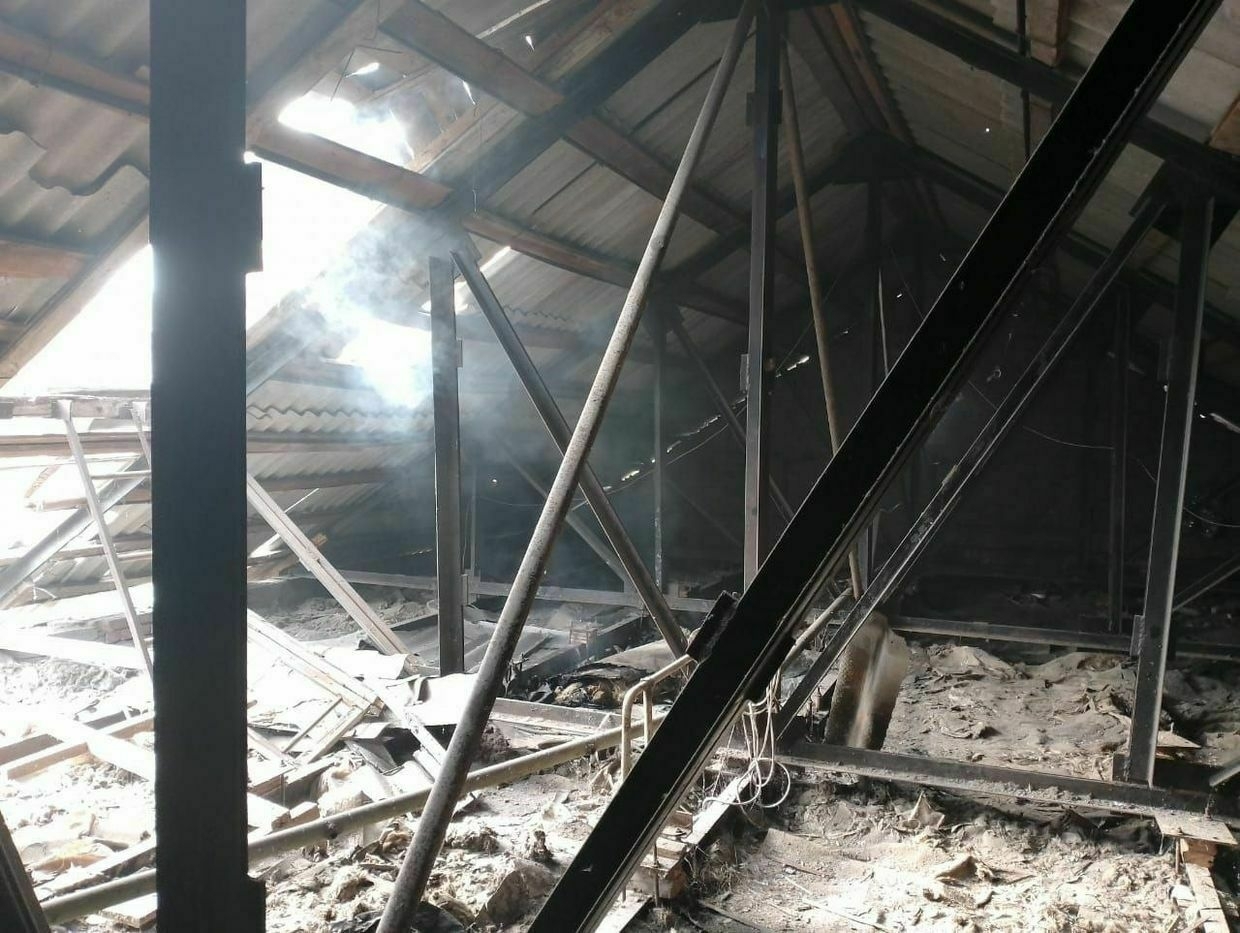
Russian drone and artillery strikes injured at least 28 civilians over the past 24 hours in Ukraine, regional officials reported on June 19.
According to Ukraine’s Air Force, Russian forces launched 104 Shahed-type drones and decoy unmanned aerial vehicles (UAVs) overnight from Russian territory and occupied Crimea.
Ukrainian air defenses shot down 40 drones, while 48 disappeared from radars or were intercepted by electronic warfare.
In Kherson Oblast, nine people were injured amid heavy shelling and drone attacks on dozens of settlements, including Kherson city, Governor Oleksandr Prokudin said. Russian forces struck social infrastructure facilities, three apartment buildings, and 10 houses. A gas pipeline, an ambulance base, a fire station, and several vehicles were also damaged.
In Donetsk Oblast, 13 people were wounded in Russian strikes across the region, Governor Vadym Filashkin said.
In Dnipropetrovsk Oblast, five people were injured in morning attacks on the Nikopol district, including an 11-year-old child who was hospitalized alongside three adults, Governor Serhii Lysak reported. One person is in serious condition, while others are in moderate condition or recovering at home.
In Zaporizhzhia Oblast, one person was injured, Governor Ivan Fedorov said. Over the past day, Russian forces carried out 410 strikes on 12 settlements in the oblast, including 10 air strikes and 264 drone attacks. Additional shelling from artillery and multiple launch rocket systems damaged at least 94 houses, vehicles, and infrastructure sites.
‘Do me a favor Vladimir, mediate Russia first’ — Trump roasts Putin over Israel, Iran offer“I said, Vladimir, let’s mediate Russia first. You can worry about this later,” U.S. President Donald Trump said.The Kyiv IndependentTim Zadorozhnyy
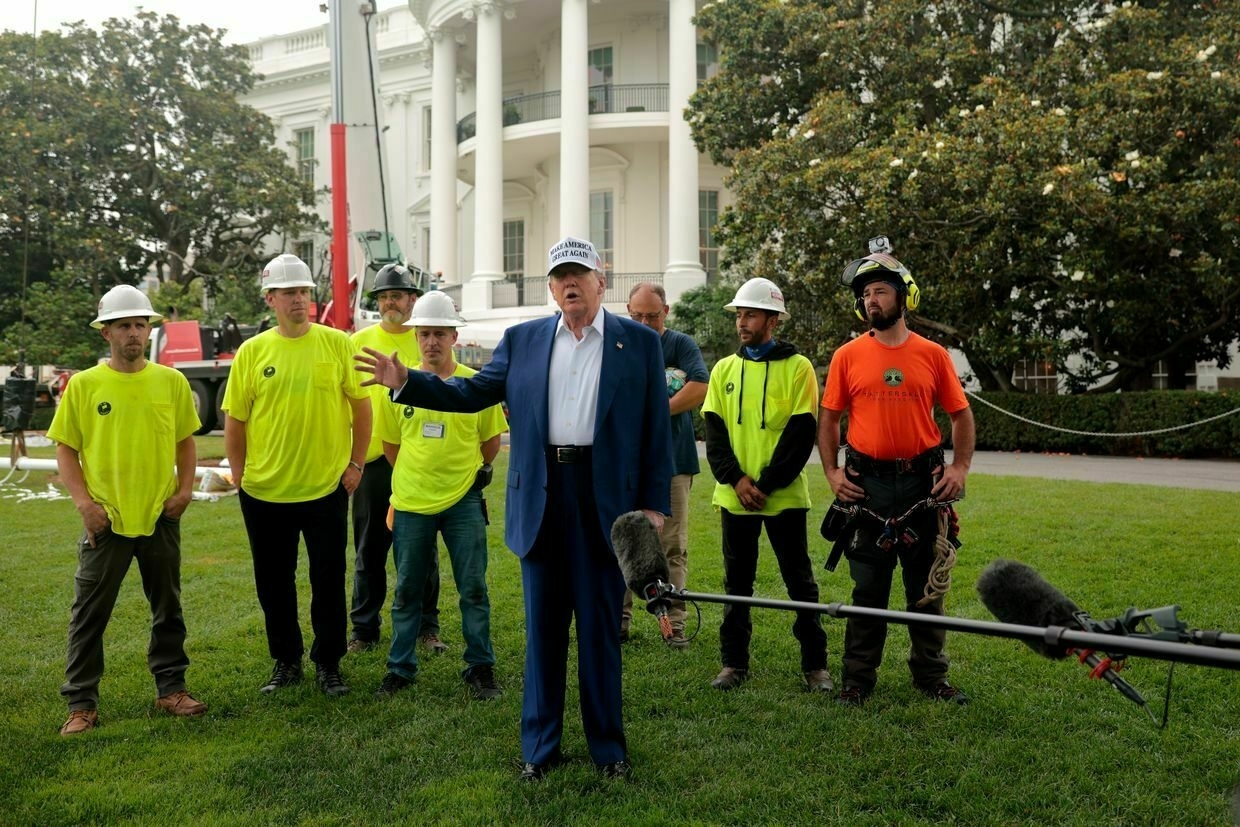
-
Putin says he's ready to meet Zelensky if West 'stops pushing' Ukraine to fight
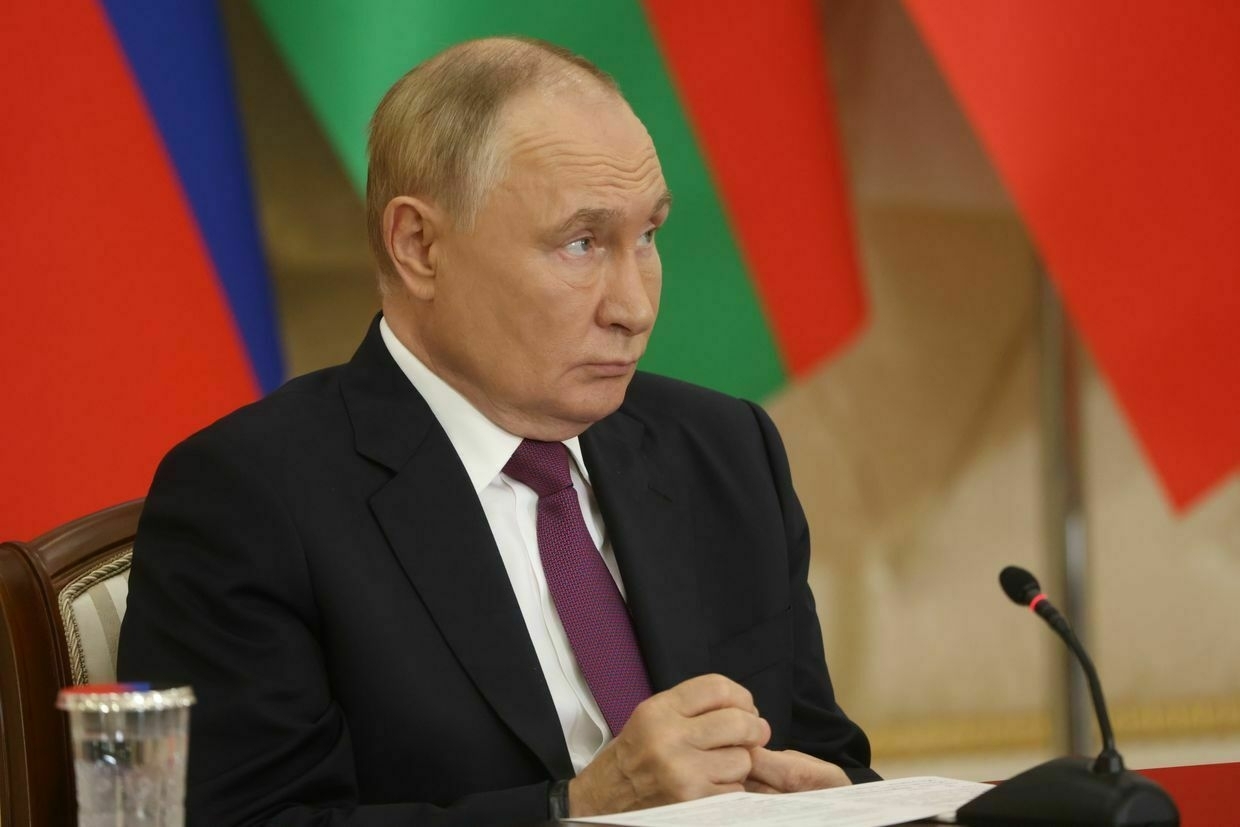
Editor’s note: This is a developing story and is being updated.
Russia wants to end the war in Ukraine “as soon as possible,” preferably through peaceful means, and is ready to continue negotiations — provided that Kyiv and its Western allies are willing to engage, President Vladimir Putin said.
Speaking during a roundtable with top editors of major international news agencies late on June 18, Putin added that he is ready to meet with President Volodymyr Zelensky and “Russia does not care who represents Ukraine in negotiations, but insists that any final agreement must bear the signature of legitimate authorities.”
The Kremlin has long sought to portray Zelensky as “illegitimate” in an attempt to discredit Kyiv. Kremlin spokesperson Dmitry Peskov said on Feb. 18 that Putin, who has ruled Russia for over 20 years, is ready for talks with Zelensky, but “legal aspects related to his legitimacy” must be considered.
Ukraine’s allies had generally ignored this propaganda narrative until U.S. President Donald Trump appeared to echo the Kremlin’s lines claiming that Zelensky was a “modestly successful comedian” turned “dictator” who “refused to have elections."
Ukraine has not held elections during Russia’s full-scale invasion because they are legally prohibited under martial law, which was declared on Feb. 24, 2022, just hours after the war began. Ukrainian law also mandates that elections must be safe, equal, and uninterrupted—conditions that are impossible to meet amid ongoing Russian attacks on civilians and critical infrastructure.
Elections in Ukraine — a guide for beginners (and US Presidents)U.S. President Donald Trump on Feb. 19 launched an astonishing attack on President Volodymyr Zelensky, calling him a “dictator” with a “very low” approval rating that refuses to hold elections in Ukraine. The comments came a day after similar remarks made at the White House, in which Trump falselyThe Kyiv IndependentKateryna Denisova
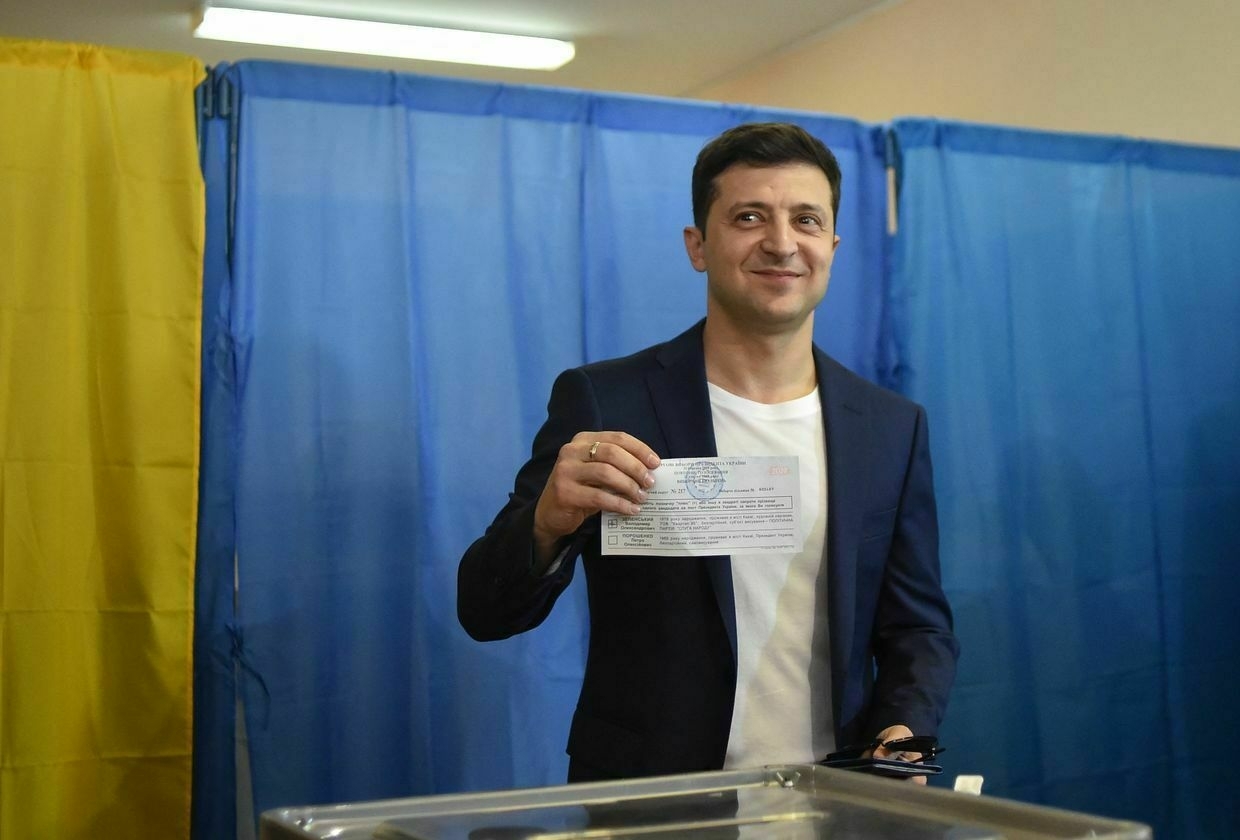
Asked if he would be willing to speak with Germany’s Chancellor Friedrich Merz, Putin said that “if the Federal Chancellor wants to call and talk, I have already said this many times — we do not refuse any contacts."
“And we are always open to this… They stopped, let them resume. We are open to them,” Putin said, adding that he, however, questions Germany’s role as a mediator in the Russia-Ukraine war: “I do doubt if Germany can contribute more than the United States as a mediator in our negotiations with Ukraine. A mediator must be neutral. And when we see German tanks and Leopard battle tanks on the battlefield… and now the Federal Republic is considering supplying Taurus missiles for attacks on Russian territory… — here, of course, big questions arise.”
-
Senate reportedly delays Russia sanctions as Middle East crisis, Trump’s tax bill take priority
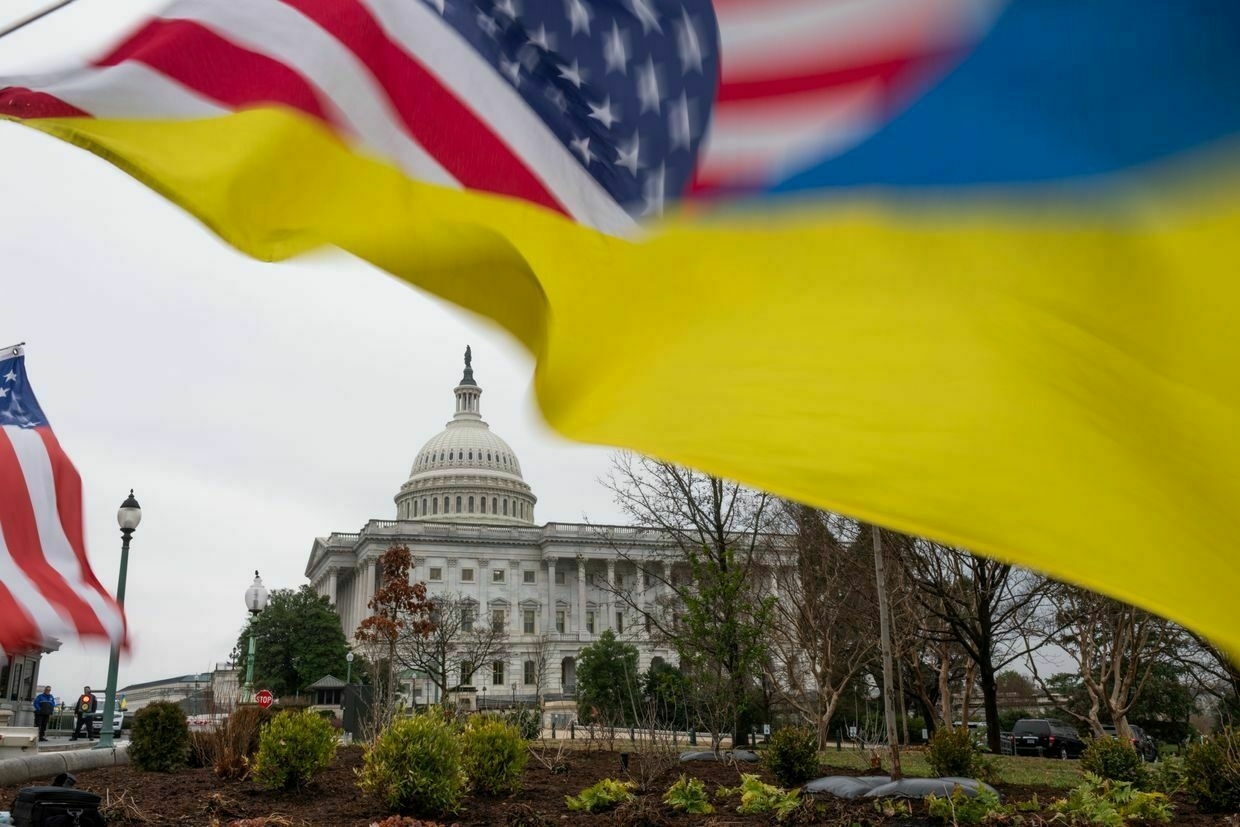
The U.S. Senate is postponing action on a bipartisan Russia sanctions bill until at least July, as other legislative and foreign policy priorities dominate the agenda, Semafor reported on June 18.
Senators Lindsey Graham (R-S.C.) and Richard Blumenthal (D-Conn.) have been working on a revised version of their bill that would impose secondary sanctions on Russian trading partners, while shielding Ukraine’s allies from penalties and making technical adjustments. But momentum has stalled as Republicans push President Donald Trump’s sweeping tax and spending bill, and the escalating conflict between Iran and Israel demands urgent attention.
Senate Majority Leader John Thune (R-S.D.) acknowledged on June 18 that a “July timeframe” was now more realistic for the sanctions bill. “We’re very open to moving, we’re trying to work with the administration from a timing standpoint,” Thune said, according to Semafor. Graham added that the Senate is “going to have to wait a bit,” citing shifting global developments. “Things are changing now with Iran… that doesn’t mean I’ve forgotten about Russia or Ukraine. Not at all. Iran is center stage, but sooner rather than later,” he said.
Trump has not yet signaled support for the legislation, which remains a critical obstacle.
While sanctions enjoy broader Republican backing than direct military aid to Ukraine, GOP lawmakers are hesitant to move forward without Trump’s approval. The U.S. president left the G7 summit in Canada early, skipping a planned meeting with President Volodymyr Zelensky, as attention shifted to a potential U.S. response to Iran’s nuclear ambitions. “All the focus is on Israel and Iran right now,” said Sen. Tommy Tuberville (R-Ala.), though he noted that he is “all for putting sanctions” on Russia.
Graham and Blumenthal had hoped to secure passage of the bill ahead of the G7 summit after visiting Ukraine earlier this year. Blumenthal said he and Graham were “making tremendous progress” with the administration, but acknowledged that other priorities were pushing the legislation off the floor.
Supporters of the sanctions argue the bill would give Trump more leverage in negotiations with Russian President Vladimir Putin. “We want to strengthen our hand in the negotiation,” said Sen. John Hoeven (R-N.D.). “We want to help effectuate an outcome in Ukraine, so we’re trying to use it in a way that actually helps get something done.” The legislation would authorize secondary sanctions on countries that continue to purchase Russian energy or conduct other major trade with Moscow.
Despite uncertainty around timing, both Graham and Blumenthal continue to refine the bill to ensure broader support, including a carveout for Ukraine’s allies and changes to accommodate the global banking system. “There is no evidence that Putin is going to slow down,” Graham told Semafor. “We need to change the approach. I think the sanctions will give the president leverage.”
‘Do me a favor Vladimir, mediate Russia first’ — Trump roasts Putin over Israel, Iran offer“I said, Vladimir, let’s mediate Russia first. You can worry about this later,” U.S. President Donald Trump said.The Kyiv IndependentTim Zadorozhnyy
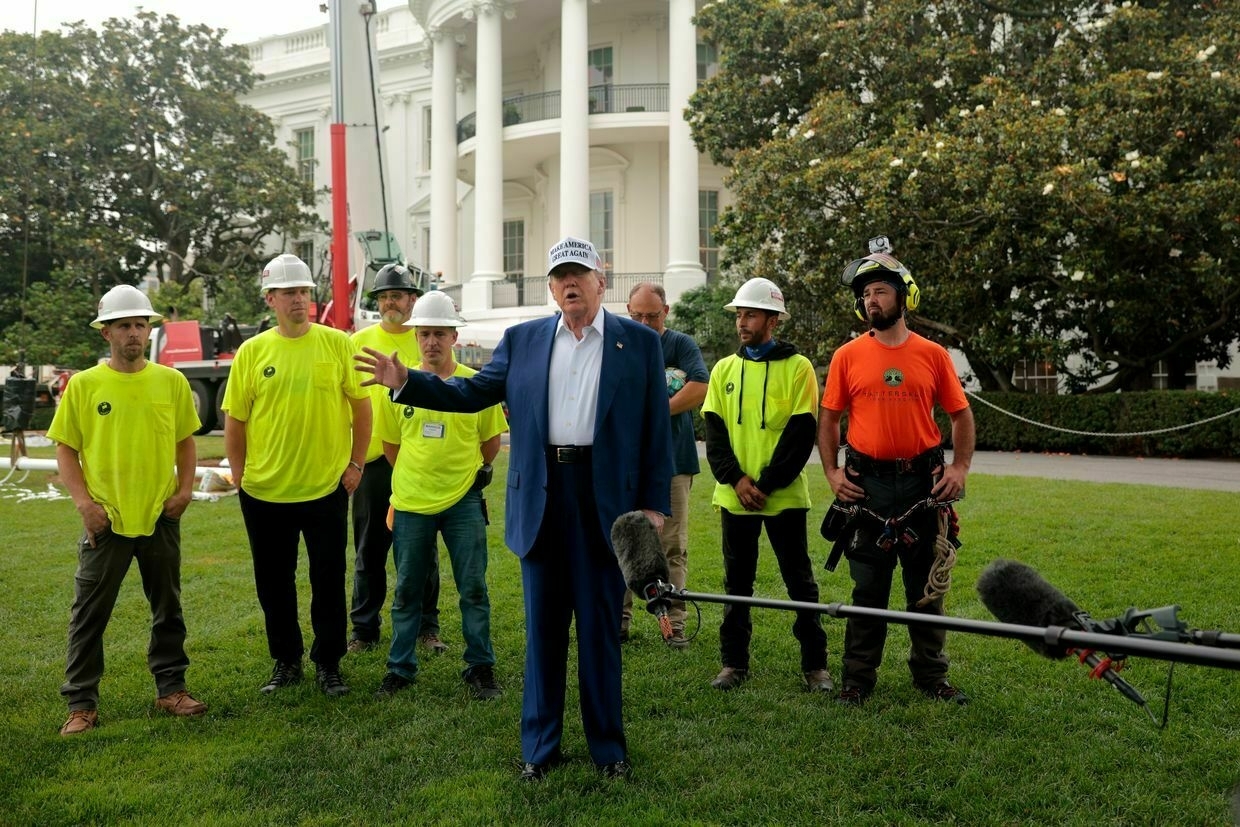
-
Ukraine war latest: 'Do me a favor Vladimir, mediate Russia first' — Trump roasts Putin over Israel, Iran offer
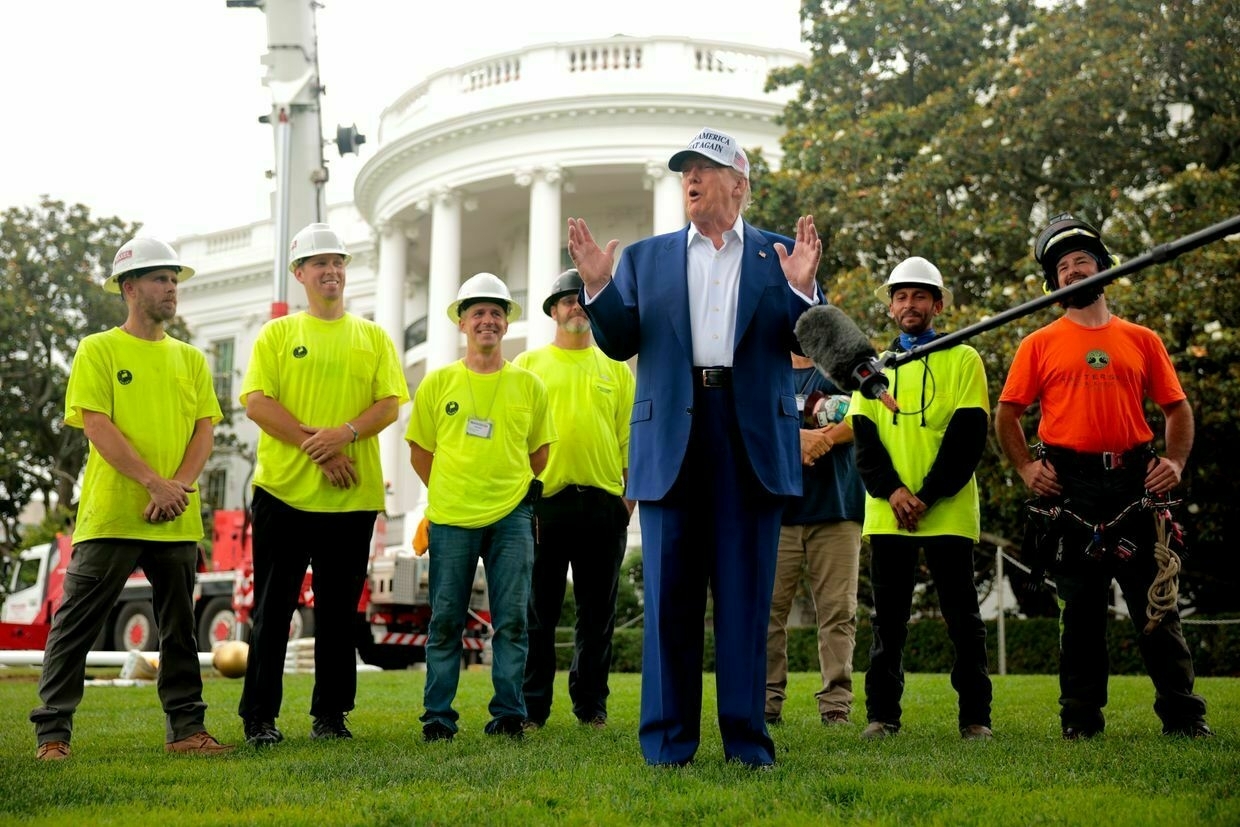
Key developments on June 18:
- ‘Do me a favor Vladimir, mediate Russia first’ — Trump roasts Putin over Israel, Iran offer
- Ukraine kills collaborator tied to POW torture in occupied Berdiansk, intelligence source claims
- Zelensky may reportedly skip NATO summit over uncertainty about Trump’s attendance
- Ukraine dismisses Russia’s ‘absurd’ ceasefire condition for dismantling Western arms
- Kellogg to meet Lukashenko in highest-ranking US visit to Belarus in years, Reuters reports
U.S. President Donald Trump said on June 18 that he had turned down Russian President Vladimir Putin’s offer to mediate the escalating conflict between Israel and Iran.
“I spoke to him yesterday, and, you know, he actually offered to help mediate. I said, do me a favor. Mediate your own,” Trump told reporters. “Let’s mediate Russia first, okay? I said, Vladimir, let’s mediate Russia first. You can worry about this later."
Shortly after Trump’s statement, Kremlin spokesperson Dmitry Peskov said the U.S. president was speaking “figuratively” when referring to a conversation with Putin, according to the Russian state news agency TASS.
“Life is so eventful these days that a retrospective covering several days is like looking back at yesterday,” Peskov added, implying there had been no such conversation on June 17.
Trump’s comments come just days after he had said he was “open” to the idea of Putin serving as a mediator between Israel and Iran, sparking criticism from U.S. allies. On June 15, Trump claimed Putin was “ready” and had discussed the possibility at length in a recent phone call.
Putin, whose country has been deepening military cooperation with Tehran, spoke separately with Israeli Prime Minister Benjamin Netanyahu and Iranian President Masoud Pezeshkian on June 13. He condemned Israel’s air strikes on Iran and offered Russian mediation.
Those strikes, described by Israel as “preemptive,” involved 200 warplanes and 330 munitions targeting Iranian nuclear and military sites. Iran responded with missile attacks on Israeli cities, including Tel Aviv, that killed at least five Ukrainian citizens on June 14.
Trump says Putin offered to mediate in the war between Israel and Iran.
— Brian Lilley (@brianlilley) June 18, 2025
Trump: “Do me a favor. Mediate your own. Let’s mediate Russia first. I said, Vladimir, let’s mediate Russia first. You can worry about this later.”
pic.twitter.com/2JOL6noPX3Putin's offer of mediation has been dismissed by several Western leaders.
French President Emmanuel Macron said Russia "cannot be a mediator," given its war against Ukraine. EU foreign policy chief Kaja Kallas echoed that sentiment, saying on June 17 that Putin "cannot be trusted to mediate peace" while continuing to wage war on Ukrainian civilians.
Kremlin spokesperson Dmitry Peskov said on June 17 that Israel appeared unwilling to accept Moscow's mediation. Israel has not publicly commented on the offer.
Ukraine, which has been targeted by thousands of Iranian-made Shahed drones and missiles supplied to Russia, warned that Tehran is a "source of problems" both regionally and globally.
Despite Trump's latest rebuke of Putin's mediation ambitions, the U.S. president has continued to avoid placing additional sanctions on Moscow, even as the Kremlin refuses to agree to a ceasefire in its war against Ukraine.
For the first time, Australia sanctions Russian shadow fleet oil tankers“Russia uses these vessels to circumvent international sanctions and sustain its illegal and immoral war against Ukraine,” Australia’s Foreign Ministry said in a statement.The Kyiv IndependentAnna Fratsyvir
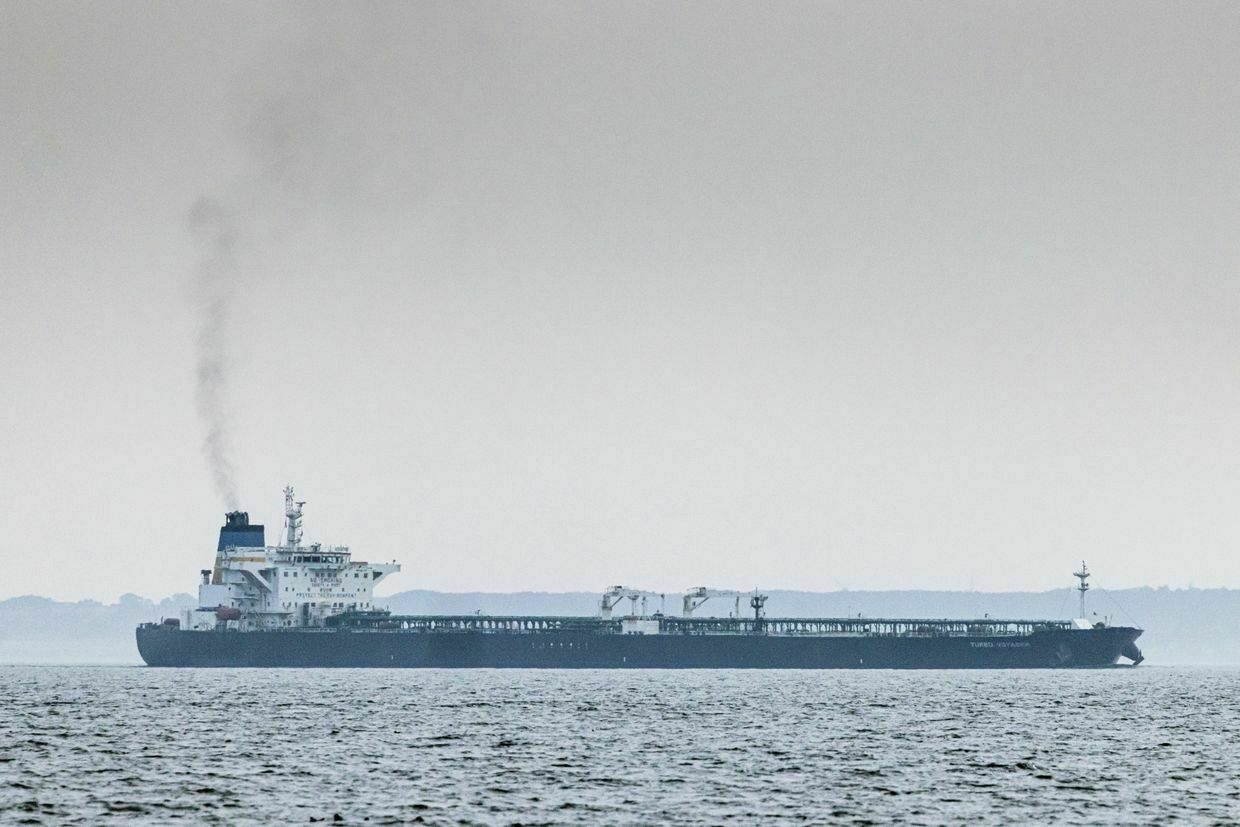
Ukraine kills collaborator tied to POW torture in occupied Berdiansk, intelligence source claimsDuring a targeted operation, Ukraine's military intelligence (HUR) killed Mykhailo Hrytsai, a senior collaborator with Russian occupation authorities in Berdiansk, Zaporizhzhia Oblast, a HUR source told the Kyiv Independent on June 18.
According to the source, Hrytsai was directly involved in organizing repressions against the local Ukrainian population and establishing torture chambers for prisoners of war.
The collaborator was shot dead in the city using a silenced PM pistol, the source said.
Hrytsai served as the Russian-installed deputy mayor responsible for infrastructure, housing, utilities, and the energy sector. The source also said he facilitated the illegal seizure of municipal and state property in Berdiansk.
"There are still plenty of such targets — collaborators, accomplices of the enemy — in the occupied territories of Ukraine," the source said.
"We will definitely get to each and every one of them and put an end to their criminal activities by any means necessary: with or without a silencer, quietly or loudly, but always effectively."
A native of Poltava Oblast, Hrytsai had previously participated in Ukrainian political life. He was an assistant to a member of parliament and headed the Berdiansk branch of the Socialist Ukraine party before siding with Russian occupation forces.
Berdiansk, a port city on the Azov Sea, has been under Russian control since the early days of the full-scale invasion in 2022. It remains a critical logistics hub for Russian forces, facilitating the transport of looted Ukrainian grain and other resources.
On Feb. 20, another targeted strike in Berdiansk killed Yevgeny Bogdanov, the deputy head of the Russian-installed administration, according to Ukrainian military intelligence.
‘Beyond cynical’ – Russian doctor carved ‘Glory to Russia’ scar on POW during operation, Ukraine saysAfter more than three years of Russia’s full-scale invasion, each new revelation of cruel treatment of Ukrainians in Russian captivity hardly surprises anyone. But when a photo recently emerged online, showing a “Glory to Russia” scar on the body of a Ukrainian prisoner of war (POW), it sent shockwavesThe Kyiv IndependentDaria Shulzhenko

Zelensky may reportedly skip NATO summit over uncertainty about Trump's attendancePresident Volodymyr Zelensky may reconsider attending the NATO summit in The Hague, as questions remain over U.S. President Donald Trump's participation, the Guardian reported on June 17, citing unnamed Ukrainian officials.
According to the Guardian, some in Kyiv are unsure if Zelensky's presence at the June 24-25 summit would be worthwhile without a confirmed meeting with Trump, whom they had hoped to engage directly in efforts to pressure Russian President Vladimir Putin into accepting a ceasefire.
Earlier, Zelensky had traveled to the G7 summit in Canada, hoping to meet one-on-one with Trump and push for stronger sanctions against Russia. Trump left the summit early, citing the crisis in the Middle East, and no bilateral meeting or joint G7 statement took place.
One official told the Guardian that Ukraine is in a "permanent hazard" of becoming a victim of "Trump's short attention span," adding that Russia has exploited this uncertainty by fresh aerial attacks. The source added that there had been "all sorts of promises for this summit," including U.S. arms.
The Russian attack on Ukraine that occurred during the G7 summit killed at least 24 civilians and injured 134 in Kyiv. Trump has not responded to the attack as of the day after.
German Chancellor Friedrich Merz has reportedly said Trump had previously promised to attend the NATO gathering, though no official confirmation has been issued from Washington.
Despite the setback, Zelensky said the G7 meeting had concrete results for Ukraine. In a Telegram post on June 17, he thanked partners for increased military aid, new sanctions on Russia, and the decision to allocate frozen Russian assets for Ukraine’s reconstruction.
"It is important that our partners are ready not only to support our defense now, but also to rebuild Ukraine together after the war ends," he said.
Canadian Prime Minister Mark Carney announced a support package that includes 2 billion Canadian dollars ($1.5 billion) in military assistance and another $1.6 billion in reconstruction loans. The aid includes drones, armored vehicles, ammunition, and sanctions to disrupt Russia's energy revenues.
U.K. Prime Minister Keir Starmer also unveiled new sanctions targeting Russia's military-industrial complex and 20 oil tankers from Russia's "shadow fleet."
Zelensky later told G7 leaders that "diplomacy is now in a state of crisis" and called on allies to press Trump to "use his real influence" to help end the war.
Ukraine has been invited to the NATO summit, and Zelensky previously called the invitation "important" during a June 2 press briefing. At the time, he did not confirm whether he would attend in person.
Ukraine won’t receive NATO invitation at The Hague summit, Lithuanian FM says“This issue is certainly not on the NATO agenda and nobody has formulated an expectation that there will be an invitation in The Hague, nor have we heard that from the Ukrainians themselves,” Lithuanian Foreign Minister Kestutis Budrys said in comments quoted by the LRT broadcaster.The Kyiv IndependentMartin Fornusek
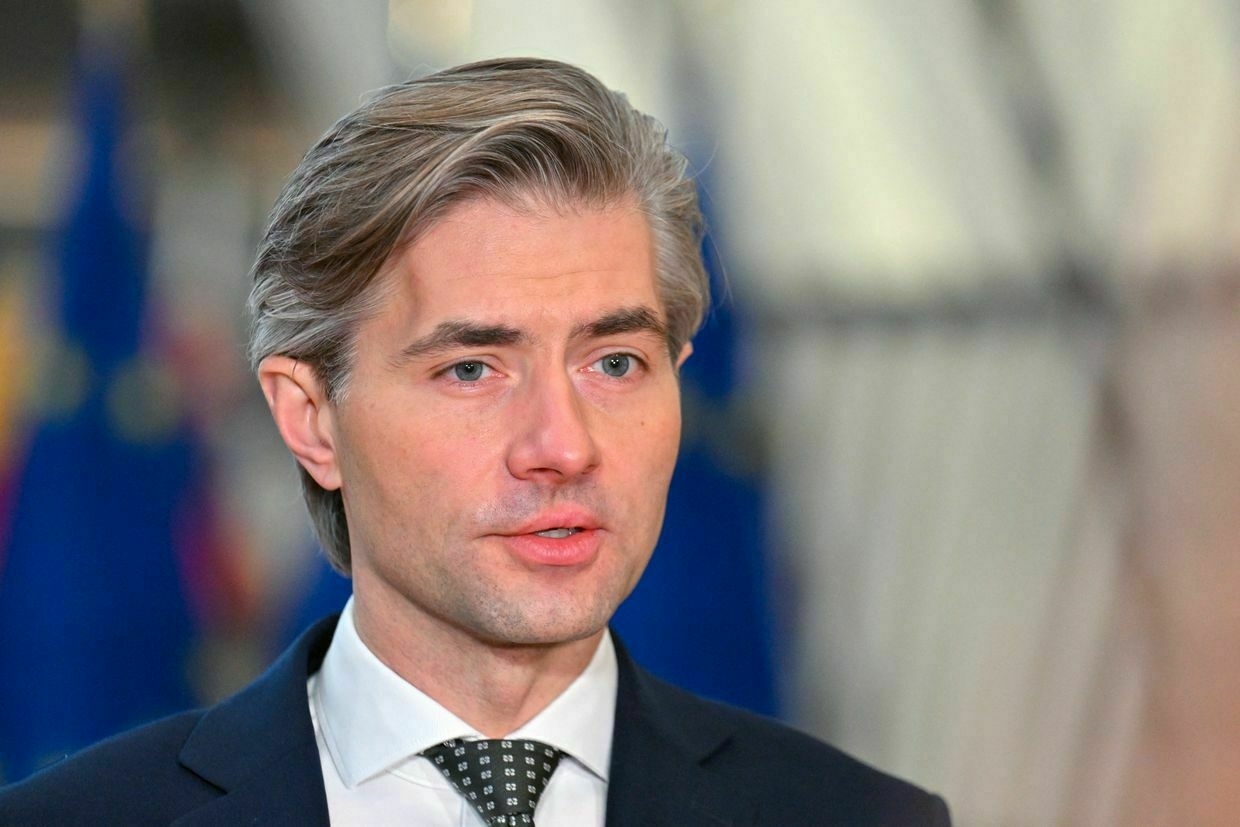
Ukraine dismisses Russia's 'absurd' ceasefire condition for dismantling Western armsUkraine's Foreign Ministry on June 18 brushed off Moscow's demands for Kyiv to destroy or dismantle Western-supplied weapons as a condition for a ceasefire, saying it shows disregard for U.S. peace efforts.
"Russian officials make new absurd demands almost every day. Total inadequacy," Ukrainian Foreign Ministry spokesperson Heorhii Tykhyi said on X.
"Moscow shows complete disregard for the United States' efforts to end the war."
Russian Deputy Foreign Minister Alexander Grushko raised the demand in an interview with the state-run newspaper Izvestia earlier this week.
"All these surpluses must be destroyed. All international algorithms are known. They must be reduced, disposed of, and guaranteed," Grushko said.
The Kremlin has previously demanded a complete halt on Western military aid to Ukraine as a key condition for a truce. Kyiv and its European partners have rejected this, instead urging increased military assistance to the war-torn country.
The demand reflects Moscow's growing list of maximalist conditions presented in its so-called "peace memorandum" during negotiations with Ukraine in Istanbul on June 2.
While the recent peace talks ended with an agreement on major prisoner exchanges and repatriation of fallen soldiers, they have failed to achieve a breakthrough in the peace talks.
U.S. President Donald Trump, who initially pledged to broker peace in Ukraine within 24 hours of taking office, has become increasingly disengaged in the effort. He has also been reluctant to apply pressure on Moscow to push it to a ceasefire deal despite repeatedly threatening additional sanctions.
‘He said he wasn’t going anywhere’ — Survivors search for missing following Russia’s deadliest attack on Kyiv this yearSitting a few meters from the rubble of what used to be a nondescript nine-story residential building in Kyiv, Lilia rises to her feet every time another pile of debris is cleared from the site targeted by Russia during a mass overnight attack on June 17. “We are waiting (asThe Kyiv IndependentKateryna Denisova
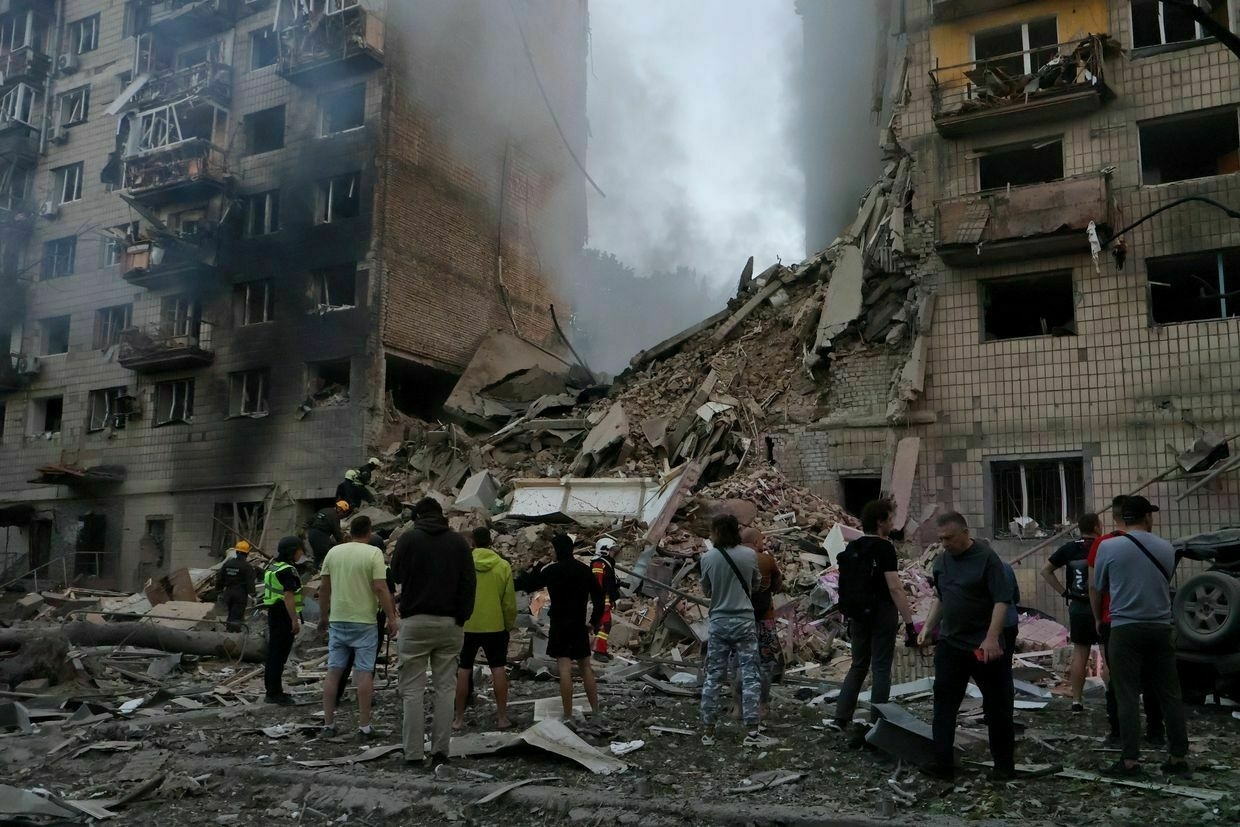
Kellogg to meet Lukashenko in highest-ranking US visit to Belarus in years, Reuters reportsU.S. Special Envoy for Ukraine Keith Kellogg will meet Belarusian President Alexander Lukashenko in the coming days, Reuters reported on June 17, citing four sources familiar with the matter.
Kellogg will meet Lukashenko in a visit to Belarus as peace talks to bring an end to Russia's war against Ukraine remain inconclusive, Reuters reported.
In February, U.S. Deputy Assistant State Secretary Christopher W. Smith visited Belarus alongside two other U.S. officials to conduct a prisoner swap in a similar unannounced visit.
Lukashenko has been in power since 1994 and has been accused of staging fraudulent elections in Belarus. The leader declared a seventh consecutive presidential election victory in January.
Kellogg has given the impression that the meeting could help reinitiate largely unsuccessful peace talks between Ukraine and Russia, two sources told Reuters.
Lukashenko is seen as a key ally of Russian President Vladimir Putin as Russia faces isolation in response to its full-scale war against Ukraine.
The White House has discussed ways to weaken Russia's influence on Minsk and bring Belarus closer to the United States, one of the sources said.
On Feb. 12, Smith drove to Belarus from Lithuania following a phone call with Lukashenko. The small U.S. delegation visited a border town where three political prisoners were transferred, including one U.S. citizen and two Belarusian citizens, the New York Times reported.
Lukashenko assured he was ready to decrease repression in Belarus, Smith said, adding that the U.S. wants Belarus to be less reliant on Russia.
Belarus has faced Western sanctions following a presidential election in 2020 that international observers condemned as fraudulent. The sham election garnered mass protests that rejected the results.
Minsk refused to invite a mission from the Organization for Security and Cooperation in Europe (OSCE) to observe the country's Jan. 26 presidential election.
Belarus further isolated itself from the West as it supports Russia in its ongoing war against Ukraine.
Note from the author:
Ukraine War Latest is put together by the Kyiv Independent news desk team, who keep you informed 24 hours a day, seven days a week. If you value our work and want to ensure we have the resources to continue, join the Kyiv Independent community.
-
After speaking out against Trump, former US Ambassador to Ukraine Bridget Brink launches congressional bid
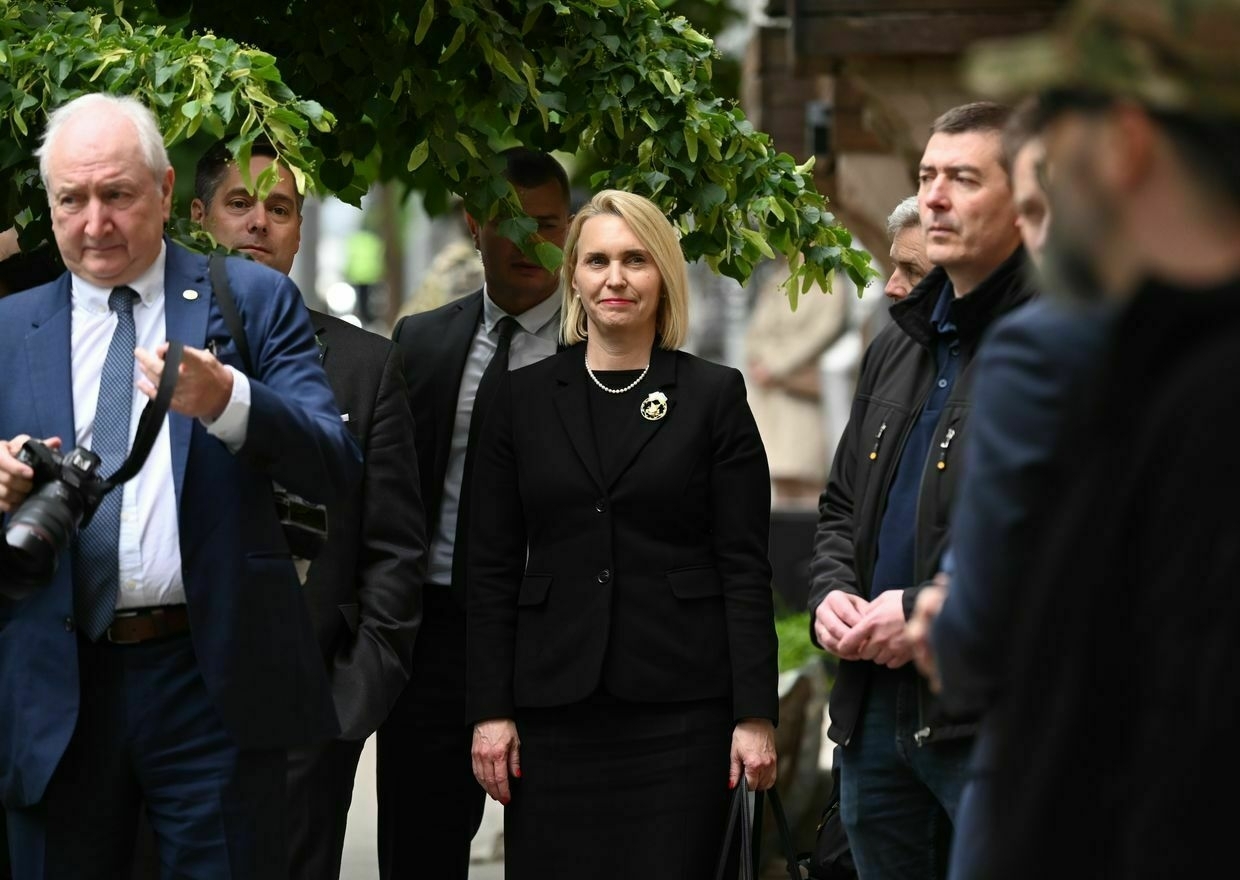
Former U.S. Ambassador to Ukraine Bridget Brink announced on June 18 that she is running for Congress from Michigan’s 7th district, pledging to oppose U.S. President Donald Trump.
“I’ve dedicated my life to protecting democracy and fighting for freedom. It’s why we stood up to (Russian President Vladimir) Putin and why I spoke out against Trump,” Brink wrote on X.
“My next mission: fighting for what’s right here at home."
Brink resigned from her post on April 10, and in a May 16 op-ed in the Detroit Free Press, publicly confirmed her departure was driven by disagreement with the Trump administration’s stance on Russia’s full-scale war against Ukraine.
“I just came home to Michigan from three years in the toughest job of my life,” she wrote. “I could no longer in good faith carry out the administration’s policy and felt it was my duty to step down."
Brink accused the Trump administration of pressuring Ukraine rather than holding Russia accountable, calling that approach “dangerous and immoral."
“I cannot stand by while a country is invaded, a democracy bombarded, and children killed with impunity,” she wrote. “Peace at any price is not peace at all — it is appeasement."
Elections for the representative of Michigan’s 7th district will take place in November 2026.
Trump, who began his second term in January, pledged to end the war within 100 days. That deadline has passed with no deal. He has alternated between blaming both sides for the conflict and claiming a breakthrough is still possible.
Despite repeatedly expressing frustration with Putin, the U.S. president has continued to avoid placing additional sanctions on Moscow, even as the Kremlin refuses to agree to a ceasefire.
Brink's relationship with Ukraine's leadership frayed in April after the U.S. Embassy issued what was seen as a muted response to a deadly Russian missile strike on Kryvyi Rih that killed 20 civilians.
"Horrified that tonight a ballistic missile struck near a playground and restaurant in Kryvyi Rih," Brink posted on X following a Russian missile attack. "This is why the war must end."
President Volodymyr Zelensky criticized the message.
"Unfortunately, the response from the U.S. Embassy is surprisingly disappointing — such a strong country, such a strong people, and yet such a weak reaction," he wrote on April 5.
Julie S. Davis, the new U.S. Charge d'Affaires to Ukraine, arrived in Kyiv on May 5.
Zelensky may reportedly skip NATO summit over uncertainty about Trump’s attendanceAccording to the Guardian, some in Kyiv are unsure if President Volodymyr Zelensky’s presence at the summit would be worthwhile without a confirmed meeting with U.S. President Donald Trump.The Kyiv IndependentAnna Fratsyvir
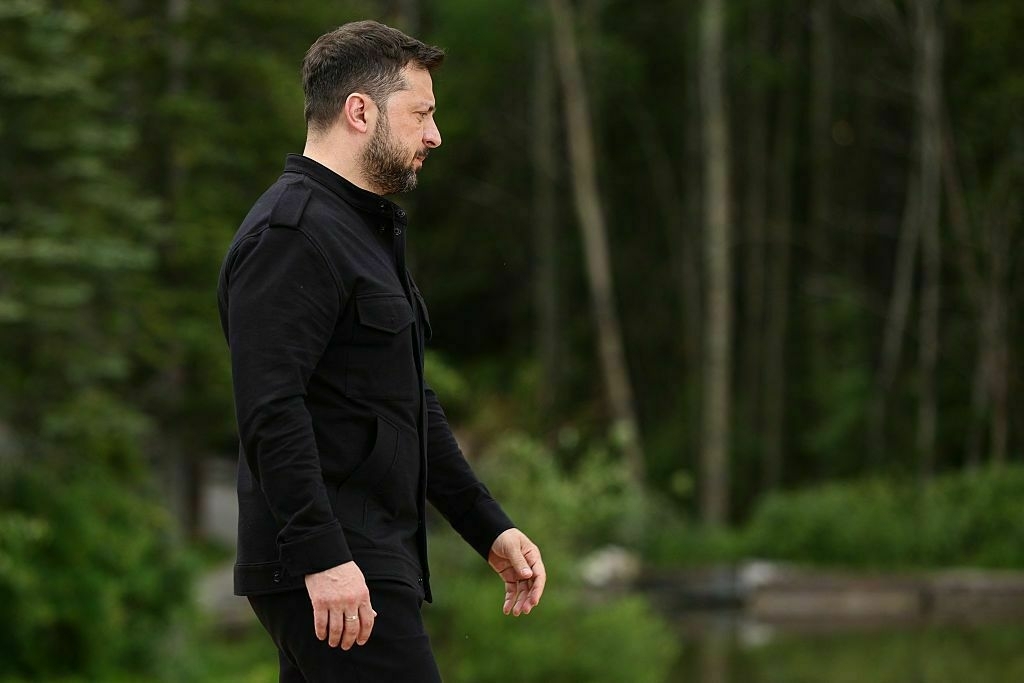
-
'Do me a favor Vladimir, mediate Russia first' — Trump roasts Putin over Israel, Iran offer
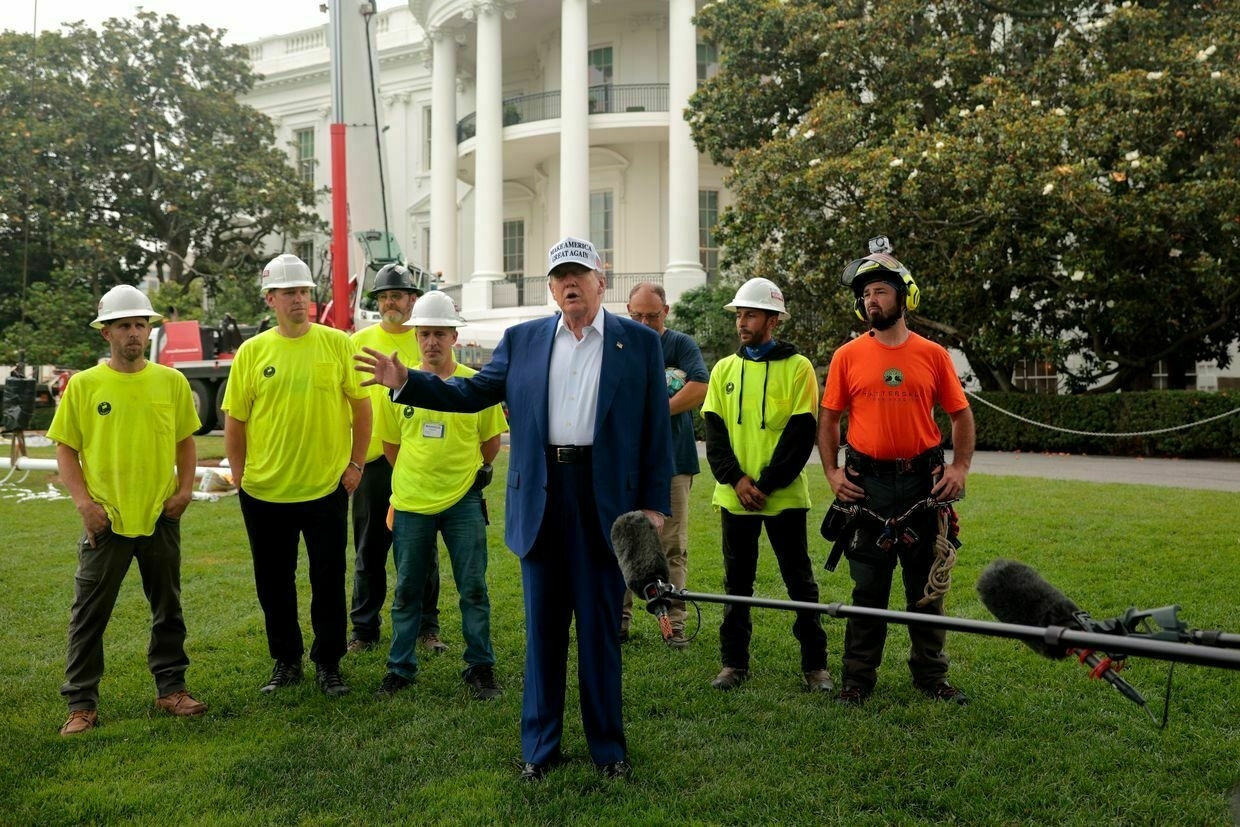
U.S. President Donald Trump said on June 18 that he had turned down Russian President Vladimir Putin’s offer to mediate the escalating conflict between Israel and Iran.
“I spoke to him yesterday, and, you know, he actually offered to help mediate. I said, do me a favor. Mediate your own,” Trump told reporters. “Let’s mediate Russia first, okay? I said, Vladimir, let’s mediate Russia first. You can worry about this later."
Trump’s comments come just days after he had said he was “open” to the idea of Putin serving as a mediator between Israel and Iran, sparking criticism from U.S. allies. On June 15, Trump claimed Putin was “ready” and had discussed the possibility at length in a recent phone call.
Putin, whose country has been deepening military cooperation with Tehran, spoke separately with Israeli Prime Minister Benjamin Netanyahu and Iranian President Masoud Pezeshkian on June 13. He condemned Israel’s air strikes on Iran and offered Russian mediation.
Those strikes, described by Israel as “preemptive,” involved 200 warplanes and 330 munitions targeting Iranian nuclear and military sites. Iran responded with missile attacks on Israeli cities, including Tel Aviv, that killed at least five Ukrainian citizens on June 14.
Putin’s offer of mediation has been dismissed by several Western leaders.
Trump says Putin offered to mediate in the war between Israel and Iran.
— Brian Lilley (@brianlilley) June 18, 2025
Trump: “Do me a favor. Mediate your own. Let’s mediate Russia first. I said, Vladimir, let’s mediate Russia first. You can worry about this later.”
pic.twitter.com/2JOL6noPX3French President Emmanuel Macron said Russia "cannot be a mediator," given its war against Ukraine. EU foreign policy chief Kaja Kallas echoed that sentiment, saying on June 17 that Putin "cannot be trusted to mediate peace" while continuing to wage war on Ukrainian civilians.
Kremlin spokesperson Dmitry Peskov said on June 17 that Israel appeared unwilling to accept Moscow's mediation. Israel has not publicly commented on the offer.
Ukraine, which has been targeted by thousands of Iranian-made Shahed drones and missiles supplied to Russia, warned that Tehran is a "source of problems" both regionally and globally.
Despite Trump's latest rebuke of Putin's mediation ambitions, the U.S. president has continued to avoid placing additional sanctions on Moscow, even as the Kremlin refuses to agree to a ceasefire in its war against Ukraine.
Zelensky may reportedly skip NATO summit over uncertainty about Trump’s attendanceAccording to the Guardian, some in Kyiv are unsure if President Volodymyr Zelensky’s presence at the summit would be worthwhile without a confirmed meeting with U.S. President Donald Trump.The Kyiv IndependentAnna Fratsyvir
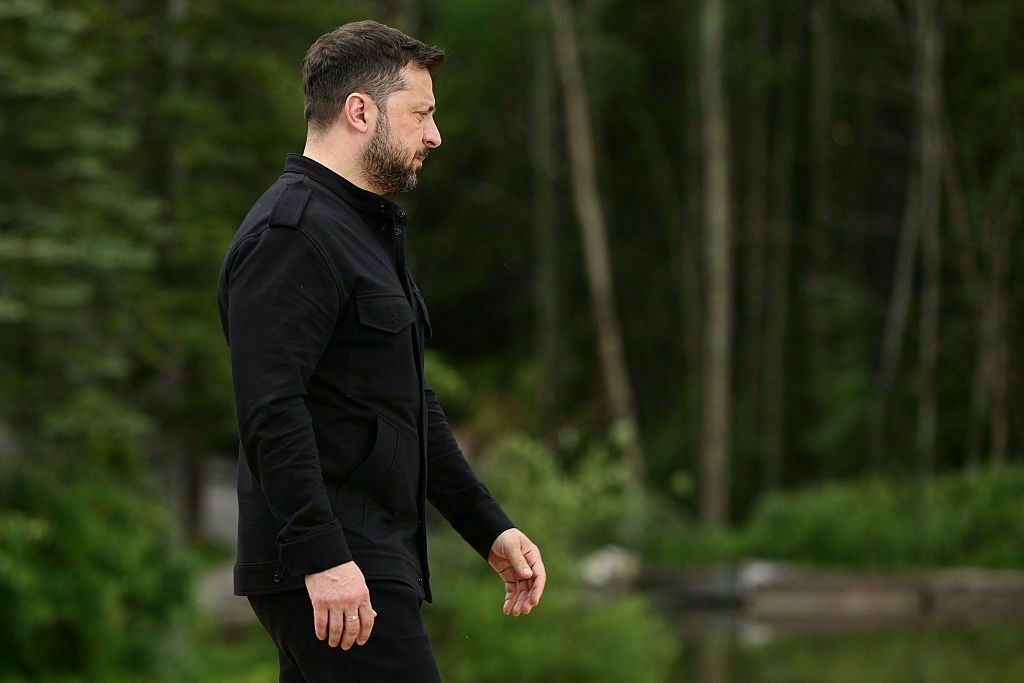
-
All NATO members to hit 2% defense spending in 2025, Rutte says
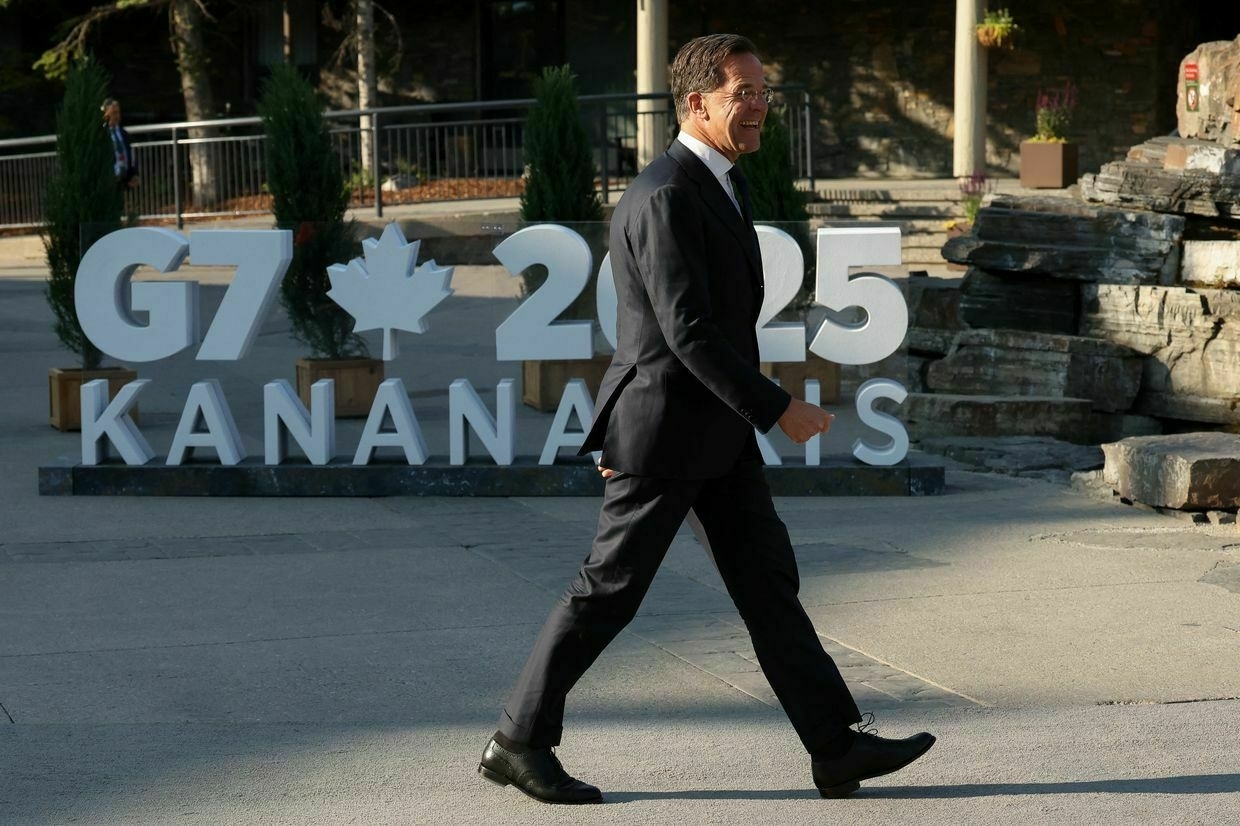
All 32 NATO member states are on track to meet the alliance’s 2% GDP defense spending benchmark in 2025, Secretary General Mark Rutte said on June 17 at the G7 summit in Canada.
The announcement marks a major shift for the alliance, which has faced repeated criticism from U.S. President Donald Trump for failing to meet spending commitments.
The U.S. president has long pushed NATO members to spend more on defense, at one point suggesting the threshold be raised to 5% of GDP.
“This is really great news,” Rutte said, praising announcements from Canada and Portugal, the last two holdouts. “The fact that you decided to bring Canada to the 2% spending when it comes to NATO this year is really fantastic,” he told Canadian Prime Minister Mark Carney.
In 2024, only 23 alliance members met the 2% target, according to NATO estimates. Poland led all members with 4.12% of GDP allocated to defense, followed by Estonia (3.43%) and the U.S. (3.38%).
Rutte’s comments come ahead of the June 24–25 NATO summit in The Hague, which has been reportedly scaled back to a single working session on defense spending and alliance capabilities.
The move, according to Italian outlet ANSA, is designed to avoid friction with Trump, whose presence at the summit remains unconfirmed.
Ukraine has been invited to the summit, but President Volodymyr Zelensky may reconsider his attendance amid uncertainty over the U.S. delegation, the Guardian reported on June 17.
According to the outlet, some in Kyiv are questioning whether Zelensky’s presence at the summit would be worthwhile without a confirmed meeting with Trump.
Many NATO members have cited Russia’s ongoing war against Ukraine and Trump’s isolationist rhetoric as reasons to accelerate defense spending and prepare for potential future threats.
Ukraine won’t receive NATO invitation at The Hague summit, Lithuanian FM says“This issue is certainly not on the NATO agenda and nobody has formulated an expectation that there will be an invitation in The Hague, nor have we heard that from the Ukrainians themselves,” Lithuanian Foreign Minister Kestutis Budrys said in comments quoted by the LRT broadcaster.The Kyiv IndependentMartin Fornusek
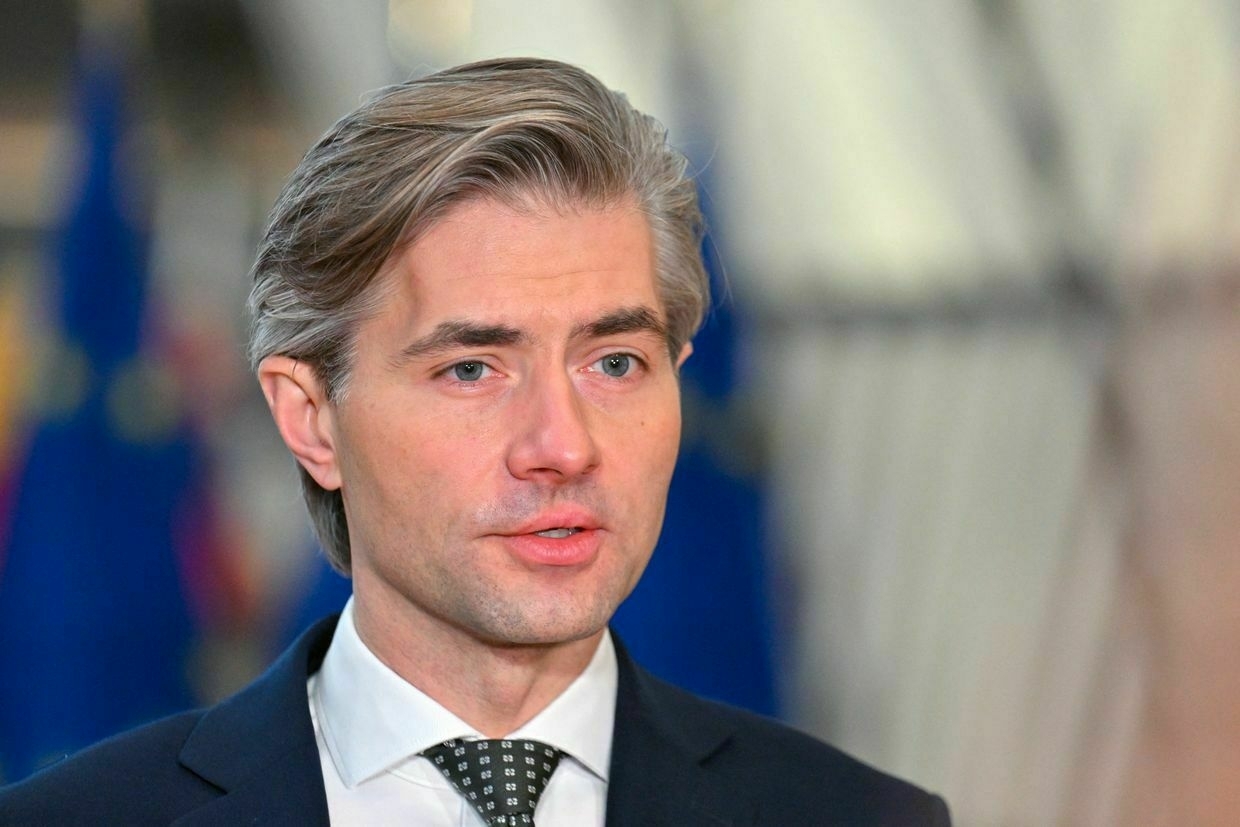
-
Ukraine preparing to evacuate citizens from Israel, Iran as Middle East conflict escalates
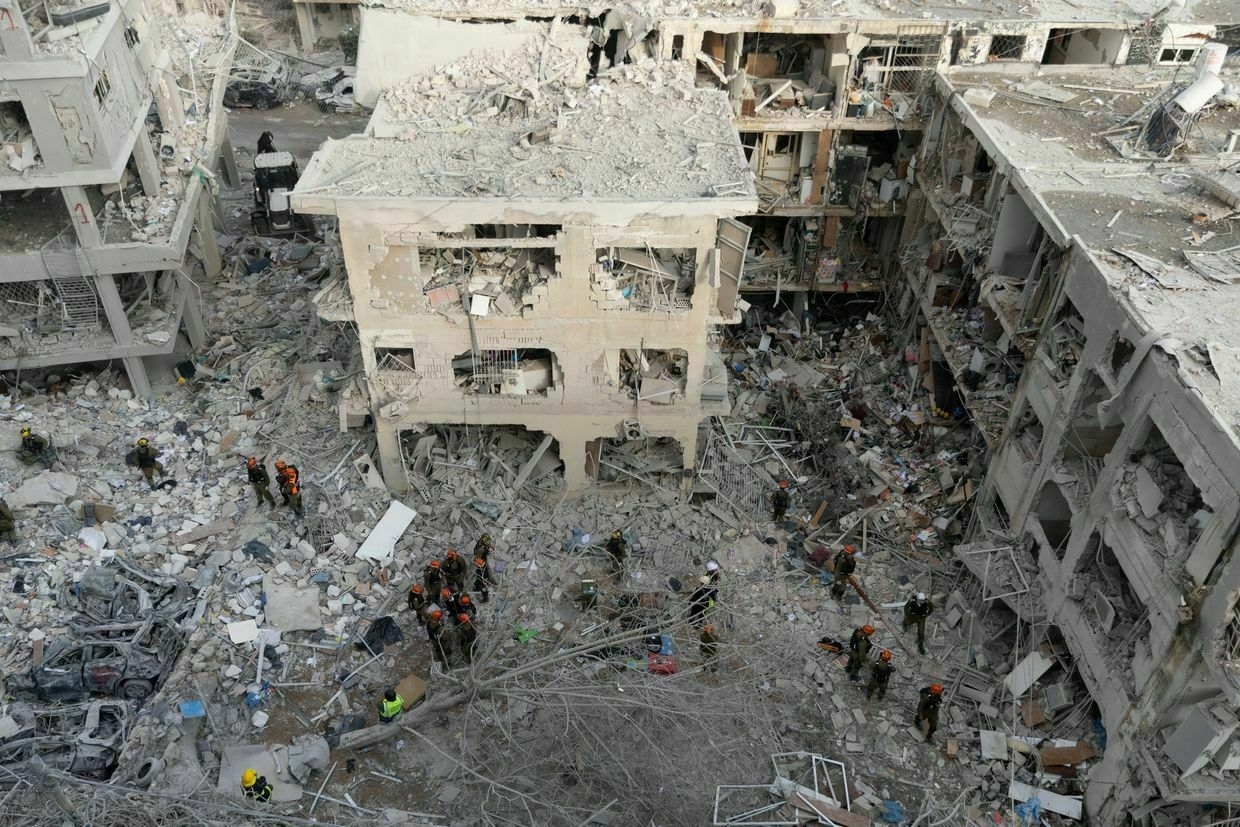
Ukraine is preparing to evacuate its citizens from Israel and Iran as hostilities between the two countries intensify, the Foreign Ministry told Ukrainian media outlet NV on June 18.
The move comes as Israel on June 13 launched widespread air strikes against Iran, targeting nuclear facilities and the country’s military leadership. Iran responded with missile strikes on Tel Aviv and other cities, killing multiple civilians, including five Ukrainian citizens on June 14.
As of the morning of June 18, 293 Ukrainians in Israel and 85 in Iran have requested evacuation, the ministry said. Ten additional foreign nationals with permanent residency in Ukraine have also asked for assistance to evacuate from Iran.
Ukraine’s embassy in Israel has received over 400 calls on its hotline as citizens seek updates on possible evacuation routes. The ministry told NV it is developing evacuation plans, including potential flights organized in cooperation with international partners.
On June 13, Kyiv expressed concern over the security situation in the Middle East, describing Tehran as a “source of problems” in the region and beyond.
Iran is a key supplier of weapons to Russia, including Shahed-type drones and ballistic missiles used in attacks on Ukrainian cities. Israel, which hosts a significant Russian-speaking population, has not joined Western sanctions against Moscow.
Tensions in the region grow as U.S. President Donald Trump is also considering launching U.S. strikes on Iranian nuclear targets, Axios reported on June 17.
On Truth Social, Trump demanded Iran’s “unconditional surrender” and threatened Supreme Leader Ali Khamenei, while boasting about American control of Iranian airspace.
Trump has also floated Russian President Vladimir Putin as a possible mediator in the conflict.
Putin held separate calls with Iranian President Masoud Pezeshkian and Israeli Prime Minister Benjamin Netanyahu on June 13, condemning Israeli strikes and offering to mediate.
Israel has not publicly responded to Russia’s proposal, but Kremlin spokesperson Dmitry Peskov said on June 17 that Tel Aviv appeared unwilling to accept Russian mediation.
Iran’s Health Ministry claimed on June 18 that 585 people had been killed by Israeli strikes, with Tehran alleging that 90% of the casualties are civilians.
The figures have not been independently verified.
4 months after striking Chornobyl, Russia warns Israeli attacks on Iran risk nuclear ‘catastrophe’The warning comes as Moscow accuses Israel of escalating the risk of a nuclear incident in the Middle East, despite Russia’s own record of threatening nuclear facilities during its war in Ukraine, including a February drone strike on the Chornobyl nuclear site that Kyiv and Western experts condemned as nuclear blackmail.The Kyiv IndependentAnna Fratsyvir
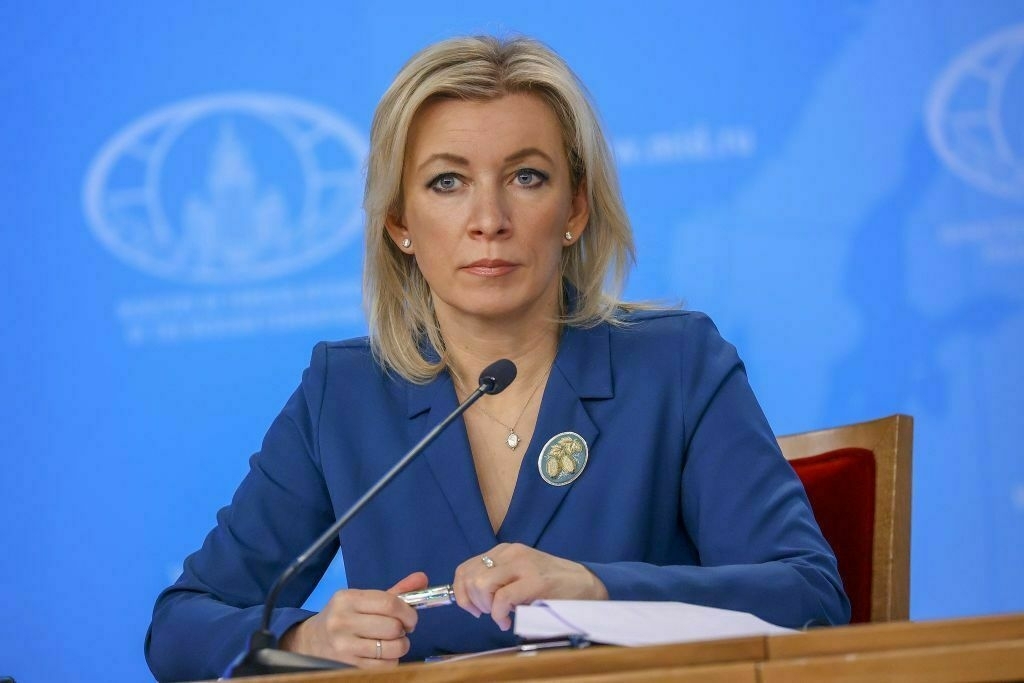
-
4 months after striking Chornobyl, Russia warns Israeli attacks on Iran risk nuclear 'catastrophe'
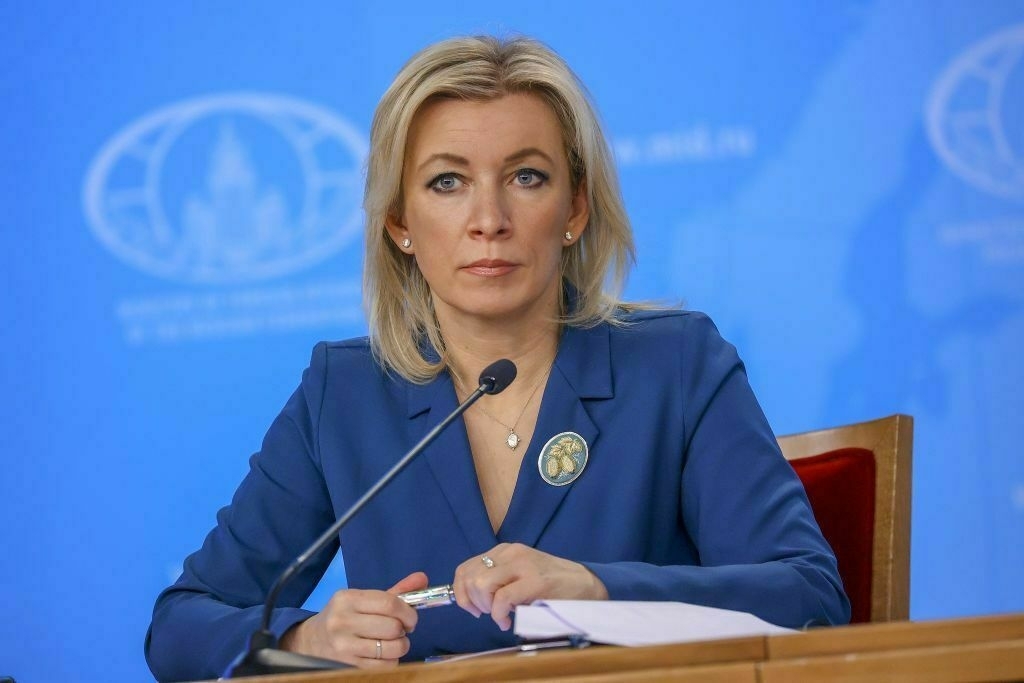
Russia on June 18 warned the world is “millimetres away from catastrophe” due to Israeli strikes on Iran’s nuclear infrastructure, just four months after one of its own drones struck the Chornobyl nuclear site in Ukraine.
Russian Foreign Ministry spokesperson Maria Zakharova accused Israel of escalating the risk of a nuclear incident in the Middle East, despite Russia’s own record of repeatedly both placing nuclear facilities during its full-scale invasion, and threatening the use of nuclear weapons.
On Feb. 14, Russian forces struck the Chornobyl nuclear facility with a Shahed drone, hitting the protective sarcophagus that encases Reactor No. 4, site of the 1986 nuclear disaster.
Damage was limited, and no radiation leakage occurred, but the act was widely condemned as a deliberate provocation timed to coincide with the Munich Security Conference.
President Volodymyr Zelensky called the attack on the Chornobyl plant “a terrorist threat to the whole world.” Ukrainian officials and nuclear security experts said the strike was unlikely to cause significant radioactive contamination but served as a warning of Russia’s willingness to weaponize fear of nuclear disaster.
Russia has also intensified strikes near other nuclear facilities in Ukraine, including infrastructure connected to the occupied Zaporizhzhia Nuclear Power Plant, which Moscow’s forces have used as a military base since early in the war.
Analysts view the attacks as part of a broader campaign of intimidation aimed at pressuring Kyiv and its allies into a settlement.
Zakharova’s comments follow growing international concern over the rising tensions between Israel and Iran. Russia has positioned itself as a potential mediator in the conflict, though European leaders have dismissed the Kremlin’s neutrality due to its deepening military ties with Tehran and ongoing aggression in Ukraine.
Russian President Vladimir Putin “cannot be trusted” to mediate peace in the Middle East while launching mass strikes on Ukrainian cities, EU foreign policy chief Kaja Kallas said on June 17. Her remarks came after a Russian missile attack killed at least 28 civilians in Kyiv and injured over 130.
Kremlin spokesperson Dmitry Peskov said Israel has so far rejected Moscow’s mediation offer. U.S. President Donald Trump said over the weekend that Putin had expressed willingness to help mediate.
Russia continues to receive military support from Iran, including drones and missiles used in attacks across Ukraine.
Tired of military aid delays, Ukraine has designed its own ballistic missile — and it’s already in mass-productionUkraine announced on June 13 that its short-range Sapsan ballistic missile would go into mass production, a major development in Kyiv’s ongoing efforts to domestically produce the weapons it needs to fight Russia’s full-scale invasion. As Ukraine faces growing challenges in securing weapons from Western partners, and Russia continues launchingThe Kyiv IndependentYuliia Taradiuk
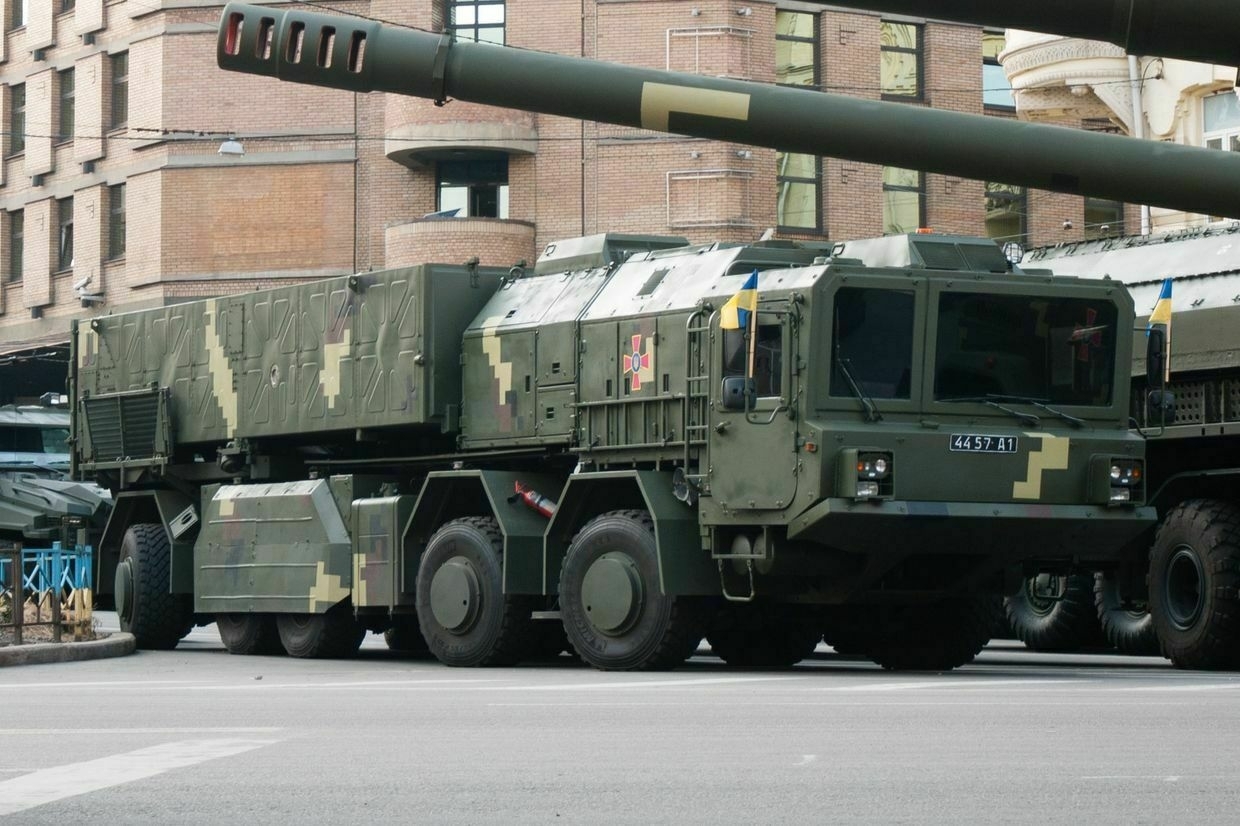
-
Ukraine won't receive NATO invitation at The Hague summit, Lithuanian FM says
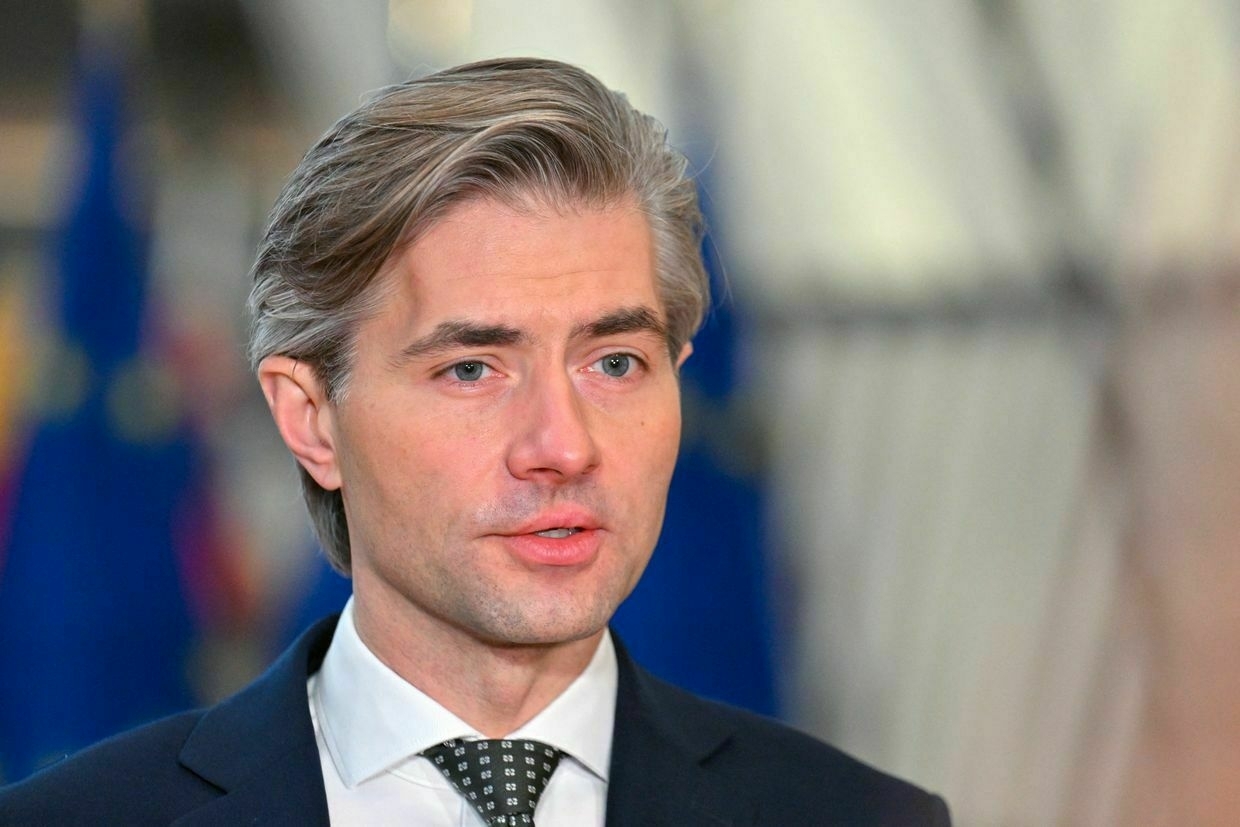
An invitation for Ukraine to become a member of NATO “is not on the agenda” of the upcoming summit in The Hague, Lithuanian Foreign Minister Kestutis Budrys said in an interview with the Baltic News Service published on June 18.
“This issue is certainly not on the NATO agenda and nobody has formulated an expectation that there will be an invitation in The Hague, nor have we heard that from the Ukrainians themselves,” Budrys said in comments quoted by the LRT broadcaster.
“There is no such expectation that there will be breakthrough decisions, neither before the Washington summit nor now before the Hague summit – it is not on the agenda."
The comments, coming less than a week before the summit, hint at a shifting rhetoric within the alliance regarding Ukraine’s potential membership after U.S. President Donald Trump took office.
The new Trump administration has spoken out against Kyiv’s accession, and the U.S. president even echoed the false Russian narratives that its efforts to join NATO helped instigate Russia’s full-scale invasion.
Unlike during the previous summits, the final communique may reportedly completely omit the topic of Ukraine’s membership, as NATO members seek to avoid a conflict with Trump. The gathering was also preceded by rumors that Ukraine may not be invited due to U.S. opposition, but the invitation was extended in the end.
In spite of these tensions, Budrys said that the summit should keep its focus on Ukraine, stressing that the war-torn country is part of the Euro-Atlantic security space.
Ukraine applied for NATO membership in September 2022, months after the outbreak of the full-scale Russian invasion. The alliance has signaled support for Kyiv’s accession efforts in previous years, even declaring at the Washington summit in 2024 that Ukraine’s path to membership is “irreversible” — but stopping short of a formal invite.
Kyiv’s swift entry seems increasingly unlikely amid opposition from the U.S. and several other members, even though NATO Secretary General Mark Rutte recently reaffirmed that a political commitment to Ukraine’s membership stands. Ukraine would need support from all 32 members to join.
It remains uncertain whether The Hague summit will lead to any breakthroughs regarding Ukraine. Following signals that U.S. President Donald Trump may not attend the event, the Guardian reported that President Volodymyr Zelensky may skip the summit as well.
Tired of military aid delays, Ukraine has designed its own ballistic missile — and it’s already in mass-productionUkraine announced on June 13 that its short-range Sapsan ballistic missile would go into mass production, a major development in Kyiv’s ongoing efforts to domestically produce the weapons it needs to fight Russia’s full-scale invasion. As Ukraine faces growing challenges in securing weapons from Western partners, and Russia continues launchingThe Kyiv IndependentYuliia Taradiuk
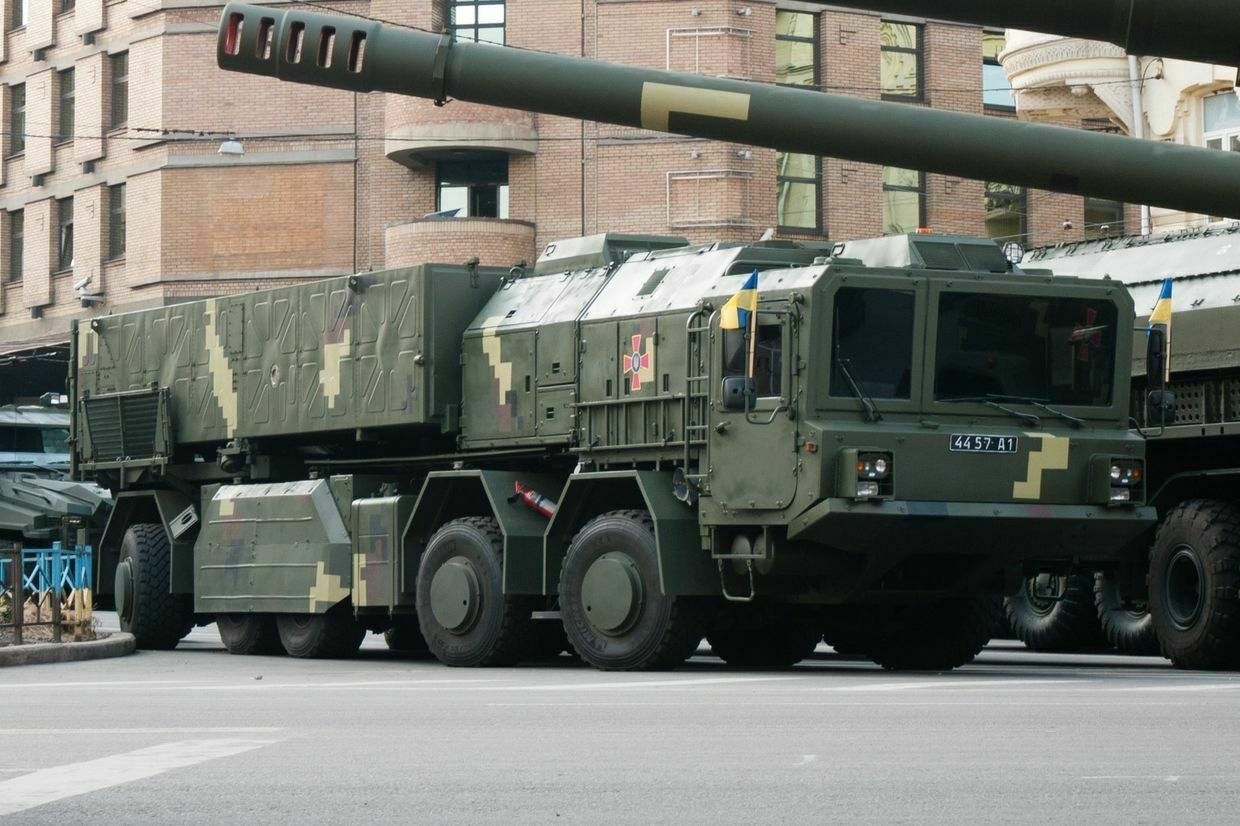
-
Zelensky may reportedly skip NATO summit over uncertainty about Trump's attendance
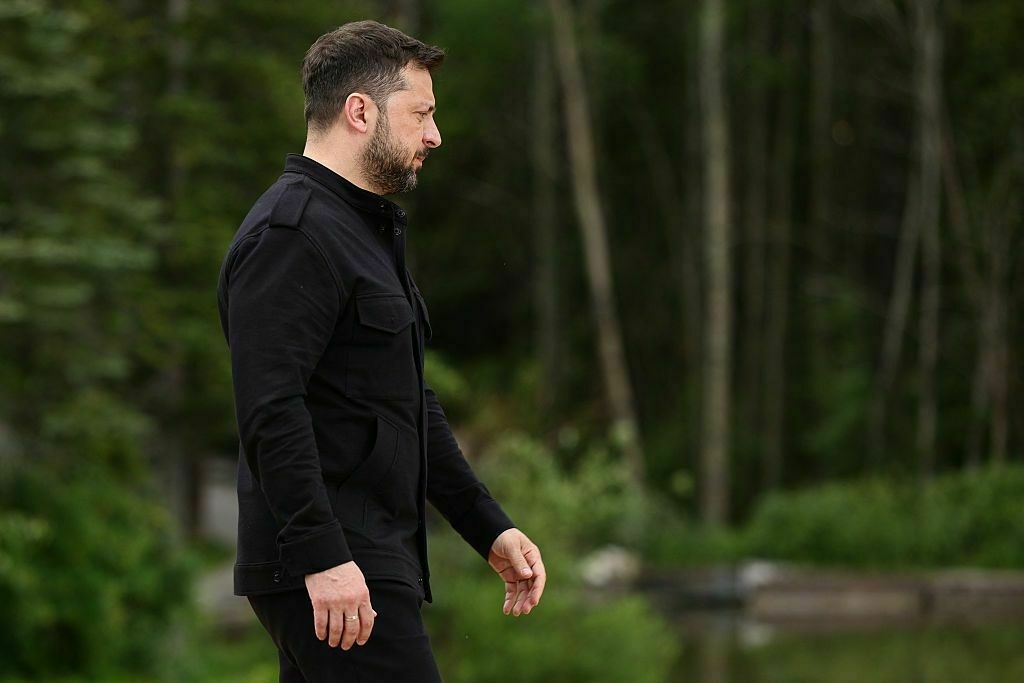
President Volodymyr Zelensky may reconsider attending the NATO summit in The Hague, as questions remain over U.S. President Donald Trump’s participation, the Guardian reported on June 17, citing unnamed Ukrainian officials.
According to the Guardian, some in Kyiv are unsure if Zelensky’s presence at the June 24-25 summit would be worthwhile without a confirmed meeting with Trump, whom they had hoped to engage directly in efforts to pressure Russian President Vladimir Putin into accepting a ceasefire.
Earlier, Zelensky had traveled to the G7 summit in Canada, hoping to meet one-on-one with Trump and push for stronger sanctions against Russia. Trump left the summit early, citing the crisis in the Middle East, and no bilateral meeting or joint G7 statement took place.
One official told the Guardian that Ukraine is in a “permanent hazard” of becoming a victim of “Trump’s short attention span,” adding that Russia has exploited this uncertainty by fresh aerial attacks. The source added that there had been “all sorts of promises for this summit,” including U.S. arms.
The Russian attack on Ukraine that occurred during the G7 summit killed at least 24 civilians and injured 134 in Kyiv. Trump has not responded to the attack as of the day after.
German Chancellor Friedrich Merz has reportedly said Trump had previously promised to attend the NATO gathering, though no official confirmation has been issued from Washington.
Despite the setback, Zelensky said the G7 meeting had concrete results for Ukraine. In a Telegram post on June 17, he thanked partners for increased military aid, new sanctions on Russia, and the decision to allocate frozen Russian assets for Ukraine’s reconstruction.
“It is important that our partners are ready not only to support our defense now, but also to rebuild Ukraine together after the war ends,” he said.
Canadian Prime Minister Mark Carney announced a support package that includes 2 billion Canadian dollars ($1.5 billion) in military assistance and another $1.6 billion in reconstruction loans. The aid includes drones, armored vehicles, ammunition, and sanctions to disrupt Russia’s energy revenues.
U.K. Prime Minister Keir Starmer also unveiled new sanctions targeting Russia’s military-industrial complex and 20 oil tankers from Russia’s “shadow fleet."
Zelensky later told G7 leaders that “diplomacy is now in a state of crisis” and called on allies to press Trump to “use his real influence” to help end the war.
Ukraine has been invited to the NATO summit, and Zelensky previously called the invitation “important” during a June 2 press briefing. At the time, he did not confirm whether he would attend in person.
As Trump stays silent, US Embassy makes late denunciation of Russia’s attack on Kyiv“We extend deepest condolences to the victims’ families. This senseless attack runs counter to President Trump’s call to stop the killing and end the war,” the U.S. Embassy in Ukraine said in a statement.The Kyiv IndependentAnna Fratsyvir
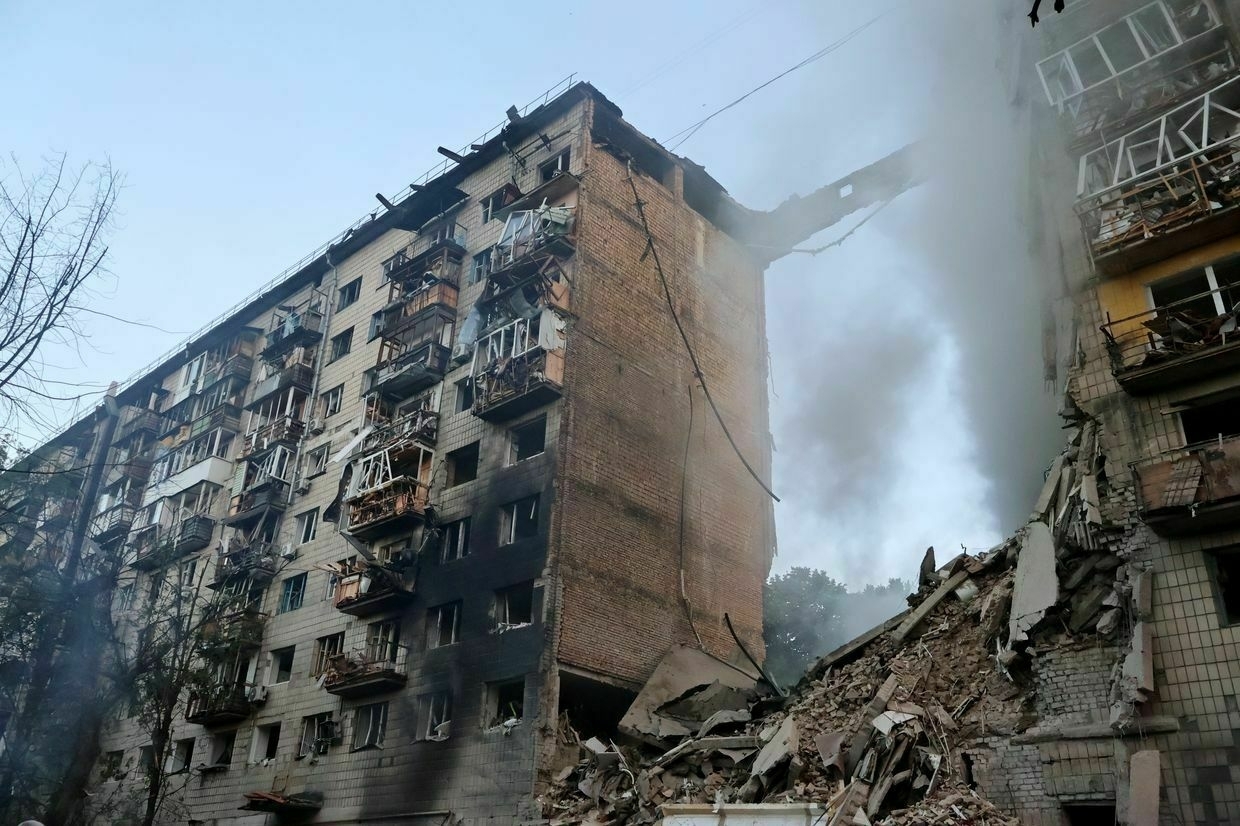
-
As Trump stays silent, US Embassy makes late denunciation of Russia’s attack on Kyiv
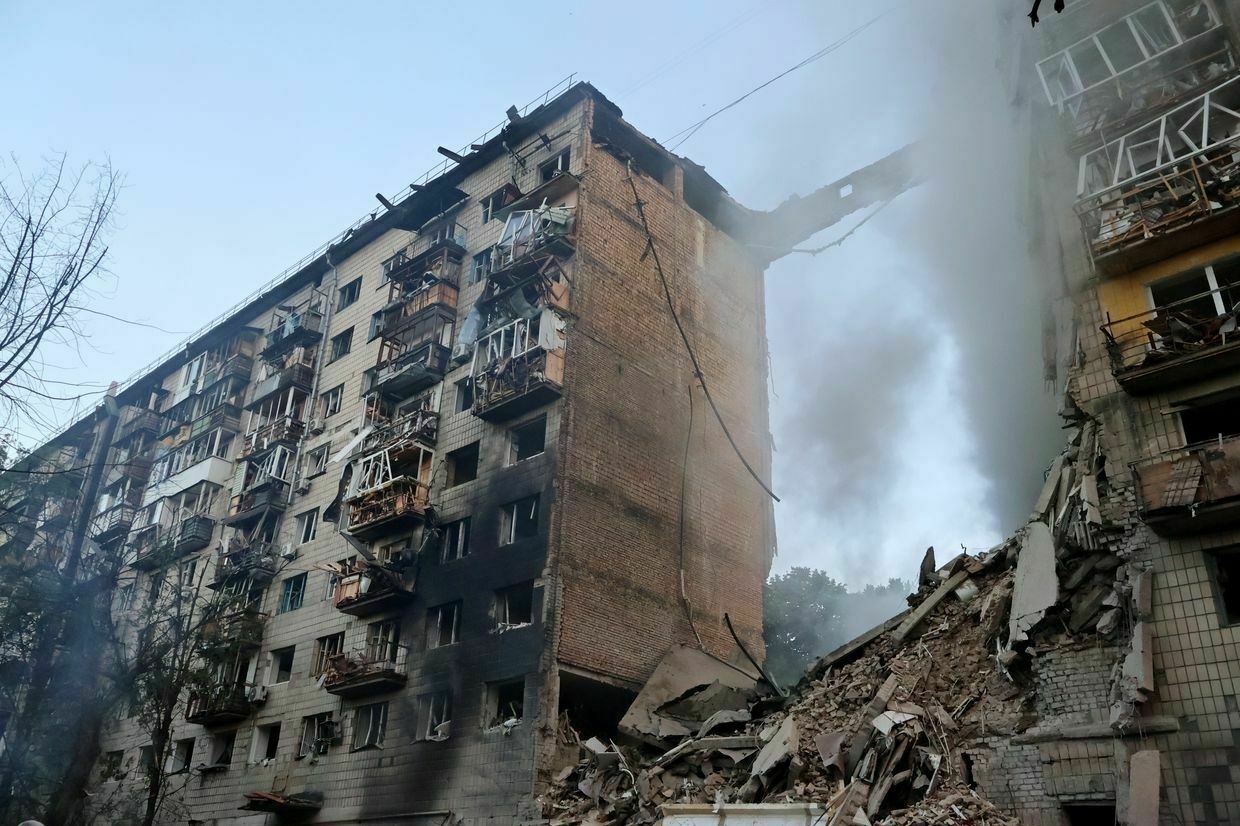
The U.S. Embassy in Kyiv on June 18 condemned Russia’s massive missile and drone attack on Kyiv that killed at least 23 people and injured more than 130 a day earlier, saying it “runs counter” to U.S. President Donald Trump’s peace efforts.
“Today, with all of Ukraine, we join a day of mourning in Kyiv for the victims of Russia’s June 17 attack,” the U.S. Embassy in Ukraine said in a statement. “We extend deepest condolences to the victims' families. This senseless attack runs counter to President Trump’s call to stop the killing and end the war."
The nine-hour overnight attack, which began late June 16, has become one of the largest aerial assaults on the Ukrainian capital since the start of Russia’s full-scale invasion in 2022.
Ukrainian officials said Russia launched 472 aerial weapons, including nearly 280 Shahed-type attack drones and cruise and ballistic missiles. Ukraine’s air defense downed 428 targets, but several struck residential areas, including a nine-story apartment building in Kyiv’s Solomianskyi district.
Among the dead was a U.S. citizen, State Department Press Secretary Tammy Bruce confirmed at a briefing on June 17.
“We are aware of last night’s attack on Kyiv, which resulted in numerous casualties, including the tragic death of a U.S. citizen,” Bruce said. “We condemn those strikes and extend our deepest condolences to the victims and to the families of all those affected."
President Volodymyr Zelensky called it “one of the most horrifying attacks on Kyiv” and urged stronger international support to help Ukraine defend itself.
Despite the scale of the attack, Trump appeared to be unaware of the strike when questioned by reporters aboard Air Force One early on June 17.
“When was that? When?” Trump responded when a reporter asked for his reaction. Told that the drone and missile attack had occurred “very recently,” Trump said: “Just now? You mean as I’m walking back to see you, that’s when it took place? Sounds like it. I’ll have to look at it."
As of a day later, the White House had still not issued an official response to the strike.
The June 17 attack caused extensive damage across the capital. Civilian infrastructure hit included kindergartens, a university dormitory, residential neighborhoods, and industrial sites.
Fahrenheit, a Ukrainian manufacturer of military and civilian clothing, reported that its Kyiv factory was damaged and operations were suspended. Ukrposhta, the national postal service, lost two branches. Ukrainian Railways said a grain-carrying train was struck, disrupting transit.
Kyiv Mayor Vitali Klitschko said unexploded cluster munitions were found in the city — a type of weapon banned by some countries due to the danger they pose to civilians. June 18 was declared a day of mourning in Kyiv.
Foreign Minister Andrii Sybiha called the timing of the attack, as G7 leaders gathered in Canada, a deliberate message from the Kremlin. Moscow has escalated strikes on Ukrainian cities in recent weeks, targeting residential areas and critical infrastructure.
Ukraine has urged Western allies to respond by reinforcing air defense capabilities and tightening economic pressure on Russia.
Putin ‘cannot be trusted’ as mediator, Kallas says, urges EU to tighten Russian oil cap after deadly Kyiv strikeEU High Representative Kaja Kallas urged the European Union to press forward with lowering the oil price cap on Russian crude, even without U.S. support, warning that Middle East tensions could otherwise drive prices up and boost Russia’s revenues.The Kyiv IndependentAnna Fratsyvir
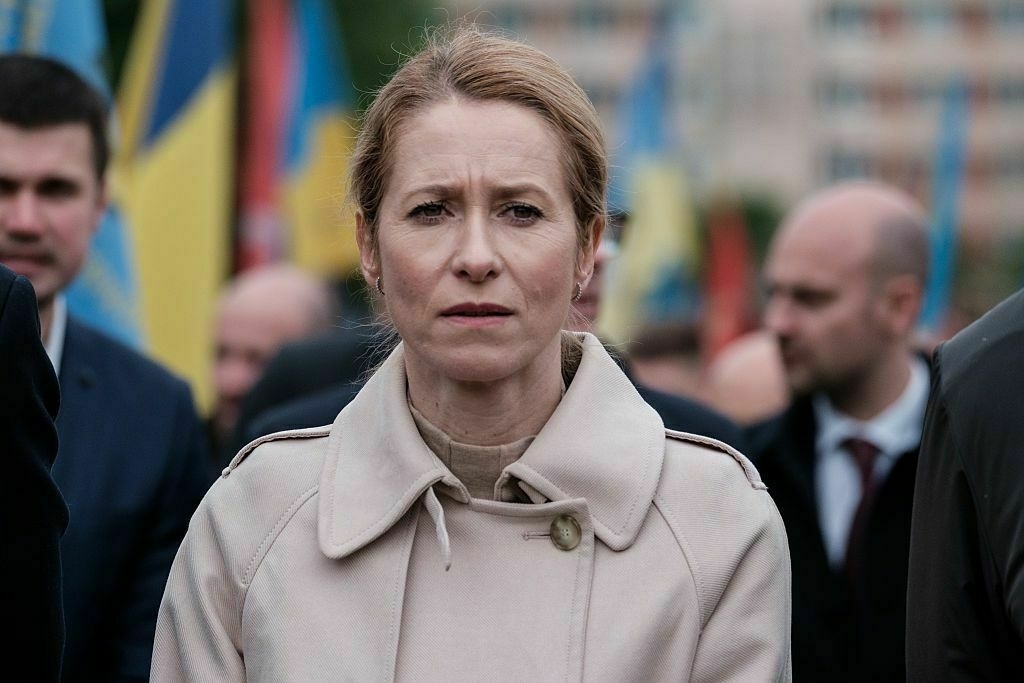
-
Putin 'cannot be trusted' as mediator, Kallas says, urges EU to tighten Russian oil cap after deadly Kyiv strike
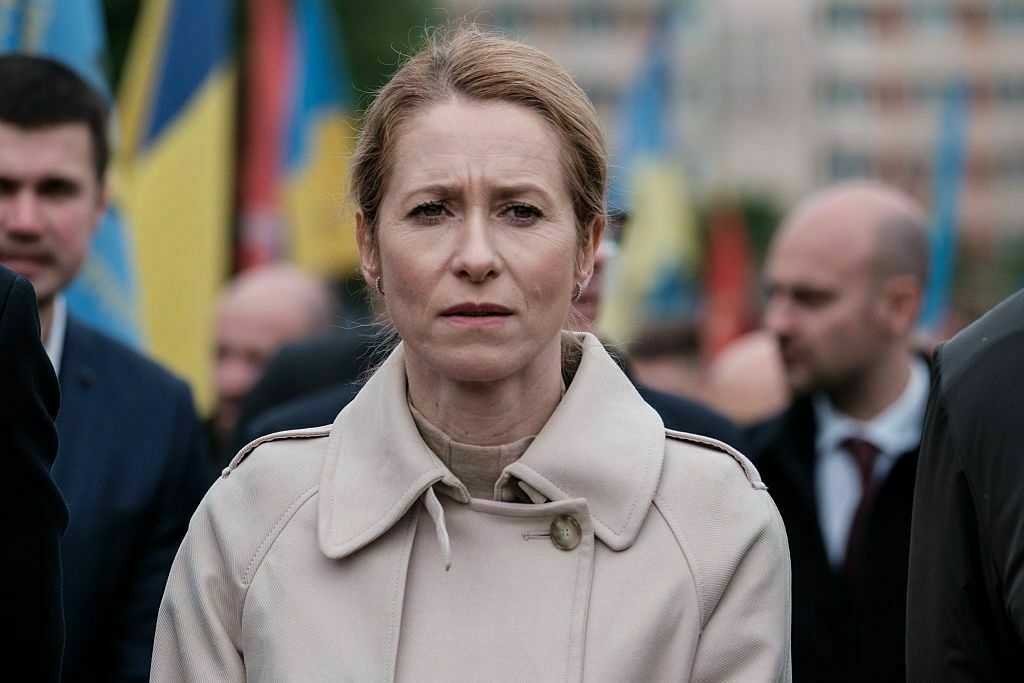
Russian President Vladimir Putin “cannot be trusted” to mediate peace in the Middle East while continuing to launch brutal attacks against civilians, EU High Representative Kaja Kallas said on June 17, following a mass Russian strike on Kyiv that killed at least 21 people and injured over 130.
“Clearly, President Putin is not somebody who can talk about peace while we see actions like this,” Kallas said during a briefing in Brussels. “He’s not a mediator that can really be considered. Russia cannot be a mediator if they don’t really believe in peace."
Russia has sought to position itself as a potential mediator in the escalating conflict between Israel and Iran. Kremlin spokesperson Dmitry Peskov said on June 17 that Israel appeared unwilling to accept Russia’s offer of mediation.
President Donald Trump said on June 15 that Putin had expressed willingness to help mediate between Tel Aviv and Tehran — an idea already dismissed by France. EU leaders have also questioned Moscow’s neutrality given its deep military ties with Iran, which has supplied Russia with drones and missiles used in attacks on Ukraine.
Kallas also pointed to Iran’s role in enabling Russia’s attacks. “Iran has helped Russia do these attacks… their cooperation is working in this regard,” she said.
Kallas urged the European Union to press forward with lowering the oil price cap on Russian oil, even without U.S. support, warning that Middle East tensions could otherwise drive prices up and boost Russia’s revenues.
“The whole idea of the oil price cap is to lower the prices,” Kallas said. “We shouldn’t end up in a situation where the crisis in the Middle East increases oil prices and makes Russia earn more… that would mean they can fund their war machine on a bigger scale."
Her warning comes after global oil prices soared on June 13, following an Israeli strike on Iran that raised fears of a broader regional conflict. Brent and Nymex crude prices surged more than 10% before stabilizing around 7.5% higher, with Brent at $74.50 a barrel and Nymex at $73.20, the BBC reported.
The spike threatens to undermine Western efforts to restrict Russia’s wartime revenues, which heavily depend on oil exports.
Earlier, Kallas said the EU can act independently to lower the oil price ceiling, noting that most Russian crude flows through European-controlled waters.
“Even if the Americans are not on board, we can still do it and have an impact,” she said.
Her remarks come as the EU works on its 18th sanctions package targeting Russia’s energy, banking, and defense sectors. The 17th package entered into force on May 20. European Commission President Ursula von der Leyen has said new measures will further target Russia’s war-sustaining supply chains.
Kallas spoke hours after one of Russia’s deadliest attacks on Kyiv since the start of its full-scale invasion. The nearly nine-hour assault saw Moscow fire 472 aerial weapons, including over 280 Shahed drones and multiple cruise and ballistic missiles.
Ukraine’s Air Force reported intercepting 428 targets, but several missiles hit residential buildings, including a nine-story apartment block in Solomianskyi district, where 16 people were killed.
President Volodymyr Zelensky called the assault “one of the most horrifying attacks on Kyiv” and again called on Western leaders to act decisively.
After 3 years of full-scale war in Ukraine, Europe finally lays out road map to detox from Russian oil and gasAfter three years of limited measures and political hangovers, the European Union has laid out a legal roadmap to finally end its long-standing addiction to Russian oil and gas. Under a new legislative proposal announced in Strasbourg on June 17, Brussels aims to cut off all remaining imports of RussianThe Kyiv IndependentAlex Cadier
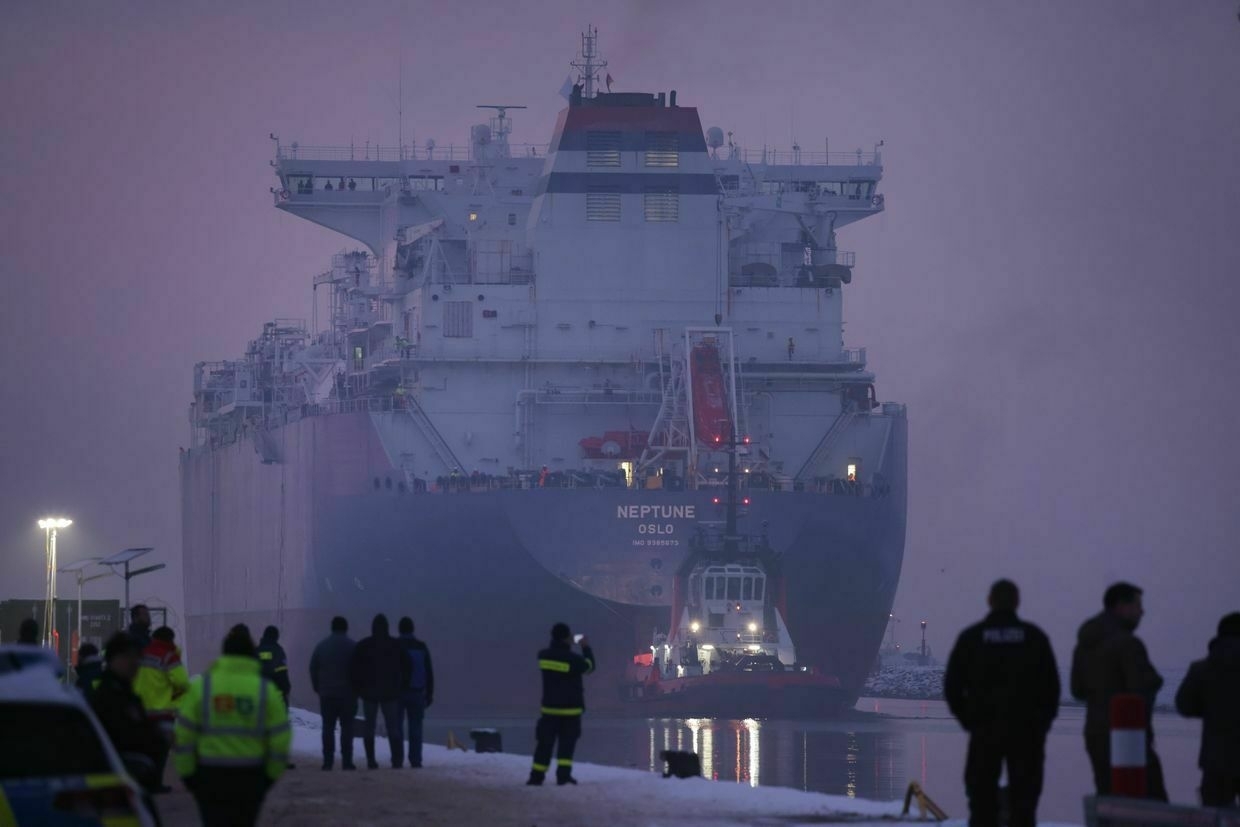
-
Zelensky welcomes G7 support as summit delivers no strong breakthrough for Ukraine
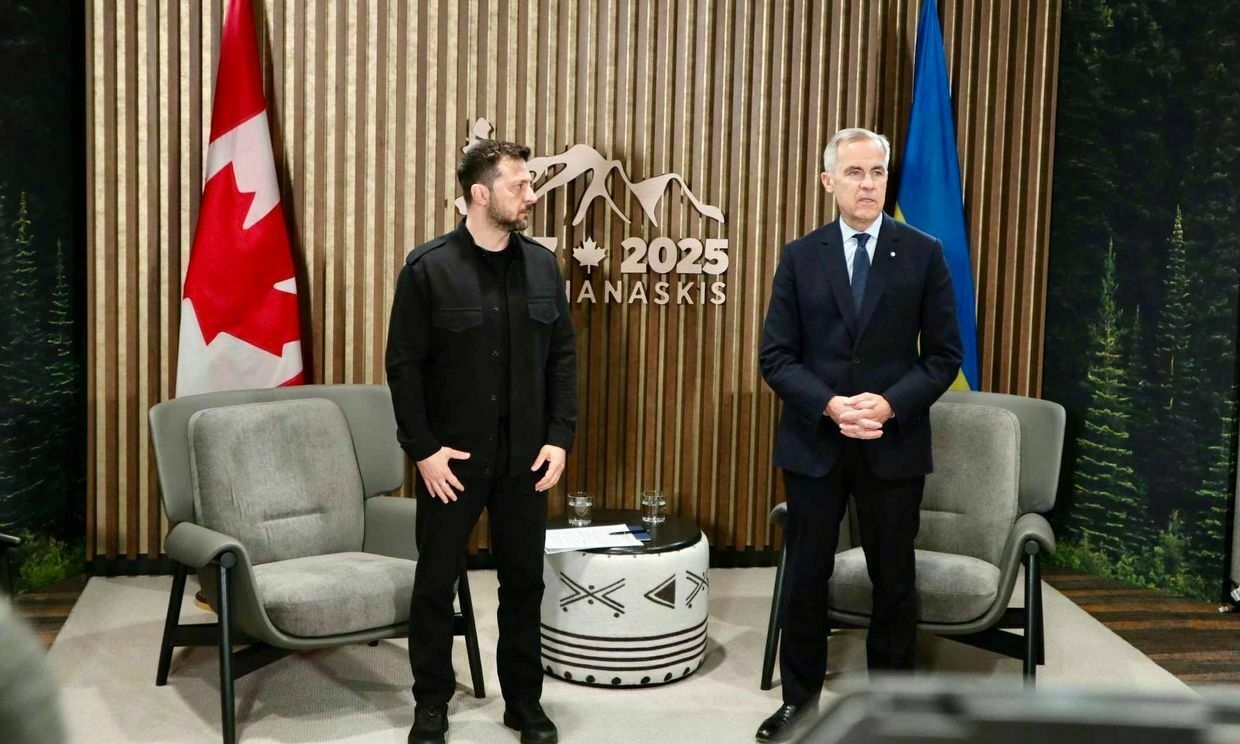
President Volodymyr Zelensky said on June 17 that the G7 summit had produced concrete results for Ukraine, including increased military support, new tranches of aid using frozen Russian assets, and additional sanctions targeting the sources of Russia’s war effort.
“It is important that our partners are ready not only to support our defense now, but also to rebuild Ukraine together after the war ends. I thank everyone who helps us fight Russian aggression and who, together with Ukraine, is building a strong security architecture for the future,” he added in a Telegram post.
Canadian Prime Minister Mark Carney announced a new support package for Ukraine earlier in the day, including two billion Canadian dollars ($1.5 billion USD) in military aid and over two billion Canadian dollars ($1.6 billion USD) loan for reconstruction. The package also includes funding for drones, ammunition, armoured vehicles, and new sanctions targeting Russia’s energy revenues and sanctions evasion.
U.K. Prime Minister Keir Starmer also announced a set of measures aimed at increasing pressure on Russian President Vladimir Putin, who continues to reject calls for an unconditional ceasefire in Ukraine. “The 30 targets strike across Russia’s financial, military and energy sectors in response to Putin’s continued aggression,” reads the U.K. government statement. The new sanctions also “crack down further on Putin’s shadow fleet,” targeting 20 of his oil tankers.
Starmer added that he “strongly” supports tightening the price cap on Russian crude oil to further cut into the Kremlin’s energy revenues.
The G7 nations, however, struggled to present a unified stance on the war in Ukraine after U.S. President Donald Trump voiced support for Russian President Vladimir Putin and called for Russia to be readmitted to the group. Russia was expelled from what was then the G8 after its 2014 invasion of Crimea.
Trump left the summit a day early to address the Israel-Iran conflict from Washington, departing without meeting Zelensky, who had hoped for a one-on-one conversation to press for stronger sanctions against Russia.
Zelensky had already cut his own visit to Canada short on June 17 and was preparing to return to Kyiv while G7 talks were still underway. He had been scheduled to travel to Calgary for events and a press conference with the Ukrainian diaspora, a source told a Kyiv Independent journalist on the ground, but those plans were canceled following a deadly Russian missile strike on Kyiv and changes to the summit agenda.
Zelensky later said he told G7 leaders that “diplomacy is now in a state of crisis” and urged allies to continue pressing Trump “to use his real influence” to help end the war.
With no new US aid packages on the horizon, can Ukraine continue to fight Russia?The U.S. has not announced any military aid packages for Ukraine in almost five months, pushing Kyiv to seek new alternatives. But time is running out quickly as Russian troops slowly advance on the eastern front line and gear up for a new summer offensive. “While Ukraine’s dependence onThe Kyiv IndependentKateryna Hodunova
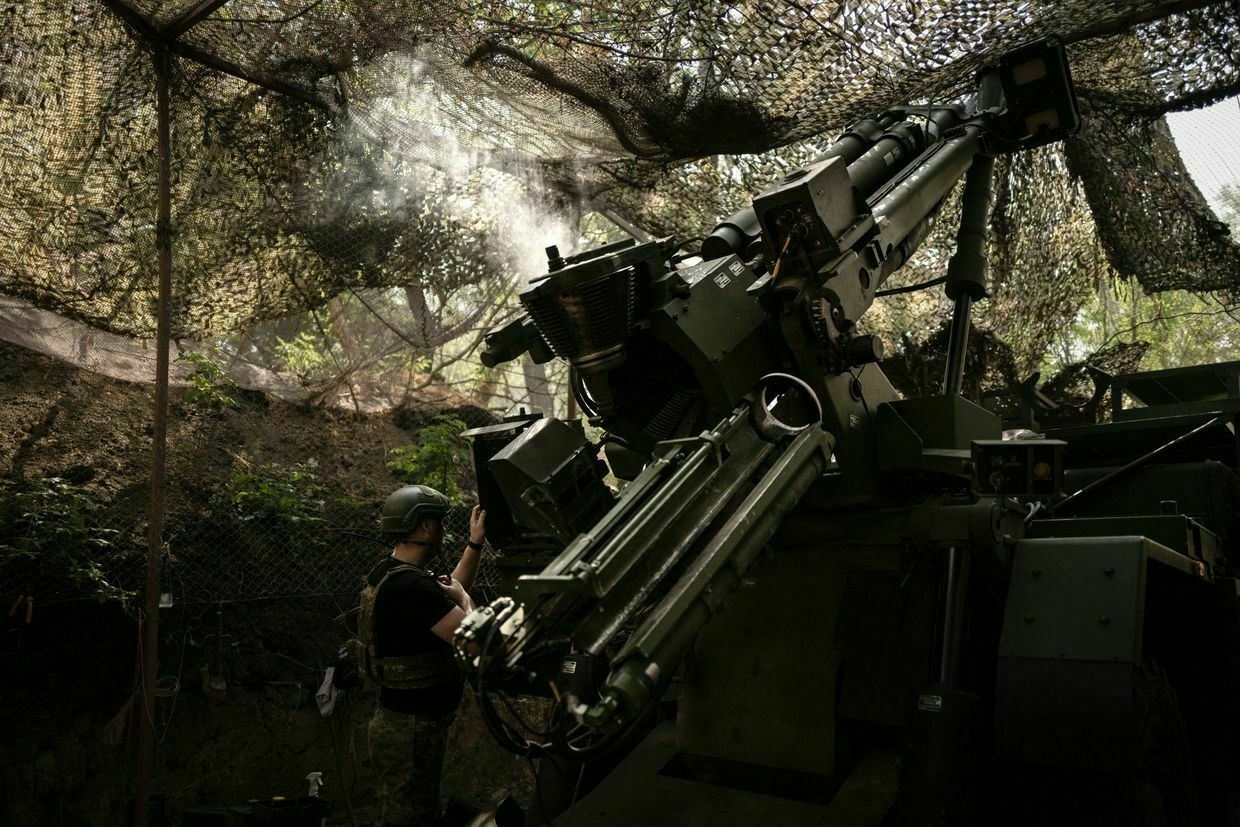
-
'We are determined to increase pressure on Russia' — Macron says as EU ready to toughen Russia sanctions
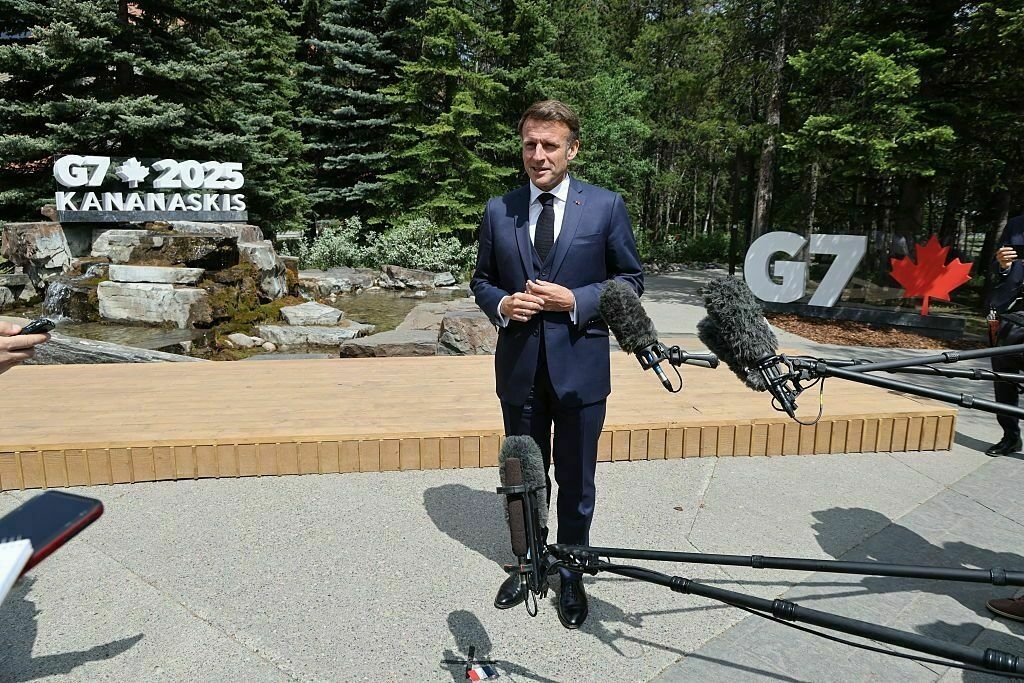
The European Union and its allies are ready to toughen sanctions on Russia, French President Emmanuel Macron said on the sidelines of the Group of Seven (G7) summit on June 17.
“With President (Volodymyr) Zelensky at the G7. We stand in solidarity with the Ukrainian people after last night’s massive Russian strikes,” Macron said in a post to social media.
“We are determined to increase pressure on Russia to accept the immediate and unconditional ceasefire that Ukraine is ready for,” he added.
Macron attended the G7 summit in Kananaskis, Canada, from June 15-17. Global leaders discussed a wide range of topics, including Russia’s war against Ukraine.
As the G7 leaders met in Canada, Russia launched one of its worst drone and missile attacks on Kyiv since it began its full-scale war against Ukraine in February 2022, killing 16 people and injuring at least 134.
“The common position that is emerging is to say, ‘We need to strengthen sanctions,'” CBC News reported, citing Macron.
Europe is proposing much tougher sanctions than the U.S. has imposed on Russia, Macron said, adding that the EU is in “very close co-ordination” with Canada, Japan, and the U.K.
Several countries, including Canada and the U.K., introduced additional sanctions on Russia as the G7 summit was ongoing.
Canada introduced a new military aid package for Ukraine in addition to its sanctions against Russia.
“In our view, this has changed the situation because it will allow us to bring Russia back to the negotiating table, as (U.S.) President (Donald) Trump has been demanding,” Macron said, according to CBC News.
Zelensky attended the summit and met with various leaders, including Macron and Canadian Prime Minister Mark Carney.
Zelensky left the summit early, citing Russia’s attack on Kyiv. The nearly nine-hour-long attack saw Moscow’s forces launch large numbers of drones and missiles at Ukraine’s capital.
Foreign Minister Andrii Sybiha condemned the attack, calling it a “massive and brutal strike” timed deliberately to coincide with the G7 summit.
Zelensky described the drone and missile assault as “one of the most horrifying attacks on Kyiv."
‘He said he wasn’t going anywhere’ — Survivors search for missing following Russia’s deadliest attack on Kyiv this yearSitting a few meters from the rubble of what used to be a nondescript nine-story residential building in Kyiv, Lilia rises to her feet every time another pile of debris is cleared from the site targeted by Russia during a mass overnight attack on June 17. “We are waiting (asThe Kyiv IndependentKateryna Denisova
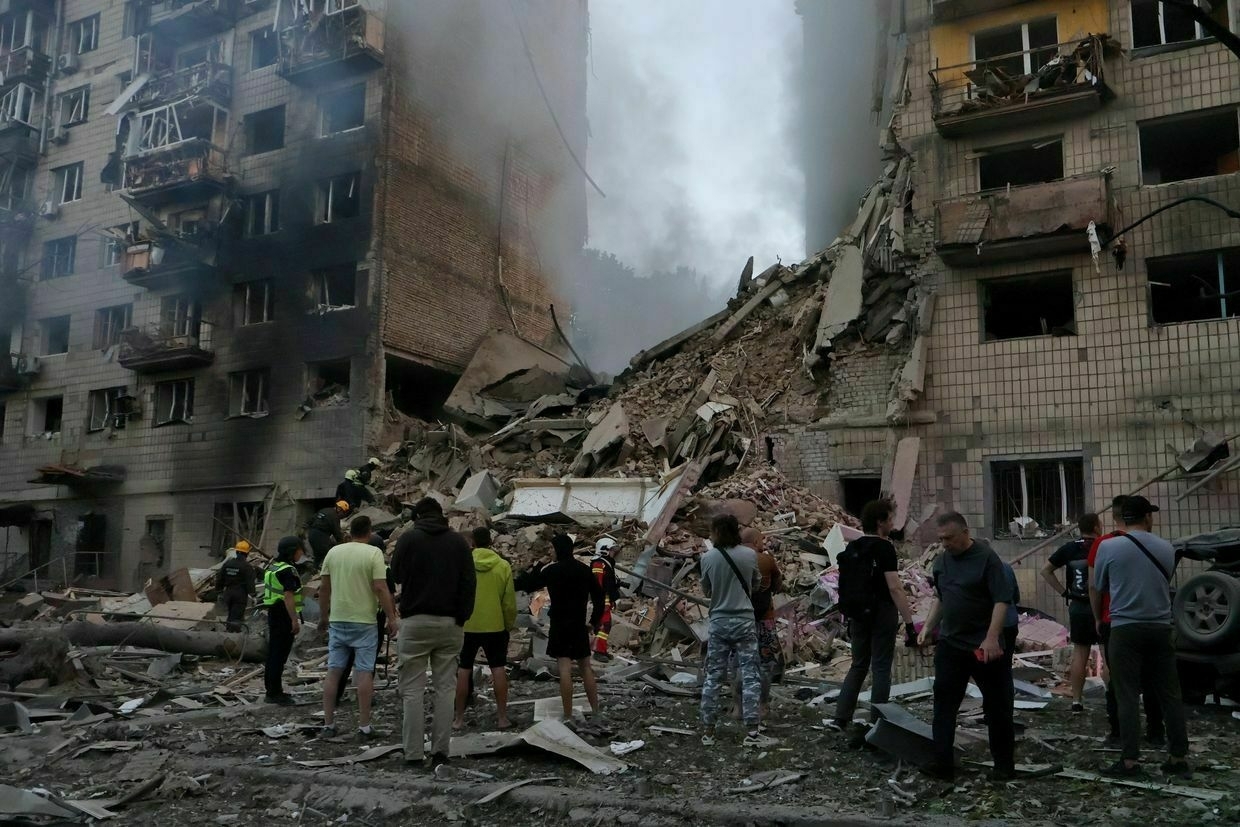
-
Zelensky leaves G7 early without meeting Trump as Canada drops Ukraine statement amid US pushback
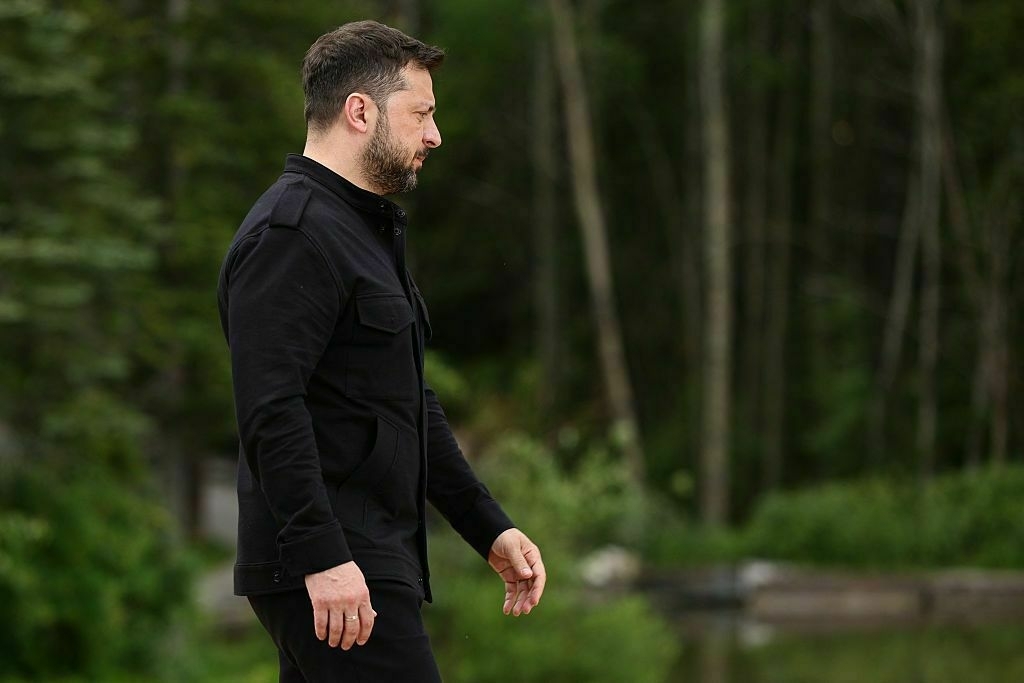
President Volodymyr Zelenskyy is cutting his visit to Canada short and will return to Kyiv following the conclusion of G7 talks on June 17, a source told a Kyiv Independent journalist on the ground.
He had been scheduled to travel to Calgary for additional events and a press conference, but those plans have been cancelled.
The change comes in the wake of a deadly Russian missile strike on Kyiv overnight, as well as changes to the G7 agenda.
Canada dropped plans for the Group of Seven to issue a joint statement on the war in Ukraine after the United States pushed to weaken the language, according to a Canadian official speaking on the sidelines of the summit. The official said Canada felt a watered-down version would not be fair to Ukraine.
Instead, the positions of the remaining six G7 members will be reflected in a separate statement expected from Prime Minister Mark Carney later in the day.
Zelensky had travelled to the summit hoping to meet one-on-one with U.S. President Donald Trump and to push for stronger sanctions against Russia. However, Trump left the summit early, citing the crisis in the Middle East, and no bilateral meeting or unified G7 statement took place.
-
G7 allies push for stronger Russia sanctions as Trump resists, Bloomberg reports
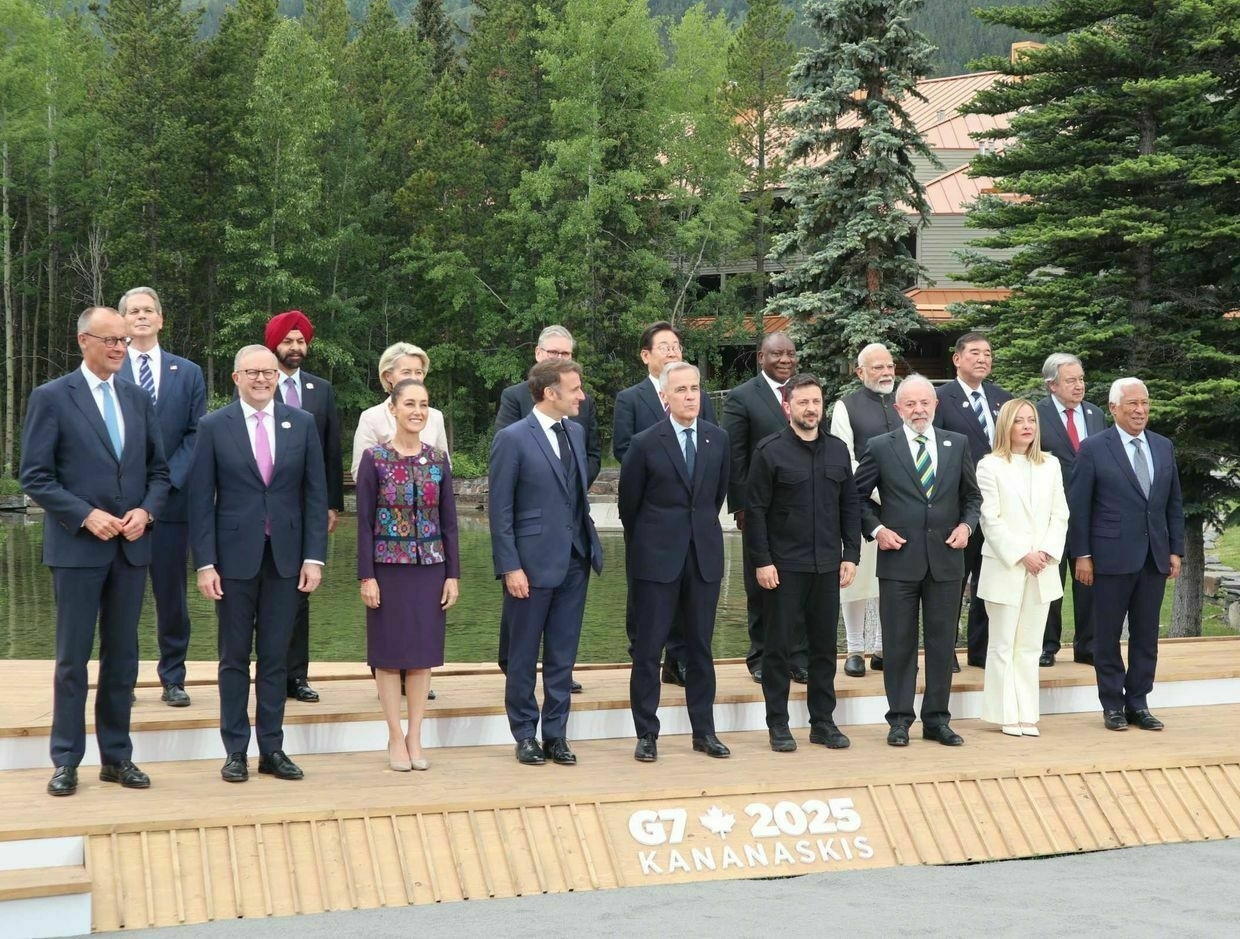
A dinner discussion among Group of Seven leaders on June 16 failed to shift U.S. President Donald Trump’s position on tougher sanctions against Russia, Bloomberg reported, citing sources familiar with the talks.
Trump has continued urging Russian President Vladimir Putin to agree to a ceasefire in Ukraine but has resisted additional sanctions, despite previously threatening to introduce more. At the G7 dinner, he reportedly repeated concerns that sanctions were too costly for the United States.
A chair’s statement expected from Canadian Prime Minister Mark Carney will affirm G7 support for U.S.-led peace efforts, according to Bloomberg. The statement is also set to highlight that Ukraine has demonstrated readiness for a ceasefire, while Russia has not, and emphasize the need for continued pressure on Moscow through sanctions. Carney’s office did not comment on the expected statement.
The European Union introduced its 18th package of sanctions ahead of the summit, while the United Kingdom followed with new restrictions targeting Russia’s energy and financial sectors. Both the EU and the U.K. have pushed to lower the G7 price cap on Russian oil, a move the U.S. has so far opposed.
The debate over sanctions comes amid intensified Russian strikes on Ukraine. Overnight, at least 14 people were killed in Kyiv in what President Volodymyr Zelensky described as “one of the most horrific attacks” since the start of the full-scale war. Multiple areas of the capital were hit by drones, missiles, or falling debris, including a direct strike on a nine-story residential building, which caused part of the structure to collapse. Search and rescue operations were ongoing.
“Such attacks are pure terrorism,” Zelensky said in a post on X after arriving in Canada for the G7 meeting. “And the whole world, the United States, and Europe must finally respond as a civilized society responds to terrorists.”
Zelensky had been scheduled to meet with Trump on June 17, but the meeting was canceled after the U.S. president left the summit early, citing the crisis in the Middle East. European officials, according to Bloomberg, are increasingly uncertain about Trump’s reliability and are working to reinforce security cooperation with other allies as U.S. support for Ukraine appears to be wavering.
Tired of military aid delays, Ukraine has designed its own ballistic missile — and it’s already in mass-productionUkraine announced on June 13 that its short-range Sapsan ballistic missile would go into mass production, a major development in Kyiv’s ongoing efforts to domestically produce the weapons it needs to fight Russia’s full-scale invasion. As Ukraine faces growing challenges in securing weapons from Western partners, and Russia continues launchingThe Kyiv IndependentYuliia Taradiuk
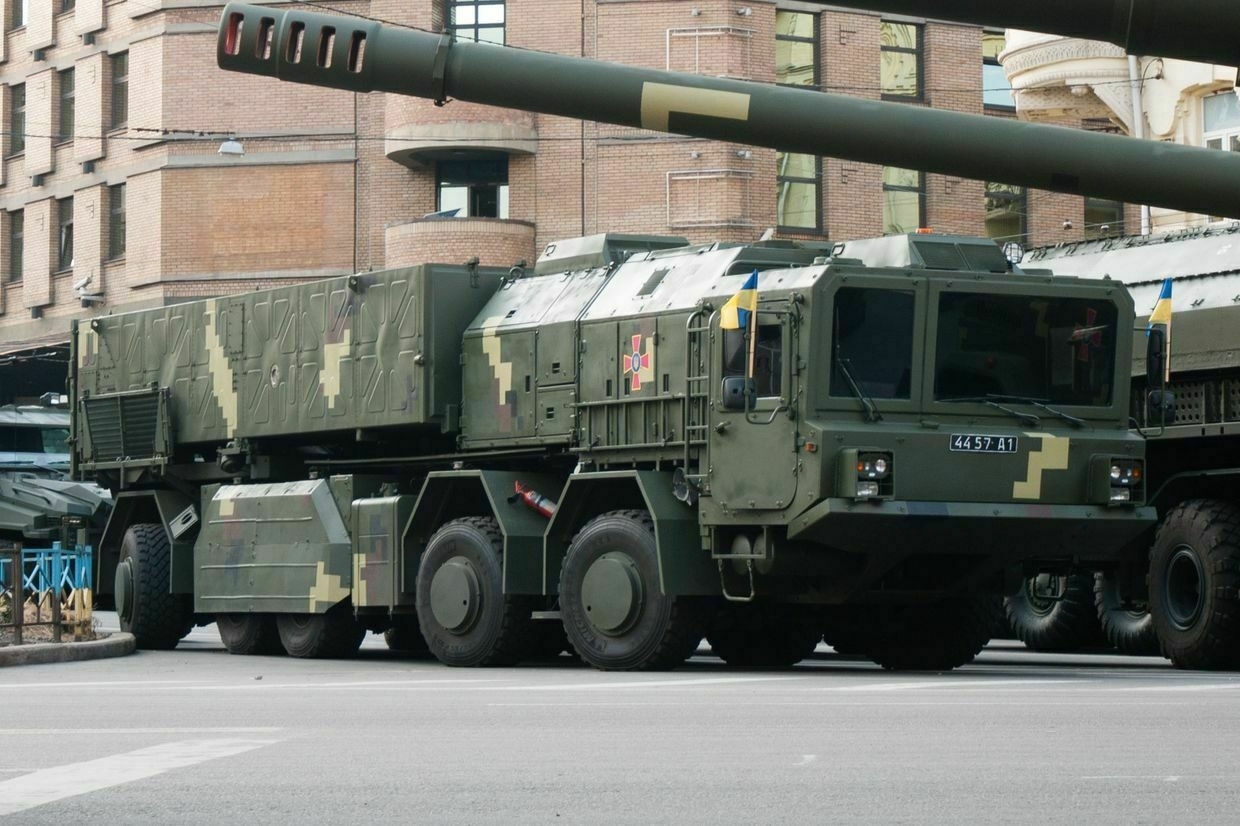
-
Ukraine war latest: Massive Russian attack kills 14, injures 117 in Kyiv
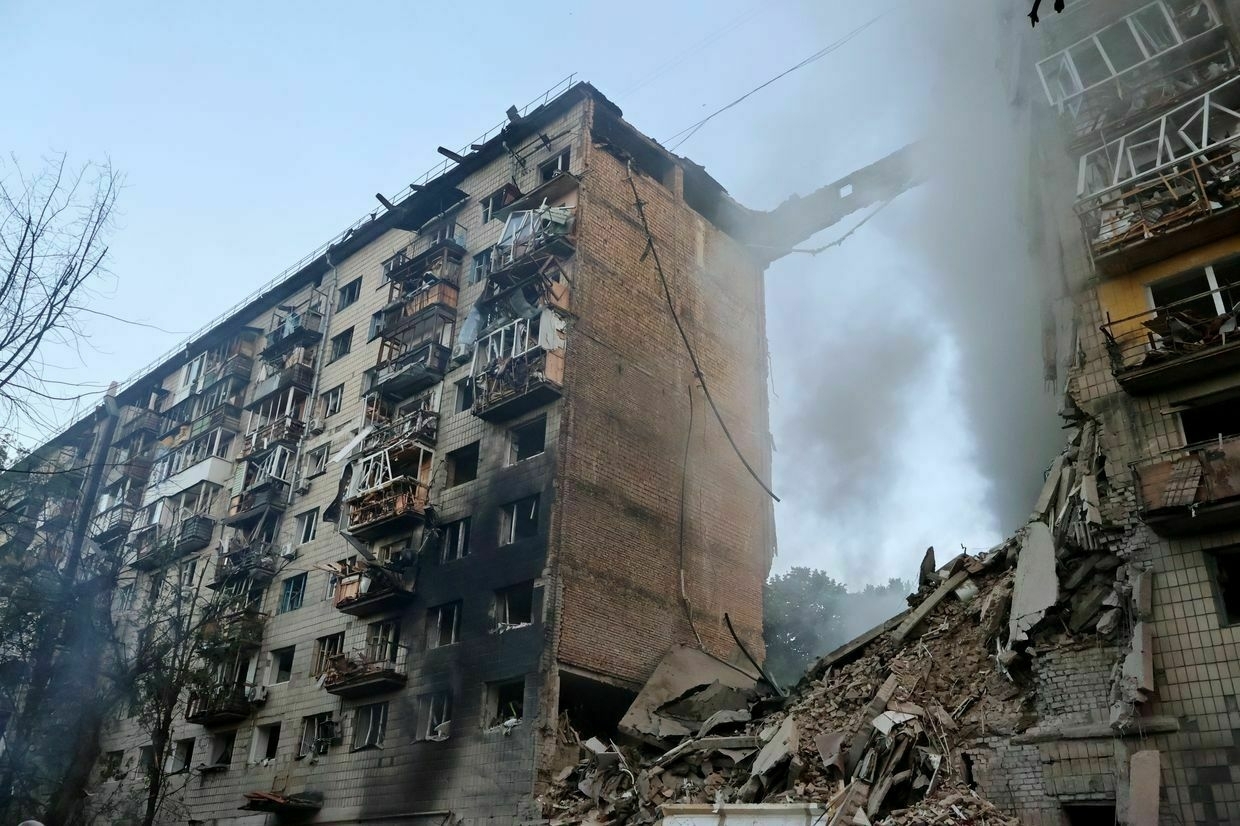
Key developments on June 17:
- ‘A brutal strike’ — Massive Russian missile and drone attack hits Kyiv, killing 14, injuring at least 117
- Zelensky arrives at G7 summit hours after Trump departs
- US group designed to pressure Russia into peace in Ukraine disbanded by Trump administration, Reuters reports
- US reportedly considers strikes on Iran as Trump demands' unconditional surrender'
- Russian military-industrial chemical plant halts operations after Ukrainian drone strike
At least 14 people have been killed and at least 117 others injured after a mass Russian missile and drone attack on Kyiv overnight on June 17.
Ukraine’s National Police initially reported 15 dead and 124 injured in the attack, but Interior Minister Ihor Klymenko later revised the death toll to 10. The State Emergency Service subsequently updated the figure to 14.
Klymenko said operational data may change, as body parts found during rescue efforts can sometimes be mistakenly counted as multiple victims.
According to the State Emergency Service, one body has been recovered from the rubble of the nine-story building, and rescue operations are still ongoing.
The almost nine-hour-long attack saw Moscow’s forces launch large numbers of kamikaze attack drones, as well as cruise and ballistic missiles at Ukraine’s capital.
Kyiv Independent journalists on the ground reported the sounds of drones, missiles, and multiple rounds of explosions throughout the night.
The Ukrainian Air Force confirmed that Russia launched 472 aerial weapons overnight, including nearly 280 Shahed-type attack drones and two Kinzhal ballistic missiles. The strike primarily targeted Kyiv.
Ukraine’s air defense forces reportedly destroyed 428 air targets, including 239 Shahed drones and 15 Kh-101 cruise missiles. Air defenses also intercepted one Kinzhal missile, while another was reportedly lost from radar tracking.
President Volodymyr Zelensky called the assault “one of the most horrifying attacks on Kyiv,” saying more than 440 drones and 32 missiles were launched across Ukraine overnight.
“Such attacks are pure terrorism,” he said in a statement on social media. “And the whole world, the U.S., and Europe must finally respond as civilized societies respond to terrorists."
Zelensky confirmed that damage had been reported in eight districts of Kyiv, with emergency workers still searching for survivors beneath the rubble of a destroyed apartment block.
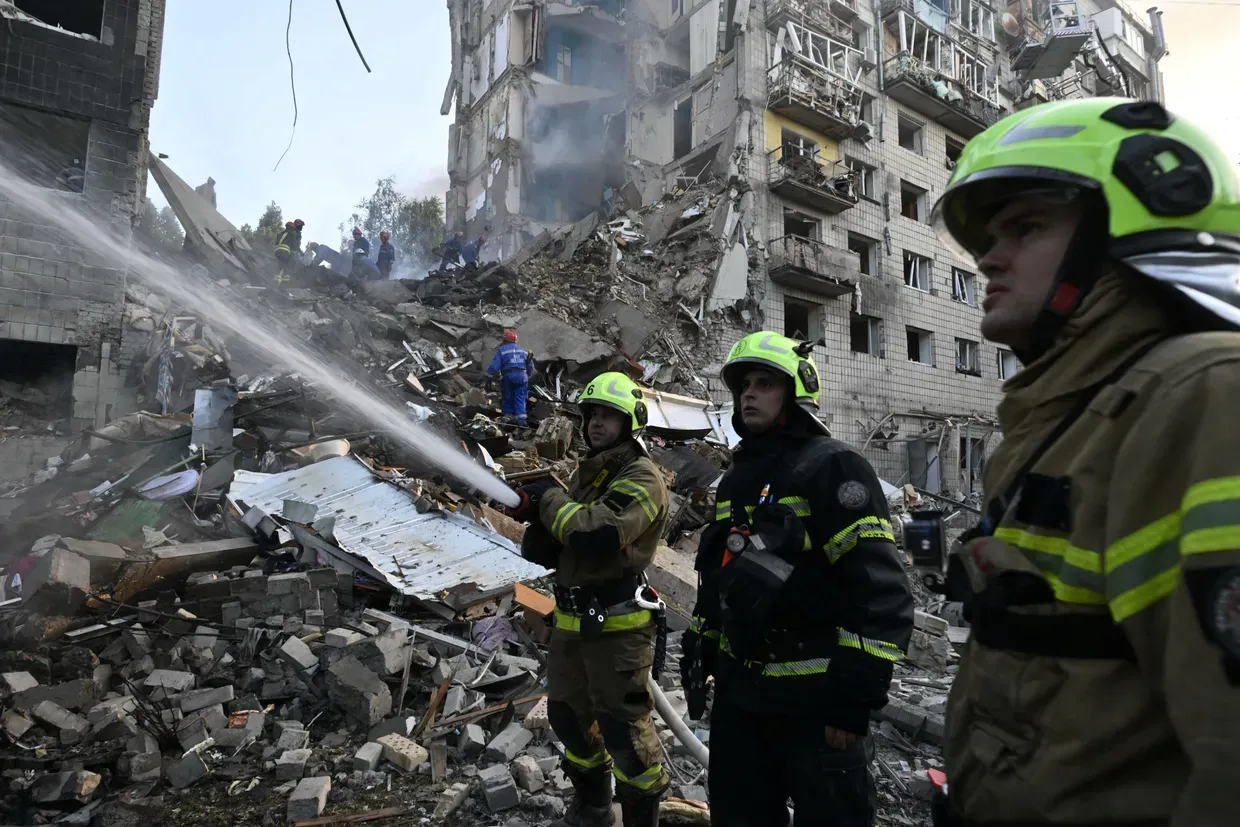
Firefighters extinguish burning parked cars next to a heavily damaged residential building following the Russian missile strike on Ukraine’s capital of Kyiv on June 17, 2025. (Genya Savilov / AFP via Getty Images) In a video posted on Telegram, Kyiv Mayor Vitali Klitschko said cluster munitions had been found in one area of the city. He later added that June 18 would be an official day of mourning in Kyiv.
Many of the deaths and injuries occurred when a Russian missile hit a nine-storey residential building in the Solomianskyi district, “completely destroying” one section, Ukraine’s State Emergency Service said.
“I saw the missile because it was low,” Olena Kushnirova, a 46-year-old nurse who lives in a neighboring building to the one that was hit, told the Kyiv Independent.
During the attack on the capital, a 62-year-old U.S. citizen died in the Solomianskyi district in a building across from where medics were assisting the injured, Klitschko reported. Medical personnel confirmed biological death.
Foreign Minister Andrii Sybiha also condemned the attack, calling it a “massive and brutal strike” timed deliberately to coincide with the G7 summit.
“Putin does this on purpose… He sends a signal of total disrespect to the United States and other partners who have called for an end to the killing,” Sybiha said. “Only strong steps and real pressure on Moscow can prove him wrong."
A Russian drone also hit a multi-storey building Darnytskyi District.
“At first there was shock,” Tatiana Bratus, a 50-year-old resident of the building, told the Kyiv Independent.
“People started running outside, shouting, some in panic, because the attack wasn’t over yet. They said there were still rockets flying. People ran to the bomb shelter.
A kindergarten in the Darnytskyi district was also damaged, Tymur Tkachenko, the head of the Kyiv City Military Administration, said. No casualties were reported at the site.
The upper floors of residential buildings in the Solomianskyi and Shevchenkivskyi districts were also damaged.
A dormitory at the Kyiv Aviation Institute was hit by drones during the attack, the news outlet Suspilne reported. Drones struck the institute’s 10th floor and broke windows on three other floors.
Outside the capital, the attacks also caused damage and injured civilians in Kyiv Oblast towns. At least one woman was injured and multiple homes were damaged, according to the regional administration.
The Russian strike damaged the production facility of Fahrenheit, a Ukrainian clothing manufacturer that supplies apparel and undergarments for both civilians and the military. The company announced it was forced to cancel all current orders and suspend new ones indefinitely following the destruction of its Kyiv site.
Russian forces also hit a Ukrainian Railways (Ukrzaliznytsia) freight train carrying grain. Several railcars overturned, temporarily halting operations and spilling grain from the damaged wagons. Ukrzaliznytsia said the damage would be "promptly repaired" and train traffic would not be affected.
Ukrposhta, Ukraine's national postal service, reported the destruction of two of its branches in Kyiv during the attack, according to CEO Ihor Smiliansky. The company's team is working to "quickly restore services," he said.
The attack followed a series of drone strikes overnight on June 16 targeting Kyiv Oblast, including both the capital and surrounding settlements. In the Obukhiv district, a 60-year-old man was injured, according to regional authorities.
Russian attacks against Ukraine have intensified in May and June, with Moscow launching several record-breaking mass strikes against Kyiv and other cities.
‘He said he wasn’t going anywhere’ — Russian strikes kill 14 in Kyiv as survivors search for missingSitting a few meters from the rubble of what used to be a nondescript nine-story residential building in Kyiv, Lilia rises to her feet every time another pile of debris is cleared from the site targeted by Russia during a mass overnight attack on June 17. “We are waiting (asThe Kyiv IndependentKateryna Denisova
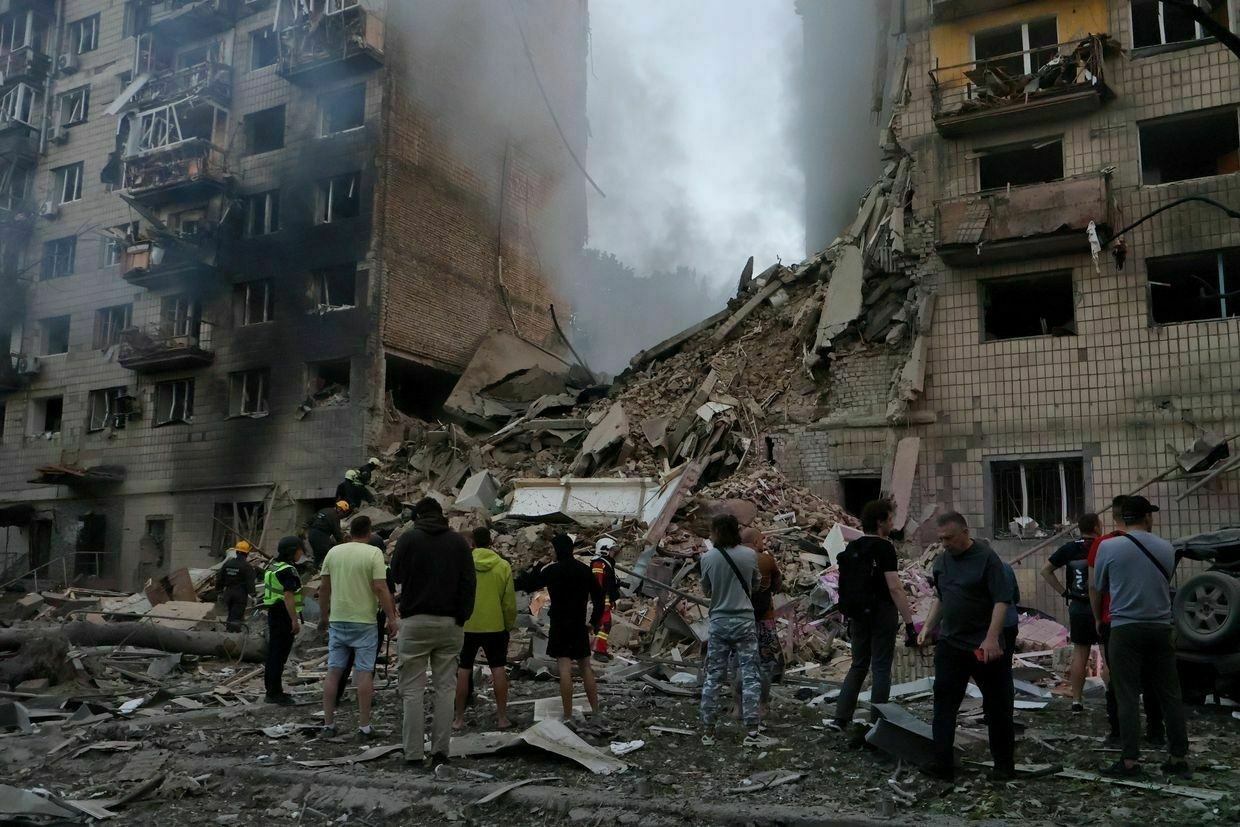
Zelensky arrives at G7 summit hours after Trump departsPresident Volodymyr Zelensky arrived at the G7 Leaders' Summit in Canada on June 17 ahead of the final day of the G7 Leaders' summit, according to a Kyiv Independent journalist on the ground.
Zelensky was greeted by Canadian Prime Minister Mark Carney in Kananaskis, Alberta, where the summit is being held.
"We need more from our allies... We are ready for peace negotiations... But for this, we need pressure," the Ukrainian president said.
The Ukrainian president was expected to meet U.S. President Donald Trump at the summit. However, it is not clear if the meeting will take place because Trump left the summit early due to escalating tensions in the Middle East.
White House spokesperson Caroline Leavitt confirmed Trump's early departure from the summit, citing the ongoing escalation between Israel and Iran.
Zelensky was to hold his third in-person meeting with Trump, which may signal the future of Trump and Zelensky's relationship, as well as offer insight into the United States' commitment to supporting Ukraine.
In February, Zelensky and Trump held their first meeting, which escalated into a heated argument, with Trump and Vice President JD Vance lambasting the Ukrainian leader over what they described as "a lack of gratitude for U.S. support."
The second meeting between Trump and Zelensky in the Vatican in April led to the U.S. president reiterating calls for a ceasefire in Ukraine and even threatening to impose sanctions on Russia.
In the month since their last in-person meeting, tensions between Trump and Zelensky have risen again. Despite issuing several threats, Trump has not followed through on implementing additional economic pressure on Moscow.
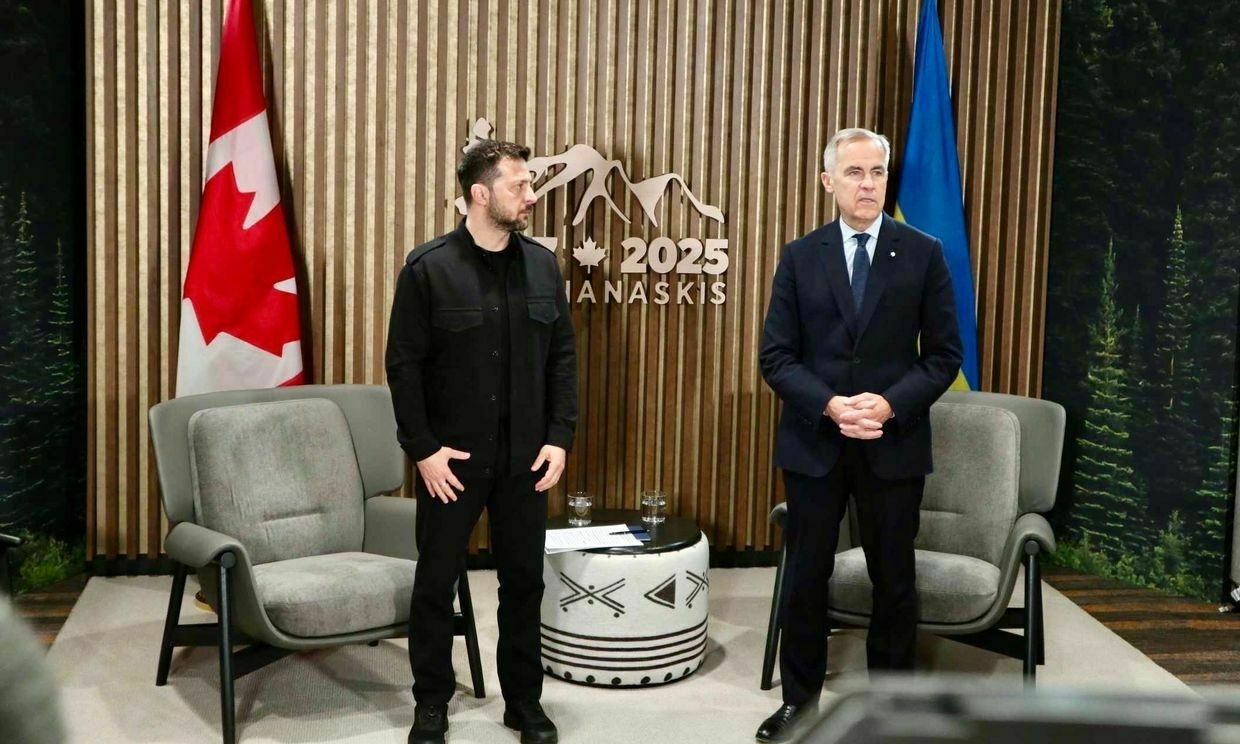
Canadian Prime Minister Mark Carney welcomes President Volodymyr Zelensky during the Group of Seven (G7) Summit in Kananaskis, Alberta, Canada on June 17, 2025. (Dmytro Basmat / The Kyiv Independent) Ahead of the summit, European leaders urged G7 nations to impose harsher sanctions on Moscow in order to secure a ceasefire in the war against Ukraine.
"To achieve peace through strength, we must put more pressure on Russia to secure a real ceasefire, to bring Russia to the negotiating table, and to end this war. Sanctions are critical to that end," European Commission President Ursula von der Leyen said on June 15 at a press briefing attended by a Kyiv Independent journalist.
Zelensky is still expected to attend the scheduled meetings with other G7 leaders.
Zelensky said in a closed-door meeting attended by the Kyiv Independent on June 13 that his priority is to speak with Trump about sanctions against Russia, peace talks, weapons purchases, and U.S.-Ukraine economic cooperation.
"There are steps forward we can take — but we need the political will of the U.S. president, if he wants," Zelensky said on June 13.
Amid increased anxiety around Trump's commitment to ending the war, U.S. Defense Secretary Pete Hegseth recently announced that the Pentagon would reduce funding allocated for military assistance to Ukraine in its 2026 defense budget.
Canada, which holds the G7 presidency in 2025, invited Zelensky to participate in summit, marking the Ukrainian president's fourth G7 meeting since the outbreak of the full-scale invasion in 2022.
Tired of military aid delays, Ukraine has designed its own ballistic missile — and it’s already in mass-productionUkraine announced on June 13 that its short-range Sapsan ballistic missile would go into mass production, a major development in Kyiv’s ongoing efforts to domestically produce the weapons it needs to fight Russia’s full-scale invasion. As Ukraine faces growing challenges in securing weapons from Western partners, and Russia continues launchingThe Kyiv IndependentYuliia Taradiuk
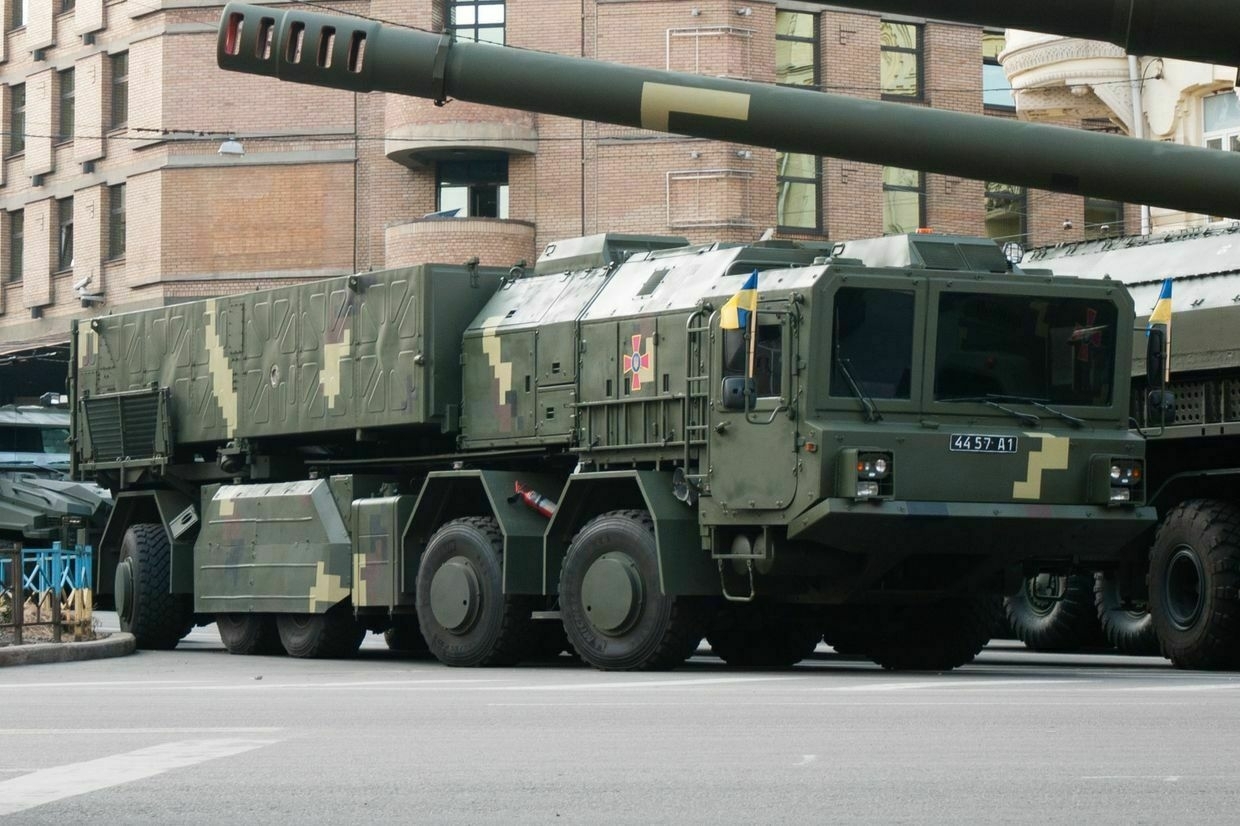
US group designed to pressure Russia disbanded by Trump administration, Reuters reportsA U.S. government working group that formulated strategies for pressuring Russia into peace talks and ending the war in Ukraine has been disbanded by the White House, Reuters reported on June 17.
Officials cited by the news outlet said it was established this spring but became increasingly irrelevant as it became clear U.S. President Donald Trump wasn't willing to apply any concrete pressure on Moscow during peace talks.
"It lost steam toward the end because the president wasn't there. Instead of doing more, maybe he wanted to do less," an anonymous official said.
As Ukraine and the U.S. continue to push for an unconditional ceasefire, Russia has maintained maximalist demands and rejected all such proposals.
At the same time, it has escalated attacks on Ukrainian civilians, killing at least 15 people and injuring scores of others in the latest attack on Kyiv overnight on June 17.
Trump has expressed frustration with Moscow's intransigence and growing violence but has yet to impose any new sanctions on Russia.
On June 1,6 while speaking in Canada ahead of a G7 summit, Trump said barring Russia from the G8 for its invasion of Ukraine in 2017 had been a "mistake."
According to Reuters, the working group, staffed by officials from the National Security Council, State Department, Treasury Department, the Pentagon and intelligence community, was decimated in a purge of personnel around three weeks ago.
Trump pledged to "stop the wars" when he was elected U.S. president for the second time, but after just five months in office, the world is a far more violent place.
As well as Russia escalating attacks on Ukraine, Israel and Iran are now locked in a conflict that further threatens stability in the Middle East.
‘Beyond cynical’ – Russian doctor carved ‘Glory to Russia’ scar on POW during operation, Ukraine saysAfter more than three years of Russia’s full-scale invasion, each new revelation of cruel treatment of Ukrainians in Russian captivity hardly surprises anyone. But when a photo recently emerged online, showing a “Glory to Russia” scar on the body of a Ukrainian prisoner of war (POW), it sent shockwavesThe Kyiv IndependentDaria Shulzhenko

US reportedly considers strikes on Iran as Trump demands 'unconditional surrender'U.S. President Donald Trump is weighing direct military action against Iran, including potential strikes on its nuclear facilities, Axios reported on June 17, citing unnamed U.S. officials.
Trump demanded Iran's "unconditional surrender" on Truth Social on June 17 and threatened Supreme Leader Ayatollah Ali Khamenei, boasting about U.S. air superiority.
The U.S. president is expected to meet with his national security team later in the day to determine the scope of involvement in the escalating conflict between Israel and Iran, according to Axios.
The meeting comes after his early departure from the G7 Leaders' Summit on June 16, where he had been scheduled to meet with President Volodymyr Zelensky the following day.
"We now have complete and total control of the skies over Iran," Trump wrote on Truth Social.
He added that "we know exactly where the so-called 'Supreme Leader' is hiding."
"He is an easy target, but is safe there - We are not going to take him out (kill!), at least not for now," Trump continued. "But we don't want missiles shot at civilians, or American soldiers. Our patience is wearing thin."
The U.S. president is increasingly leaning toward using military force to target Iran's nuclear facilities, moving away from a diplomatic resolution, CNN reported, citing two unnamed U.S. officials.
Although Trump continues to be receptive to negotiations, CNN sources indicated that any agreement would require significant concessions from Tehran.
German Chancellor Friedrich Merz said on June 17 that U.S. involvement in Israel's military campaign is under serious consideration, and a decision could be "made in the near future," Politico reported.
Merz said the decision depends on whether the Iranian regime "is prepared to return" to the negotiating table.
Israel-Iran war could provide economic boost Russia needs to continue fight against UkraineIsrael’s “preemptive” strikes against Iran targeting the country’s nuclear program and killing top military officials could have far-reaching implications for Ukraine and could boost Russia’s ability to continue its full-scale invasion, experts have told the Kyiv Independent. Iran has been one of Russia’s staunchest allies throughout the war, providing thousandsThe Kyiv IndependentChris York
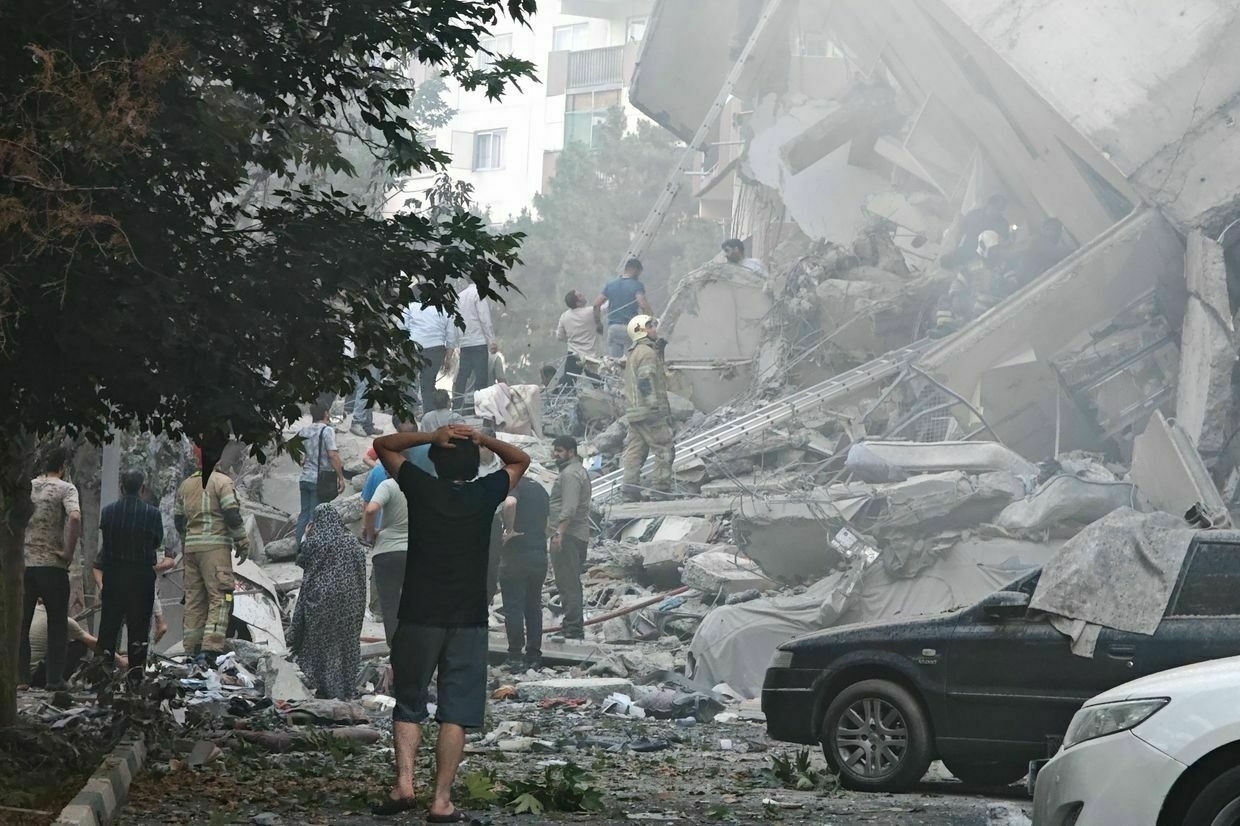
Israel launched a series of massive air strikes on Iran starting June 13, targeting nuclear facilities and senior military figures. The Israeli government claimed Tehran was nearing nuclear weapons capability.
Iran responded with missile strikes on Tel Aviv and other Israeli cities, which resulted in civilian casualties, including five Ukrainian citizens, on June 14.
Iranian officials claimed 224 people have been killed in Israeli attacks so far, most of them civilians. The figures have not been independently verified.
As tensions grow, Trump has floated the idea of Russian President Vladimir Putin serving as a mediator between Israel and Iran. Putin spoke with both Iranian President Masoud Pezeshkian and Israeli Prime Minister Benjamin Netanyahu on June 13, offering mediation and condemning Israeli strikes.
Israel has not publicly responded to Russia's proposal, but Kremlin spokesperson Dmitry Peskov said on June 17 that Tel Aviv appeared unwilling to accept Russian mediation.
French President Emmanuel Macron dismissed the suggestion entirely, saying on June 15 that Moscow, given its war in Ukraine and disregard for the UN Charter, "cannot be a mediator."
Tehran has become one of Russia's closest military partners during its war against Ukraine, supplying thousands of Shahed drones and ballistic missiles used in daily strikes on Ukrainian cities.
Israel, which has historically maintained careful relations with Russia and is home to a substantial Russian-speaking population, has not joined in Western sanctions against Moscow.
On June 13, Kyiv expressed its support for Israel, describing Iran as a "source of instability in the region and beyond," citing Tehran's extensive military cooperation with Russia.
Israel reluctant to accept Russia’s mediation in war with Iran, Kremlin says“At the moment, we see reluctance — at least on Israel’s part — to resort to mediation or pursue a peaceful resolution,” Kremlin spokesman Dmitry Peskov claimed.The Kyiv IndependentTim Zadorozhnyy
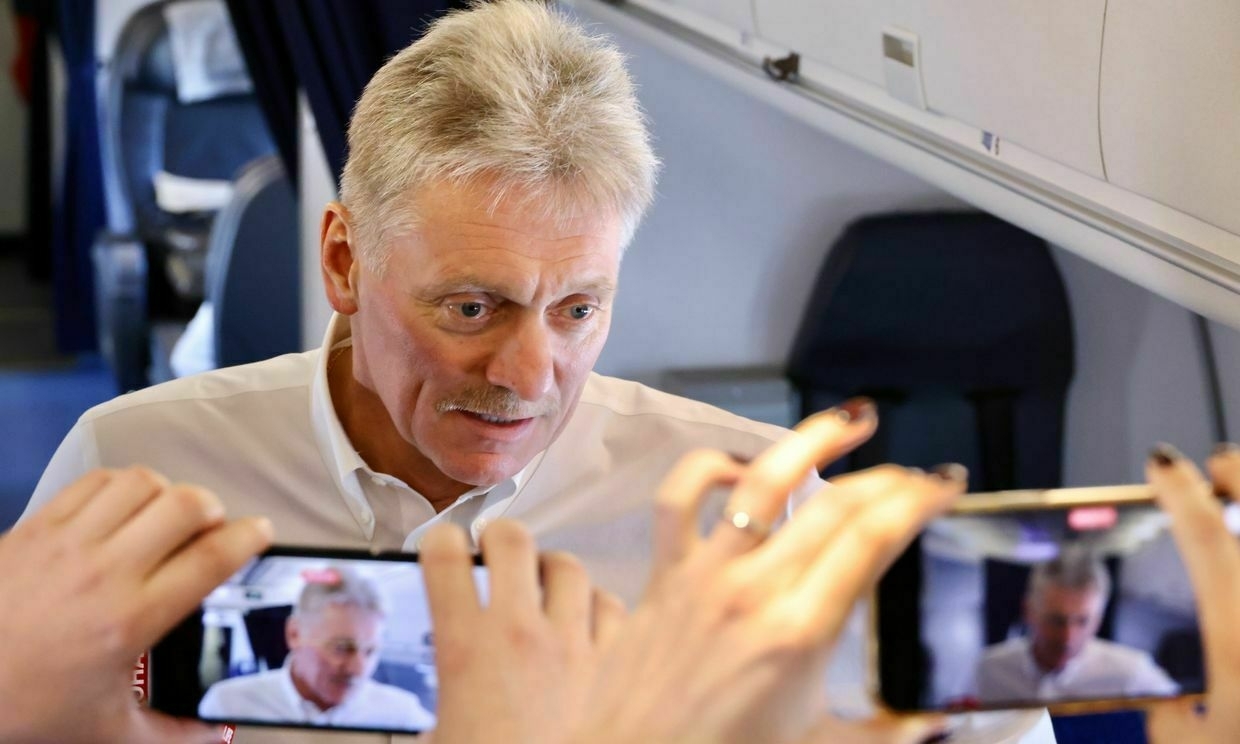
Russian chemical plant halts operations after Ukrainian drone strikeThe Nevinnomyssk Azot chemical plant — one of Russia's largest producers of nitrogen fertilizer and ammonia and a key supplier to the Kremlin's military-industrial complex — has suspended production, Russian independent media outlet Astra reported on June 16.
According to Astra, the chemical plant suspended production as a direct result of Ukrainian drone strikes. The strike — which was confirmed by Ukraine's General Staff on June 14 — targeted two major military-industrial facilities in Russia, including the Nevinnomyssk Azot plant in Stavropol Krai. The facility reportedly supplied raw materials and components for Russia's weapons and fuel production.
Nevinnomyssk Azot is among Russia's top producers of ammonia and nitrogen fertilizers and hosts the country's only production lines for methyl acetate and high-purity acetic acid. It also operates Russia's first melamine production facility, according to open-source data.
According to Andrii Kovalenko, head of Ukraine's Center for Countering Disinformation at the National Security and Defense Council, the plant produces up to one million tons of ammonia and over one million tons of ammonium nitrate annually, and is "a critical element of Russia's military-industrial complex."
Kovalenko noted that ammonium nitrate is a key component for explosives and artillery shells. He added that the plant also synthesizes dual-use chemicals such as melamine, acetic acid, methanol, and potassium nitrate — all frequently used in the production of grenade launchers, mines, and rocket charges.
Since 2024, the plant has also been producing water-soluble fertilizers, which he said have been adapted to serve military chemical needs as part of Russia's war in Ukraine.
The chemical plant is part of the EuroChem Group, owned by Russian billionaire Andrey Melnichenko, who is currently sanctioned by Canada, the European Union, Japan, and the United Kingdom.
Note from the author:
Ukraine War Latest is put together by the Kyiv Independent news desk team, who keep you informed 24 hours a day, seven days a week. If you value our work and want to ensure we have the resources to continue, join the Kyiv Independent community.
-
US reportedly considers strikes on Iran as Trump demands 'unconditional surrender'
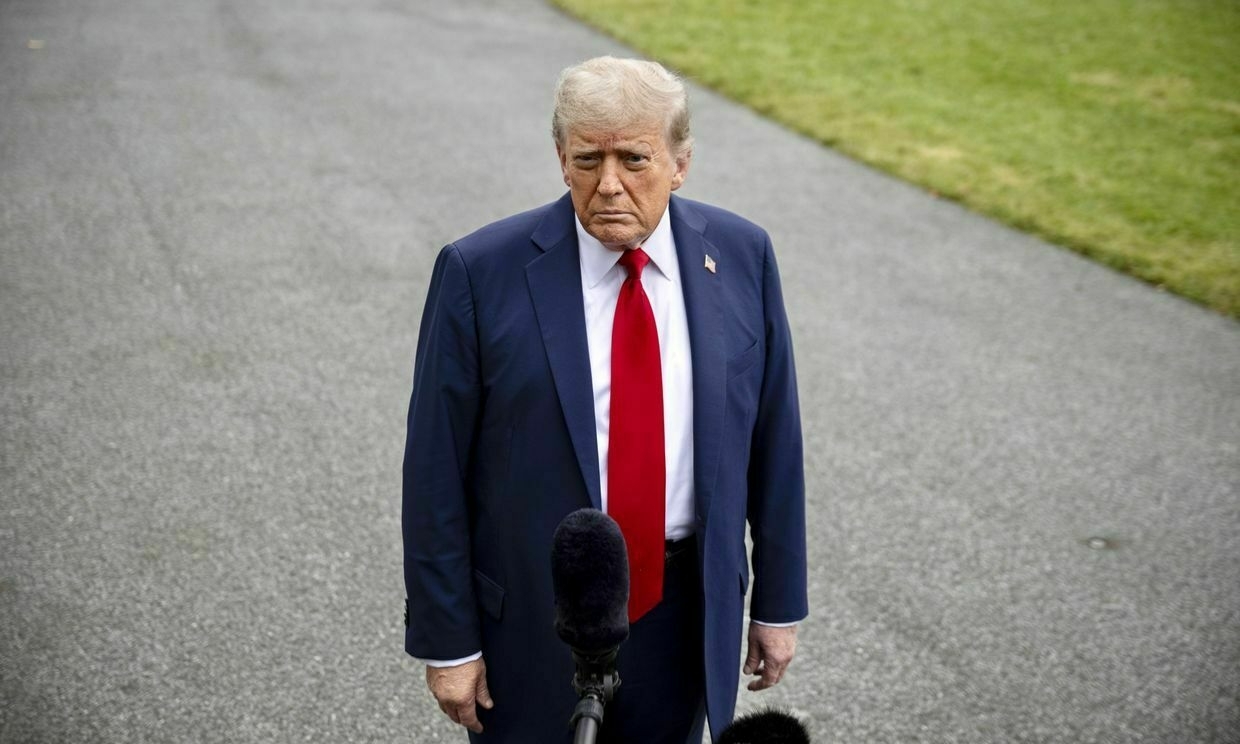
U.S. President Donald Trump is weighing direct military action against Iran, including potential strikes on its nuclear facilities, Axios reported on June 17, citing unnamed U.S. officials.
Trump demanded Iran’s “unconditional surrender” on Truth Social on June 17 and threatened Supreme Leader Ayatollah Ali Khamenei, boasting about U.S. air superiority.
Trump is expected to meet with his national security team later in the day to determine the scope of U.S. involvement in the escalating conflict between Israel and Iran, according to Axios.
The meeting comes after his early departure from the G7 Leaders' Summit on June 16, where he had been scheduled to meet with President Volodymyr Zelensky the following day.
“We now have complete and total control of the skies over Iran,” Trump wrote on Truth Social.
He added that “we know exactly where the so-called ‘Supreme Leader’ is hiding."
“He is an easy target, but is safe there - We are not going to take him out (kill!), at least not for now,” Trump continued. “But we don’t want missiles shot at civilians, or American soldiers. Our patience is wearing thin."
German Chancellor Friedrich Merz said on June 17 that U.S. involvement in Israel’s military campaign is under serious consideration, and a decision could be “made in the near future,” Politico reported.
Merz said the decision depends on whether the Iranian regime “is prepared to return” to the negotiating table.
Israel launched a series of massive air strikes on Iran starting June 13, targeting nuclear facilities and senior military figures. The Israeli government claimed Tehran was nearing nuclear weapons capability.
Iran responded with missile strikes on Tel Aviv and other Israeli cities, which resulted in civilian casualties, including five Ukrainian citizens on June 14.
Iranian officials claimed 224 people have been killed in Israeli attacks so far, most of them civilians. The figures have not been independently verified.
As tensions grow, Trump has floated the idea of Russian President Vladimir Putin serving as a mediator between Israel and Iran. Putin spoke with both Iranian President Masoud Pezeshkian and Israeli Prime Minister Benjamin Netanyahu on June 13, offering mediation and condemning Israeli strikes.
Israel has not publicly responded to Russia's proposal, but Kremlin spokesperson Dmitry Peskov said on June 17 that Tel Aviv appeared unwilling to accept Russian mediation.
French President Emmanuel Macron dismissed the suggestion entirely, saying on June 15 that Moscow, given its war in Ukraine and disregard for the UN Charter, "cannot be a mediator."
Tehran has become one of Russia's closest military partners during its war against Ukraine, supplying thousands of Shahed drones and ballistic missiles used in daily strikes on Ukrainian cities.
Israel, which has historically maintained careful relations with Russia and is home to a substantial Russian-speaking population, has not joined in Western sanctions against Moscow.
On June 13, Kyiv expressed its support for Israel, describing Iran as a "source of instability in the region and beyond," citing Tehran's extensive military cooperation with Russia.
Zelensky arrives at G7 summit hours after Trump departsZelensky was expected to meet U.S. President Donald Trump at the summit. However, it is not clear if the meeting will take place because Trump left the summit early due to escalating tensions in the Middle East.The Kyiv IndependentDmytro Basmat
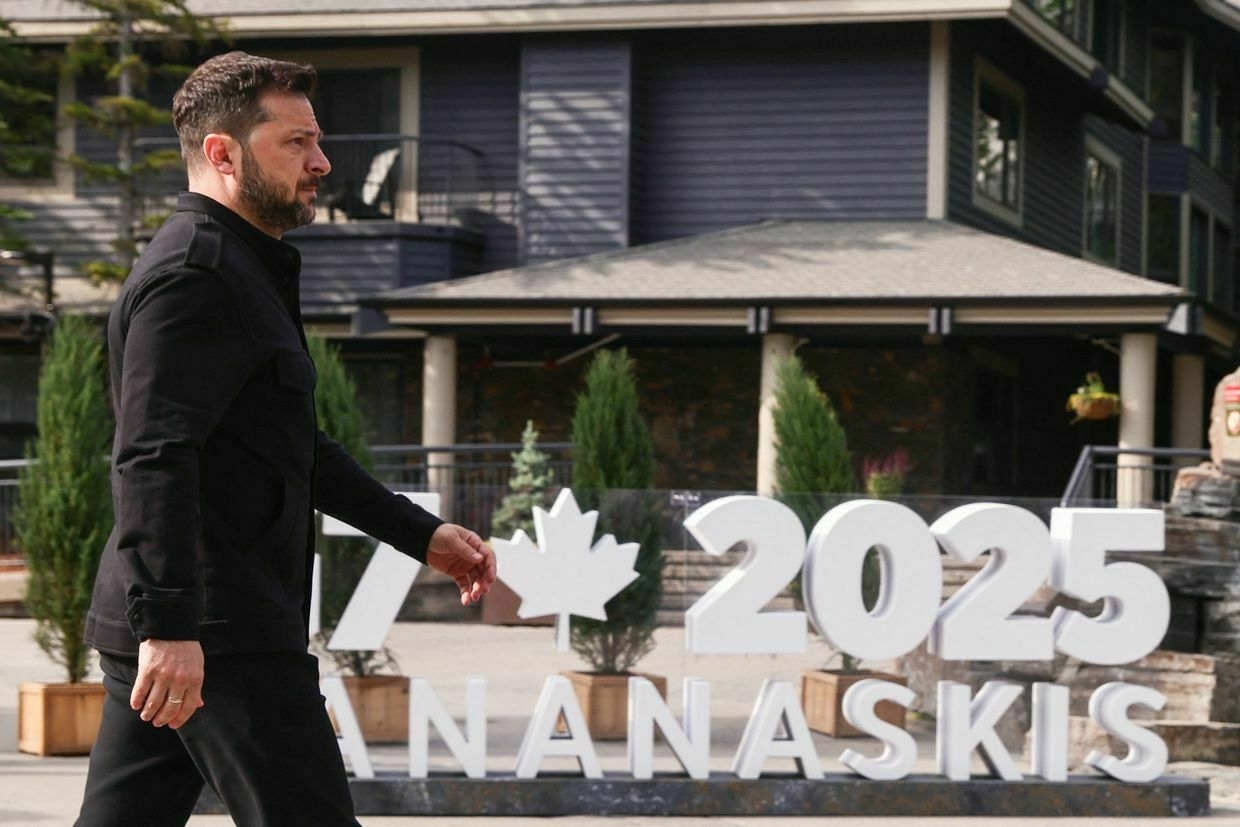
-
‘He said he wasn’t going anywhere’ — Russian strikes kill 14 in Kyiv as survivors search for missing
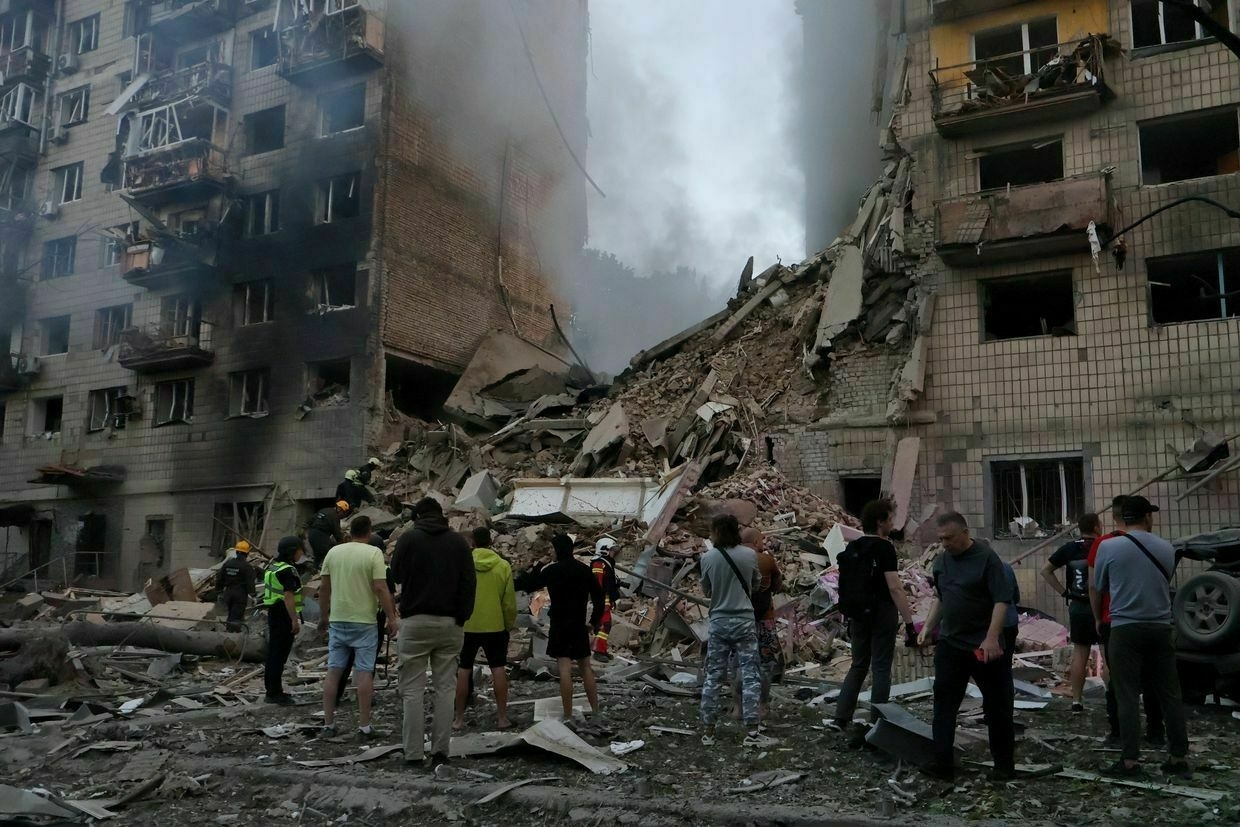
Sitting a few meters from the rubble of what used to be a nondescript nine-story residential building in Kyiv, Lilia rises to her feet every time another pile of debris is cleared from the site targeted by Russia during a mass overnight attack on June 17.
“We are waiting (as everyone) for the same thing,” says Victoria Smirnova, 37, Lilia’s mother-in-law, seated nearby. “The father was there."
The man’s third-floor apartment and the entire section of the building in the capital’s Solomianskyi district had completely collapsed.
“She (Lilia) ran to him after the first wave of drone attacks,” Smirnova told the Kyiv Independent. “He was cleaning up broken glass. The windows in the kitchen and on the balcony were shattered. He told her, ‘I’ll be home, there’s so much to do. I’ll stay in the corridor. I’m not going anywhere.'"
Minutes after Lilia left, a Russian cruise missile struck the building.The two women are among many waiting near the site, desperate for news about family members and acquaintances still missing in the aftermath of the overnight strike, the deadliest attack on Kyiv since the start of the year.
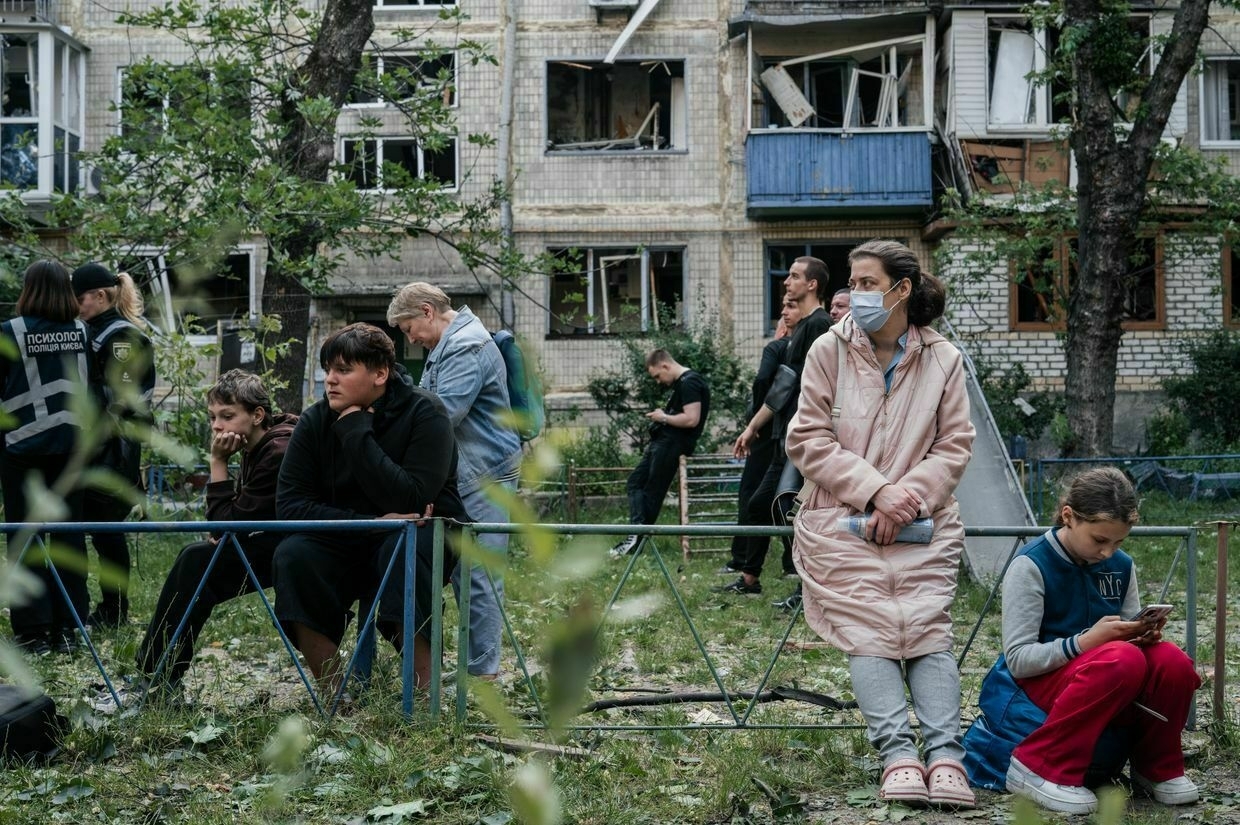
Residents evacuate a damaged apartment building after a Russian drone and missile attack in Kyiv, Ukraine, on June 17, 2025. (Vlada Liberova / Libkos / Getty Images) 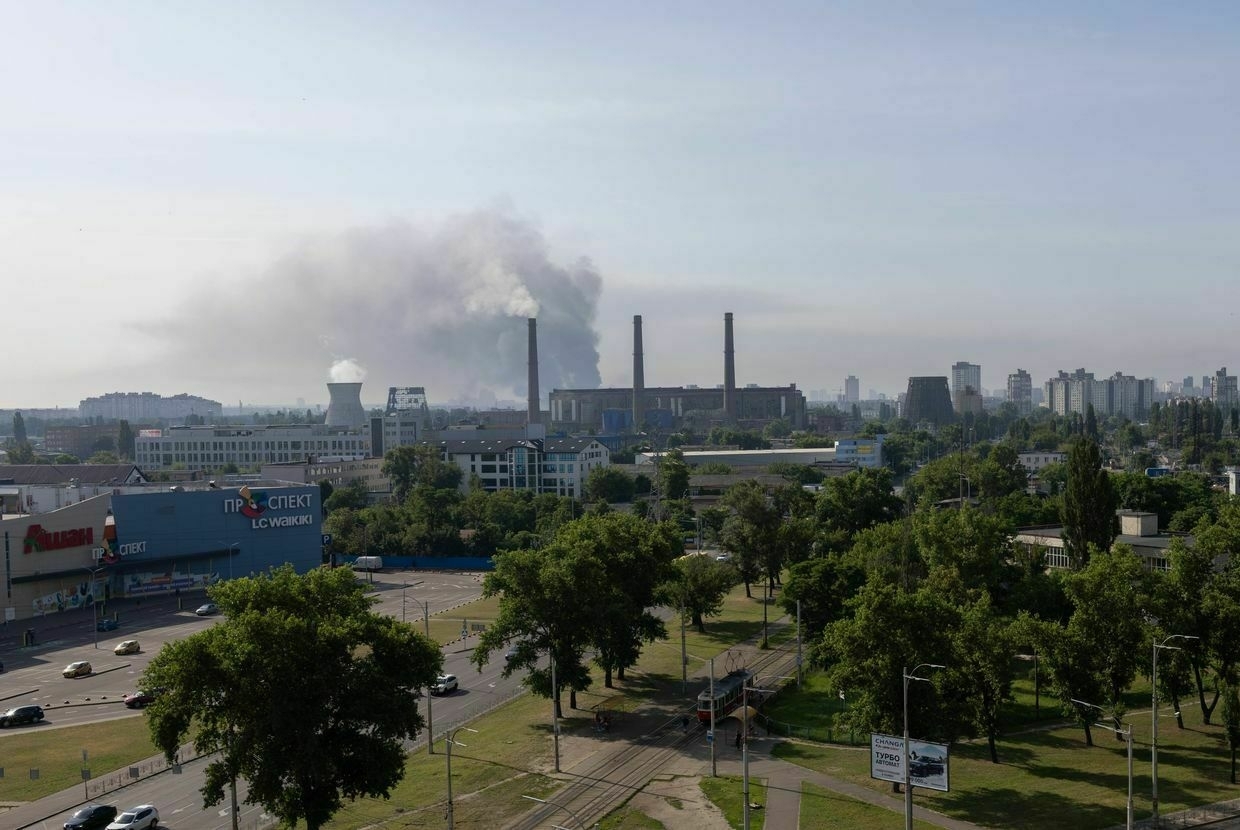
Smoke rises over Kyiv, Ukraine, after a combined Russian drone and missile attack on June 17, 2025. (Anna Donets / The Kyiv Independent) At least 14 people were killed in the capital, and 117 others were injured, according to officials. Two more people were killed in a Russian overnight attack on the southern city of Odesa.
Ukraine’s Air Force said Russia launched 472 aerial weapons overnight, including nearly 280 Shahed-type drones and 32 missiles. The strikes were primarily aimed at Kyiv.
Air defense forces intercepted 428 of those targets, including 239 Shahed drones, one Kinzhal ballistic missile, and 23 cruise missiles.
Mayor Vitali Klitschko also reported that Russian forces used cluster munitions during the attack.
Witnesses said the attack came in several waves — first drones, then missiles, then drones again. After the initial barrage, a lull in the strikes prompted some residents to leave their shelters.
Among them were Halyna Kushnirova, 72, and her son. They had just stepped outside when fresh explosions rocked the district. This time, they took cover in an underground passageway near their home.
"I'm in shock. I still can't fully grasp that this actually happened. I mean, I see it, but I can't process it.”
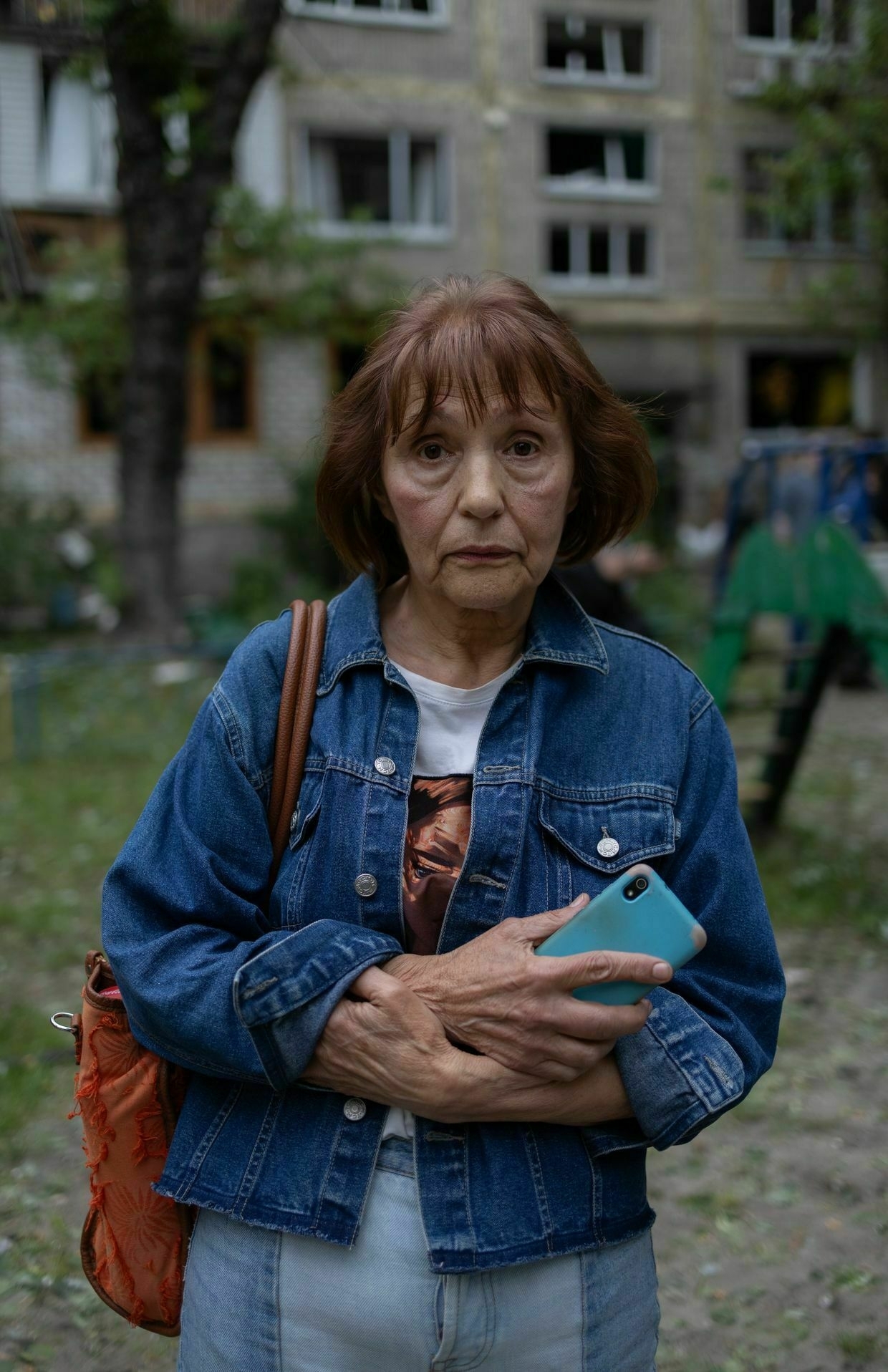
Halyna Kushnirova, 72, a retiree who lives in the house struck by a Russian missile, stands outside the damaged building in Kyiv, Ukraine, on June 17, 2025. (Anna Donets / The Kyiv Independent)
"Then there was this terrible whistling. It was horrible. Three missiles — with such a noise that my ears were ringing," Kushnirova said. "The explosion was so strong that dust, smoke, and sparks filled the passageway."
"I said immediately: it's our building (that was hit)."
She said her apartment, located in a neighboring section of the building, was heavily damaged.
The attack left a trail of destruction across Kyiv, damaging multiple residential buildings in several districts, along with critical infrastructure, a kindergarten, a student dormitory, and cars.
Russia launched its latest strike as the G7 summit was underway in Canada. On the day of the attack, President Volodymyr Zelensky was expected to meet with his U.S. counterpart, Donald Trump. However, the American president left the summit a day before the meeting.
Trump has declined to comment on the attack and refrained from criticizing the Russian regime.
"I'm in shock. I still can't fully grasp that this actually happened. I mean, I see it, but I can't process it," Kushnirova said. "I wish Trump were here next to me to see what his buddy (Russian President Vladimir) Putin is doing."
‘A brutal strike’ — Massive Russian missile and drone attack hits Kyiv, killing 10, injuring at least 124Russian drones and ballistic missiles targeted the capital overnight, killing 15 people and injuring at least 114, local authorities reported. Damage to civilian infrastructure has also been reported throughout the city.The Kyiv IndependentOlena Goncharova
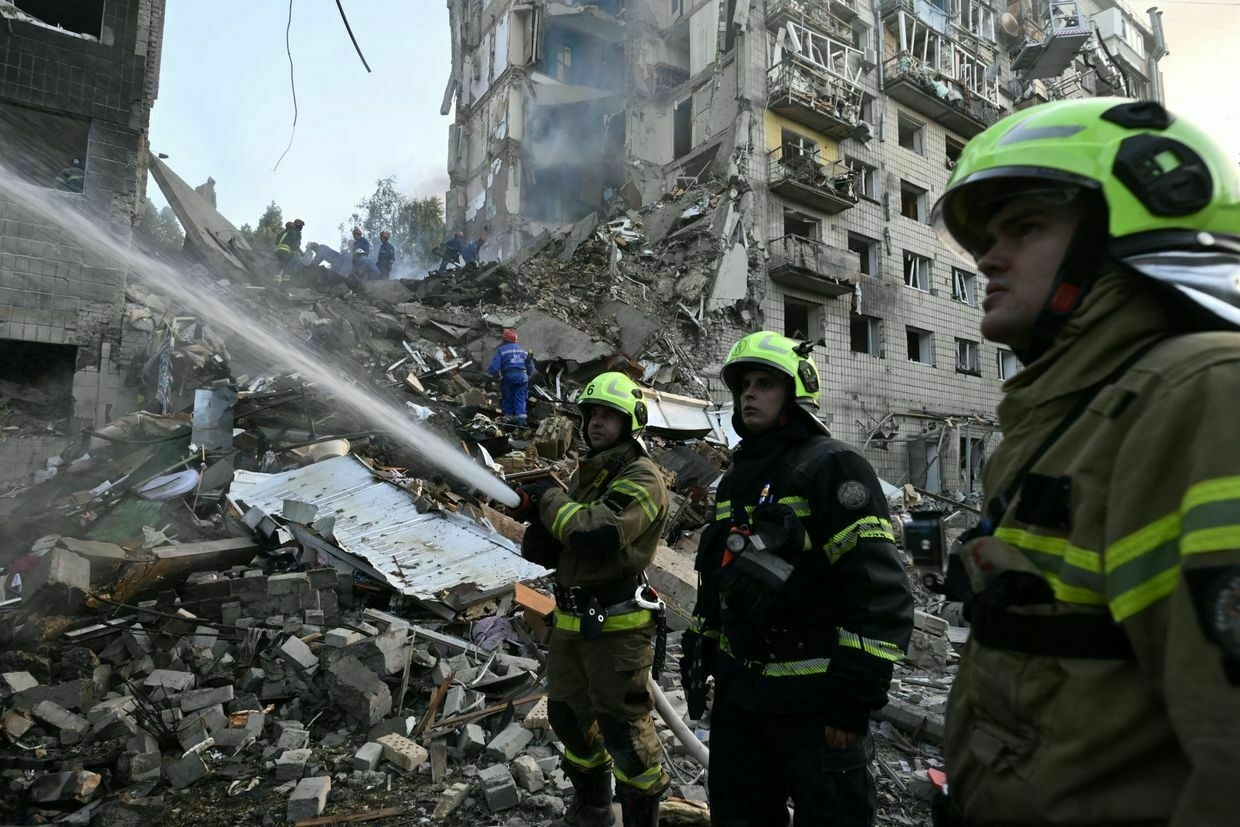
Escaping the worstOn the opposite side of the city, residents of Kyiv's left bank Darnytskyi district were also wrestling with the aftermath of the Russian attack.
Around 5 a.m., a Russian drone slammed into one of the high-rise apartment buildings. The strike left several people wounded, destroying an outer wall and rooms in several apartments and shattering windows throughout the neighborhood.
"My children were already in the bathroom. (My wife and I) were in the corridor. We heard the Shahed's descent, then the hit," said Ivan Serebrianskyi, 42, an entrepreneur who lives in the damaged building.
"The windows were shattered, and smoke covered the place. We went outside and checked that everyone in the family was alive and well. It's the main thing," he told the Kyiv Independent outside his entrance as the residents cleared up the driveway.
Serebrianskyi added that after the overnight attack, he wants his four and 13-year-old daughters to move abroad "within a few days."
"The worst part is that we can't plan at all for when it might end," Serebrianskyi said.
"Perhaps there will be a world leader other than our president who will be able to take a serious stance with this crazy neighbor of ours."
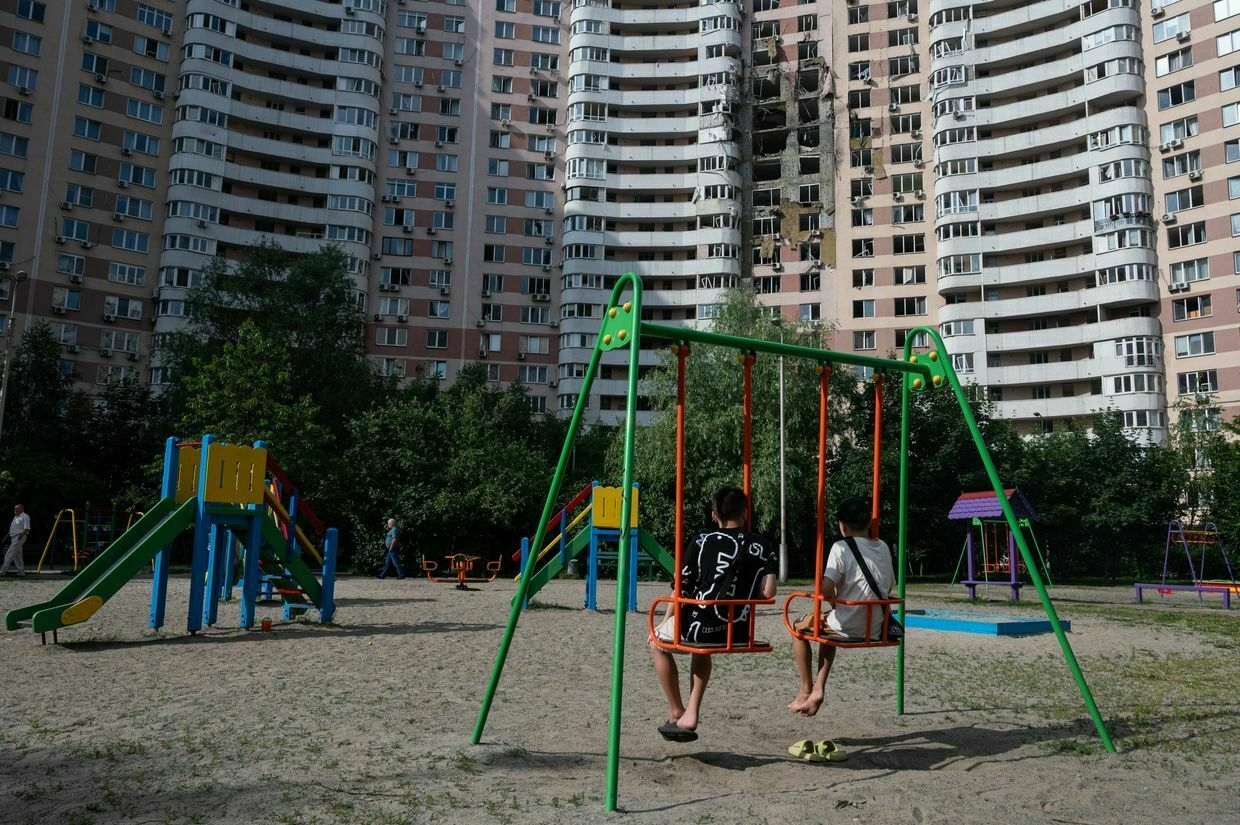
Children play near a residential building damaged by a Russian attack in Kyiv, Ukraine, on June 17, 2025. (Danylo Antoniuk / Anadolu via Getty Images) 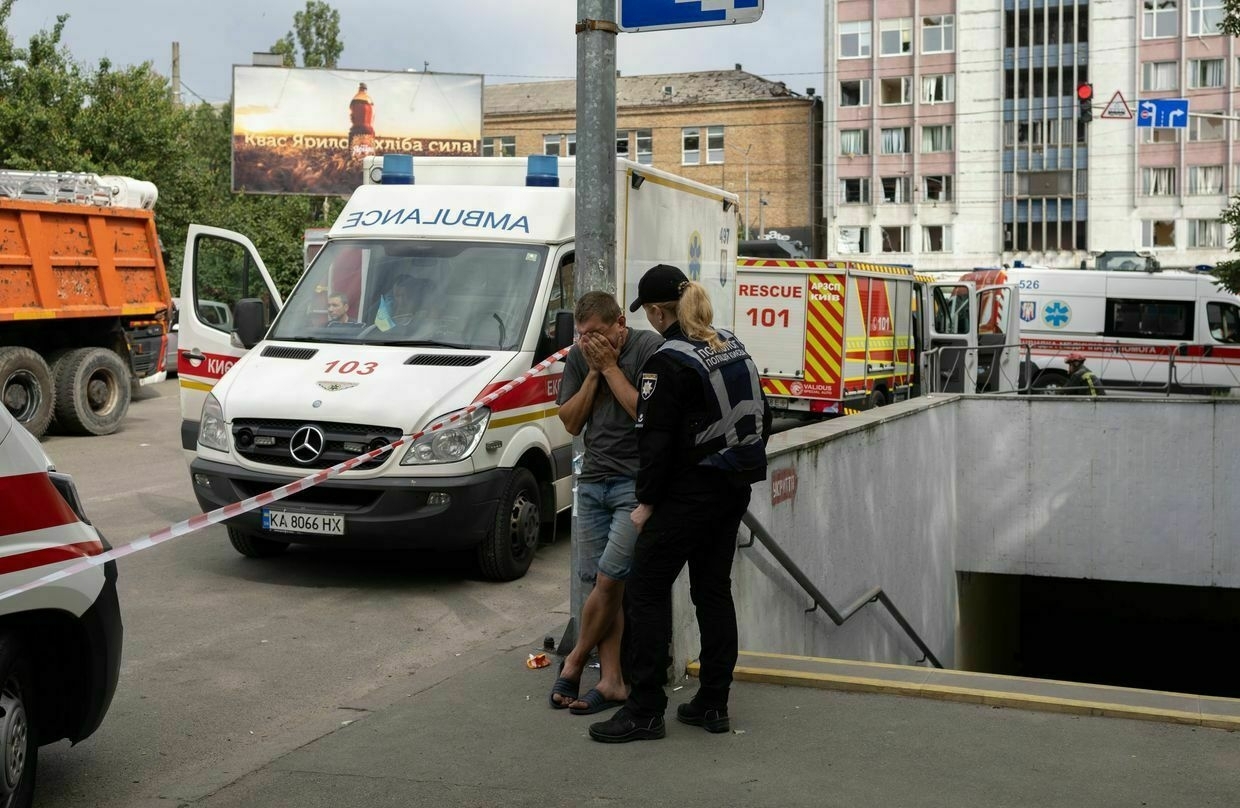
A man cries near the house that was struck by a Russian missile in Kyiv, Ukraine, on June 17, 2025. (Anna Donets / The Kyiv Independent) Serebrianskyi added that he was amazed at Trump's meek position in the peace talks with Russia.
"I run a small business myself, but I can say 100% that not everything in business can be solved by negotiation. Sometimes you need radical changes," he said.
Having escaped the worst, some residents of the Darnytskyi district started clearing up the debris almost immediately after the impact.
"Literally half an hour (after the attack), we started clearing up our entrance. Shattered common doors, window frames, glass," said Tatiana Bratus, 50, a building resident whose car was damaged in the attack.
In the late afternoon, Bratus and other residents who worked to clear the aftermath of the strike were joined by unlikely volunteers.
Around a dozen kids from nearby houses were sweeping up glass and litter off the sidewalk in front of the building, having procured brooms and scoops from the neighbors.
When asked by the Kyiv Independent's reporters why the children were cleaning up, one of the boys in the group responded: "Because it must be done."
Natalia, 28, a resident of a nearby building who declined to share her last name, said that she came to help with her friend's children, aged 10 and 12. The children volunteered to help after they read in the local volunteer group about the need for helpers at the location.
"The rest were just a group of kids playing around," Natalia said. "They approached us and said they wanted to help. We were not banned from it, so it seems safe here."
"No one forced them," Natalia added. "The nation is growing up strong. They are not going to look past the troubles of others."
‘Beyond cynical’ – Russian doctor carved ‘Glory to Russia’ scar on POW during operation, Ukraine saysAfter more than three years of Russia’s full-scale invasion, each new revelation of cruel treatment of Ukrainians in Russian captivity hardly surprises anyone. But when a photo recently emerged online, showing a “Glory to Russia” scar on the body of a Ukrainian prisoner of war (POW), it sent shockwavesThe Kyiv IndependentDaria Shulzhenko



